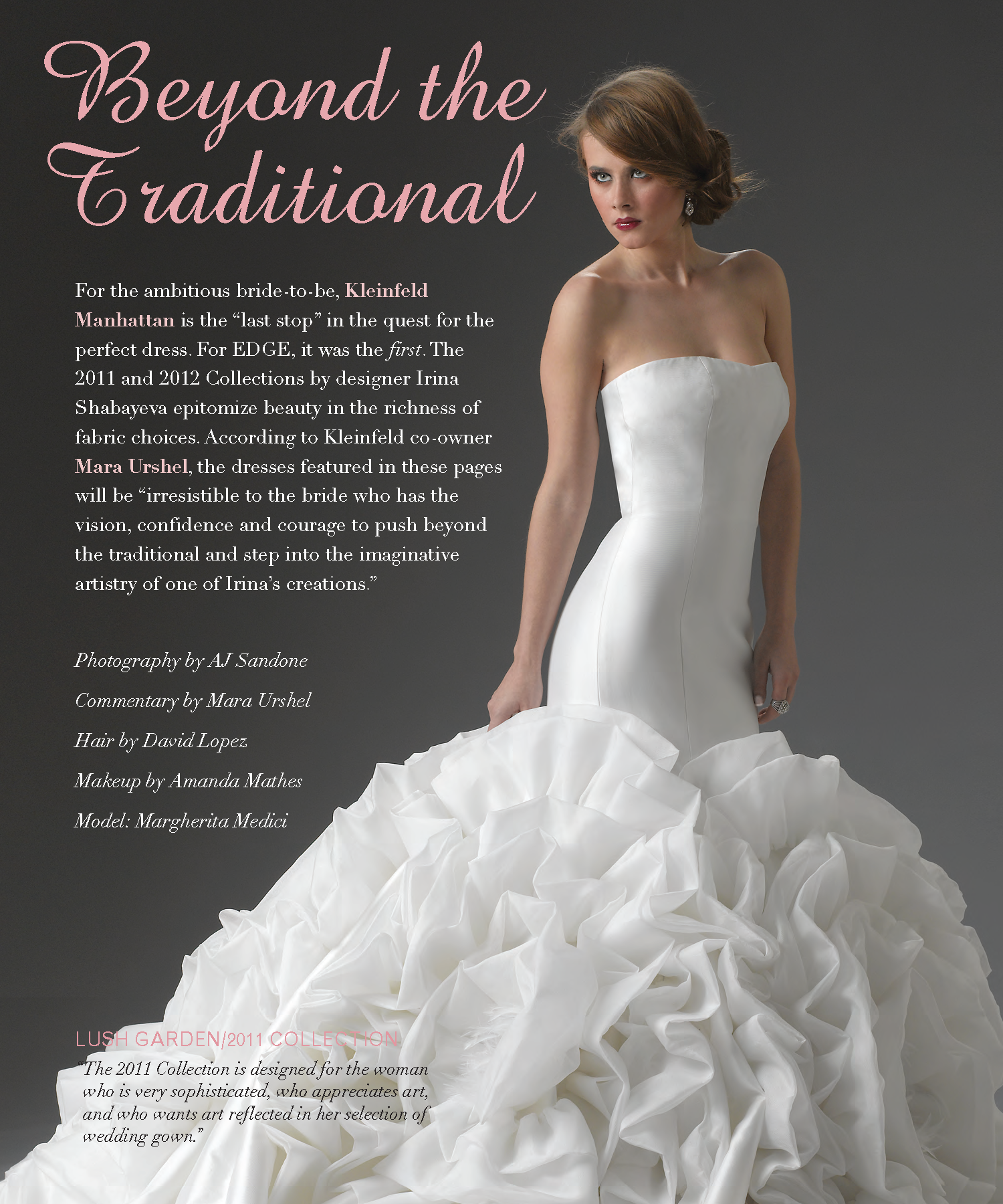
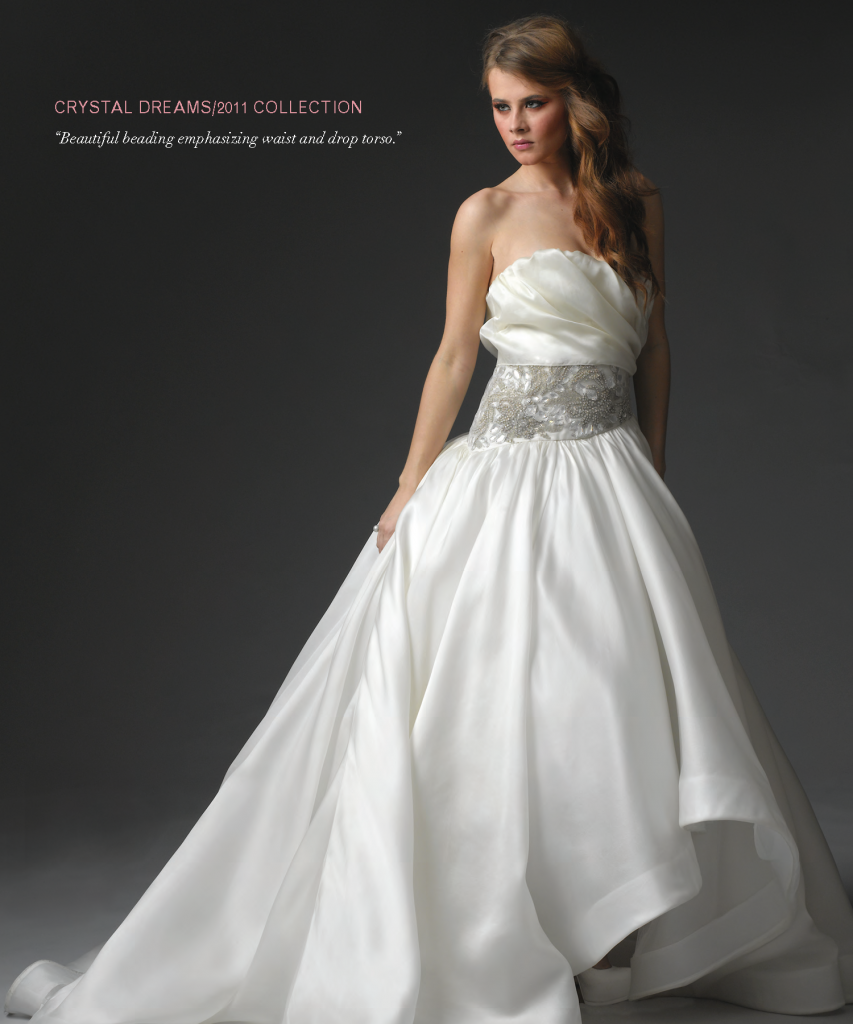
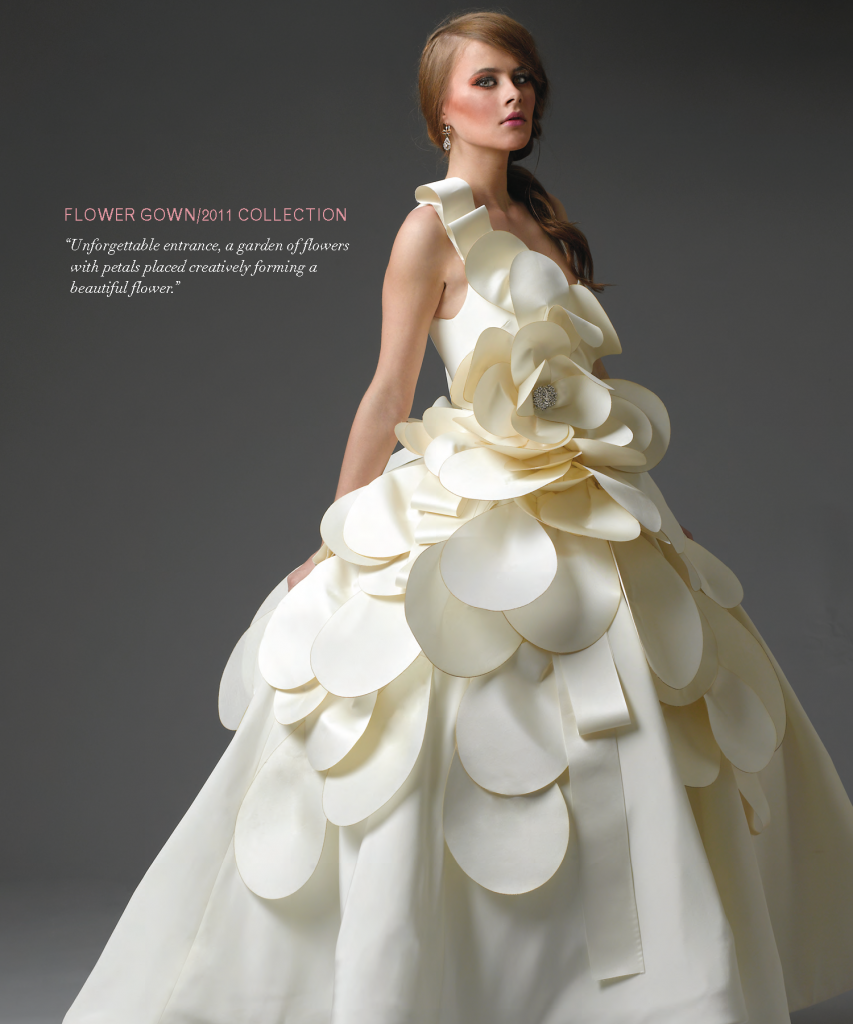
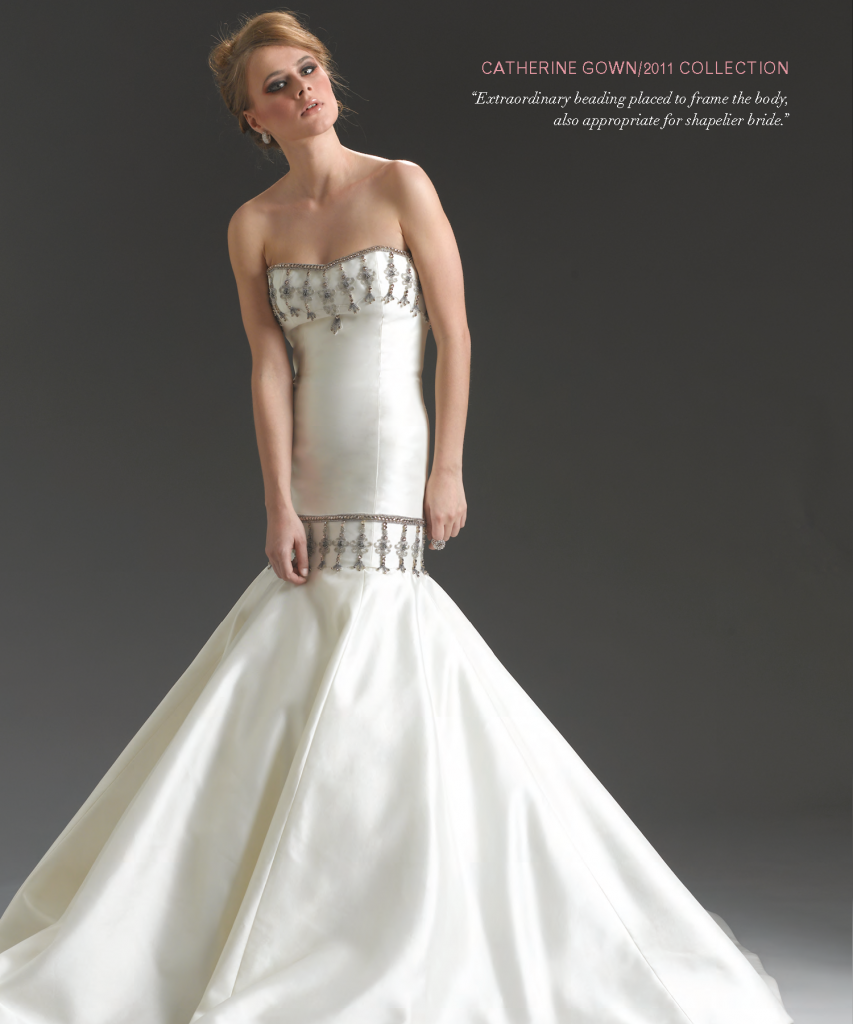
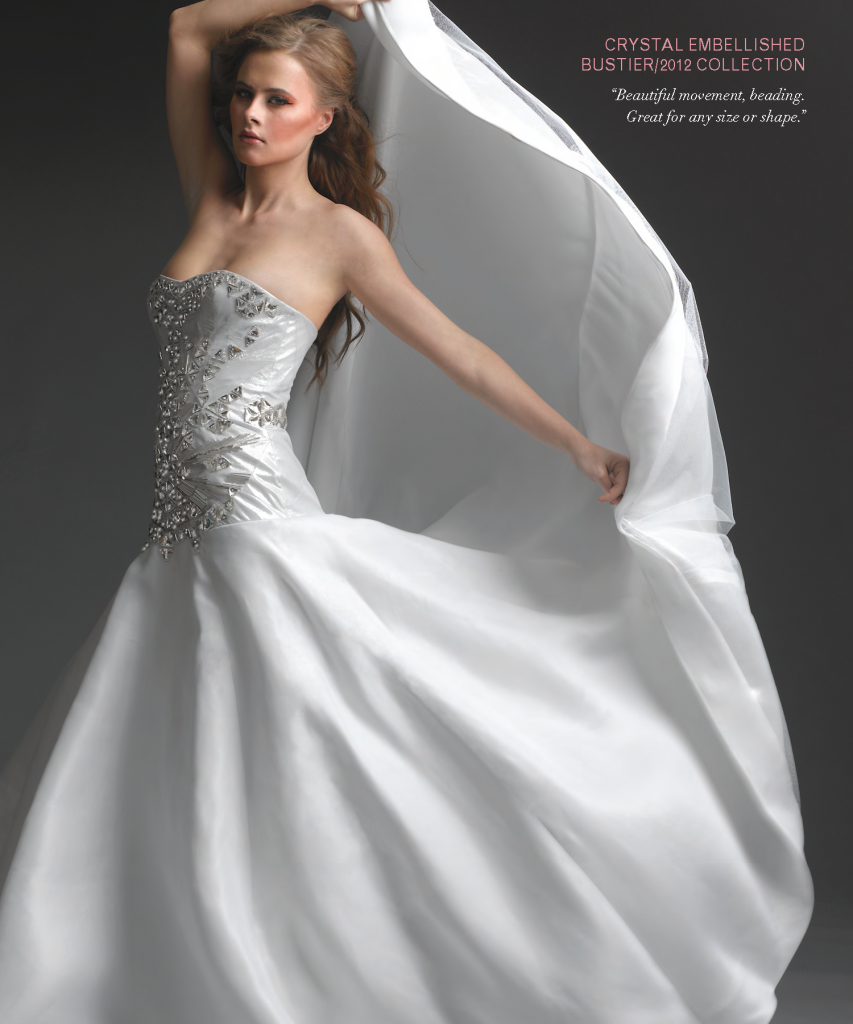
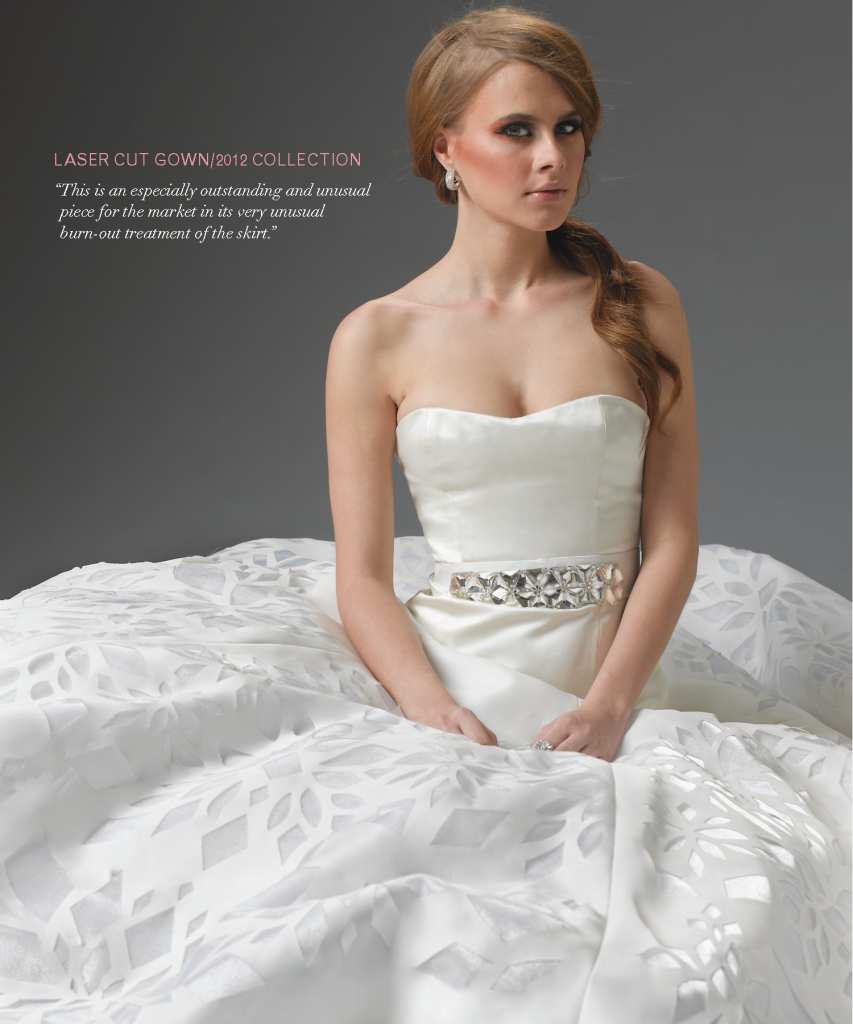
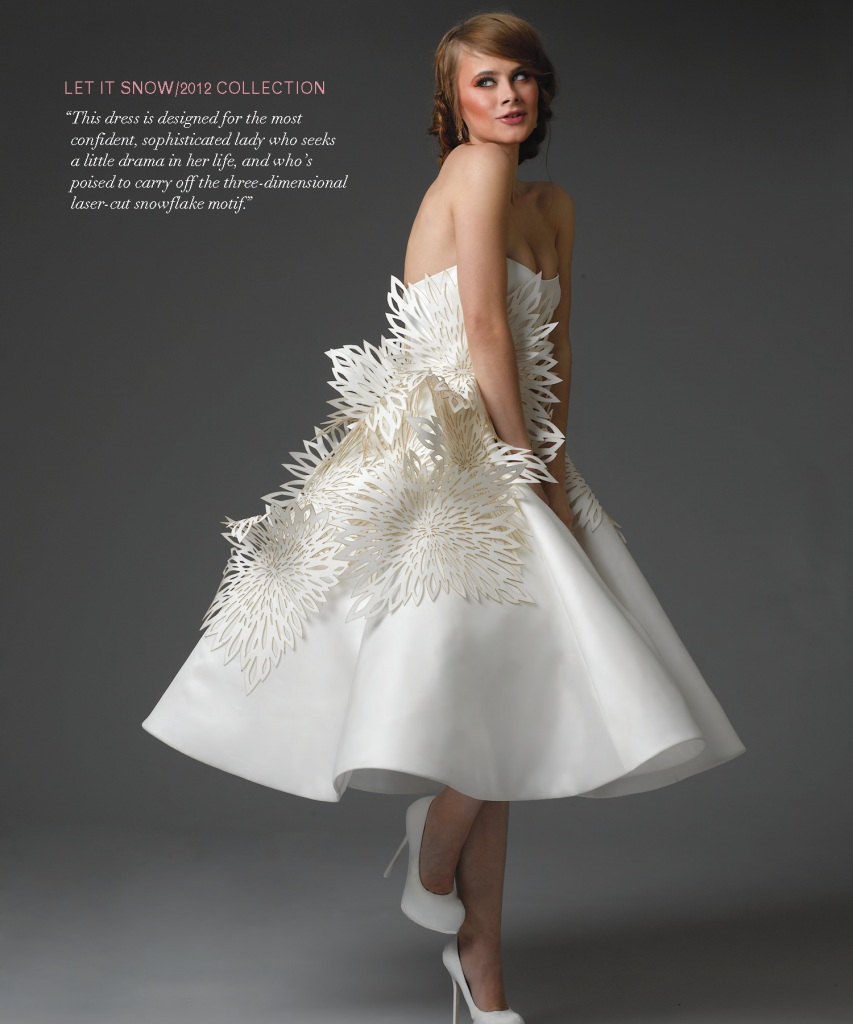
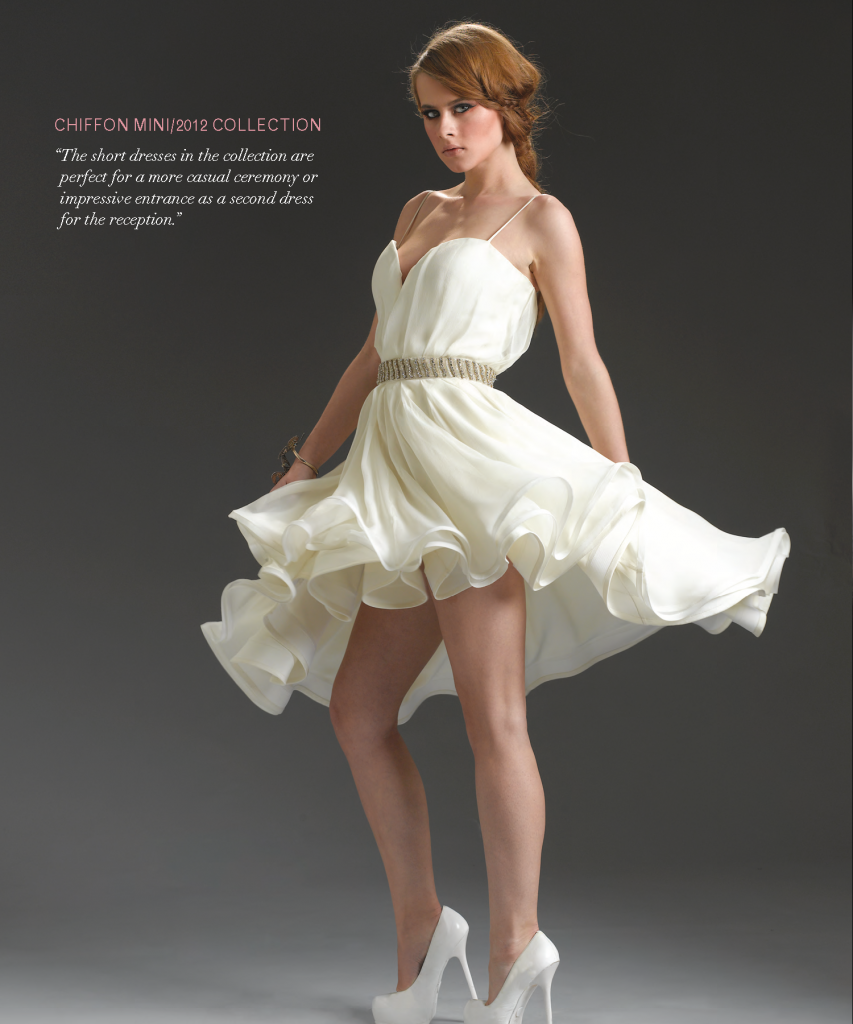








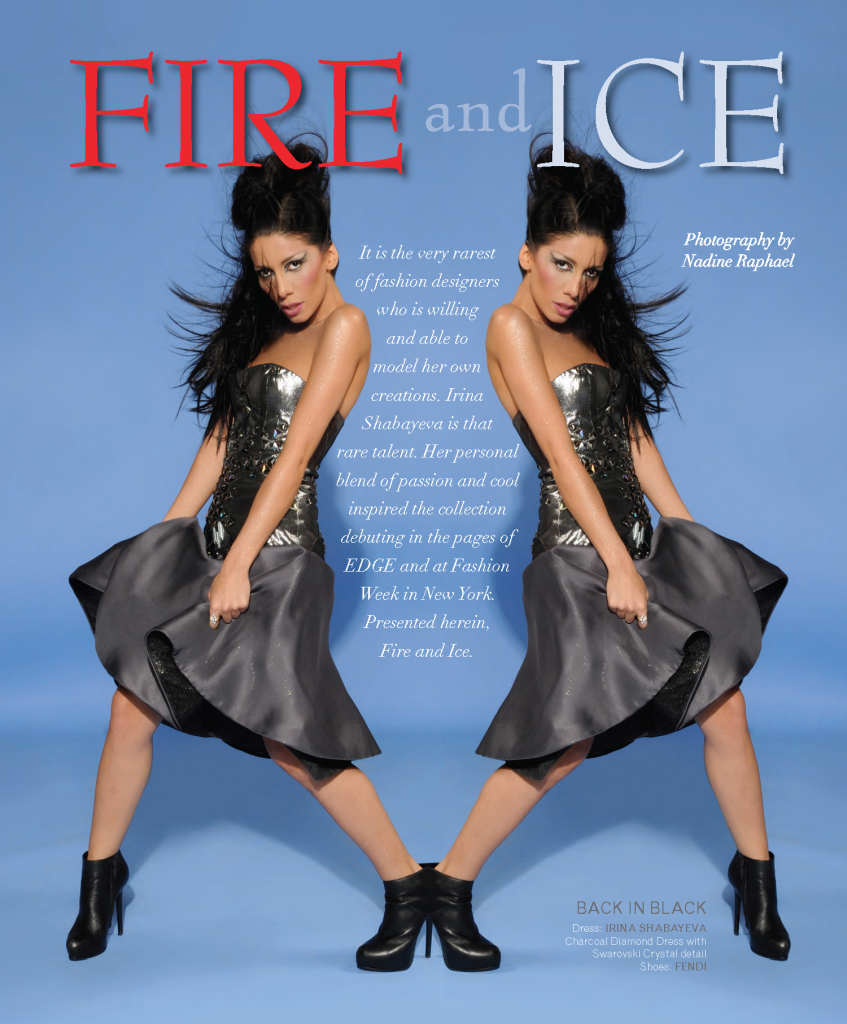
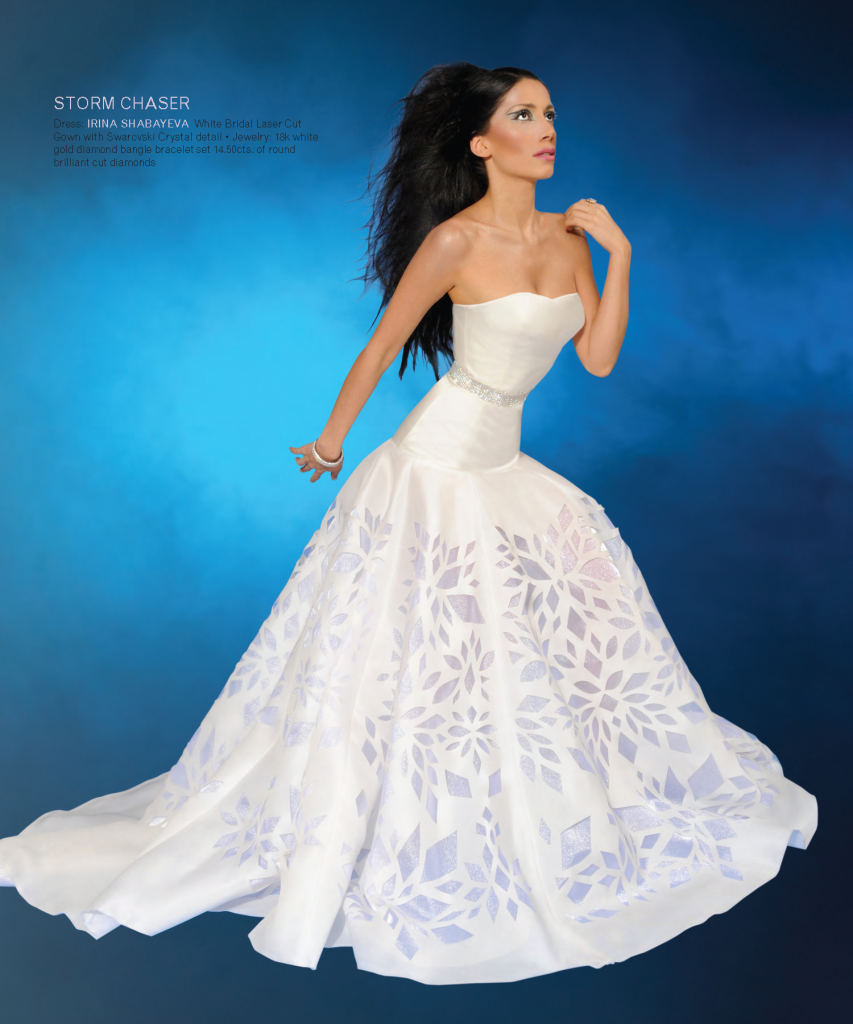
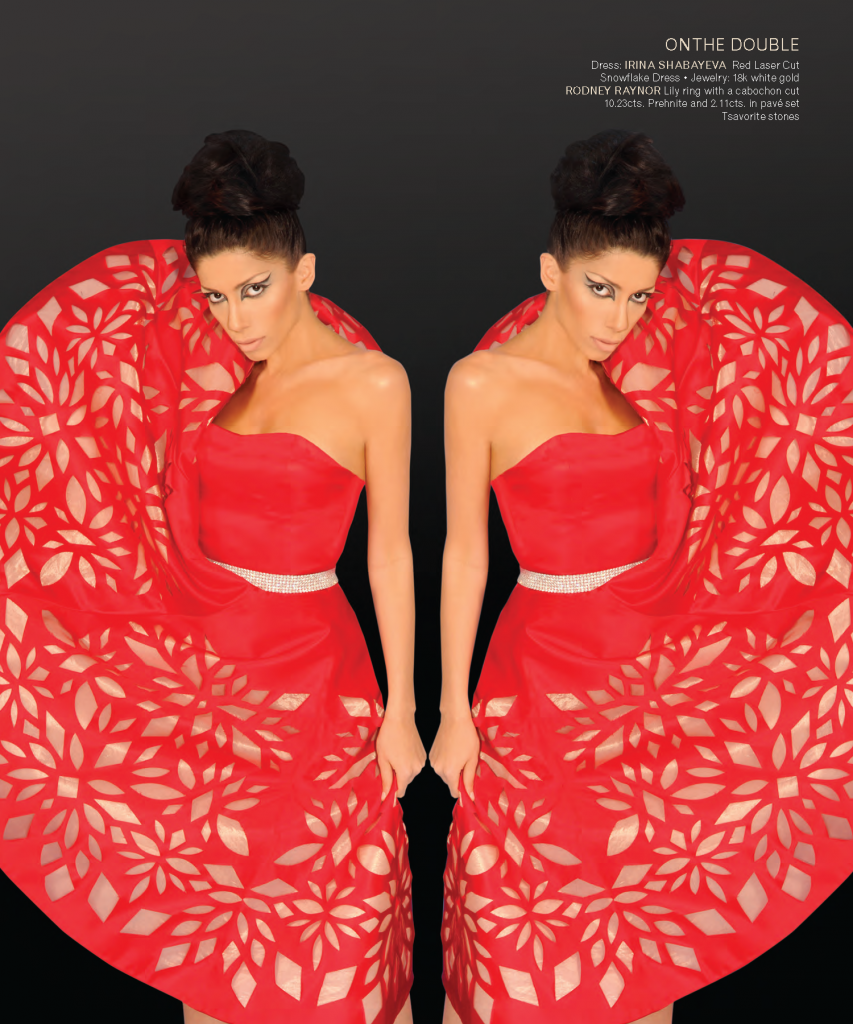
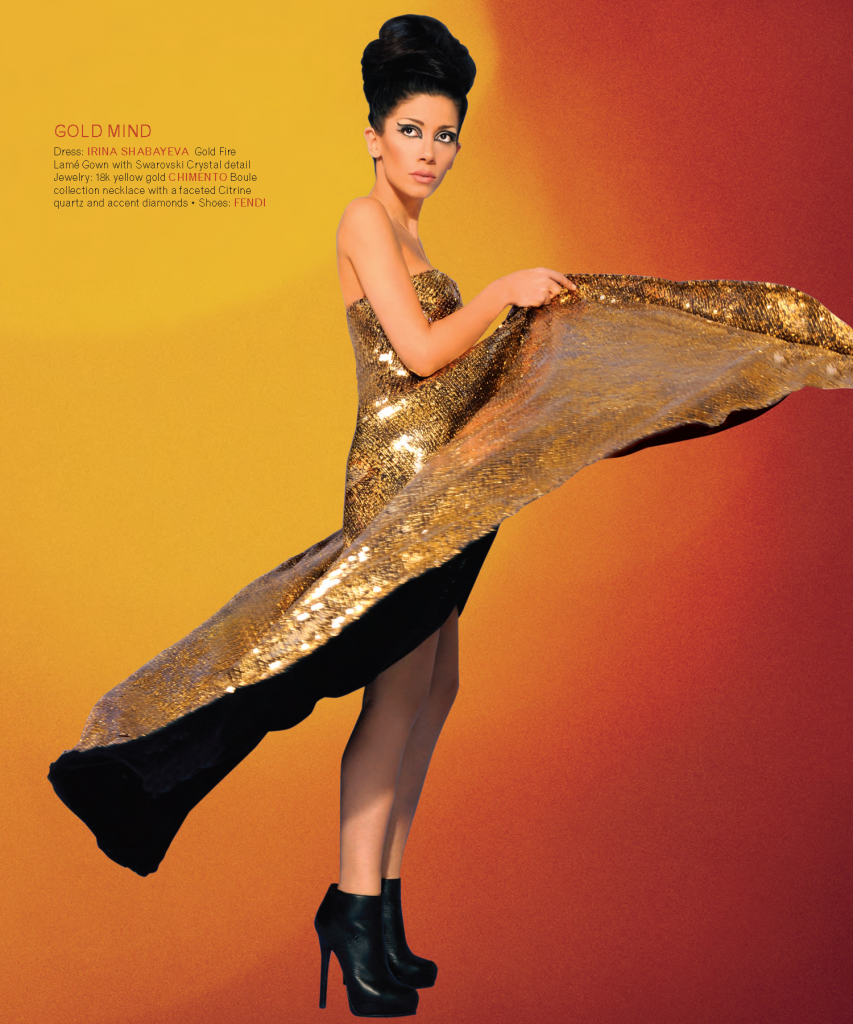
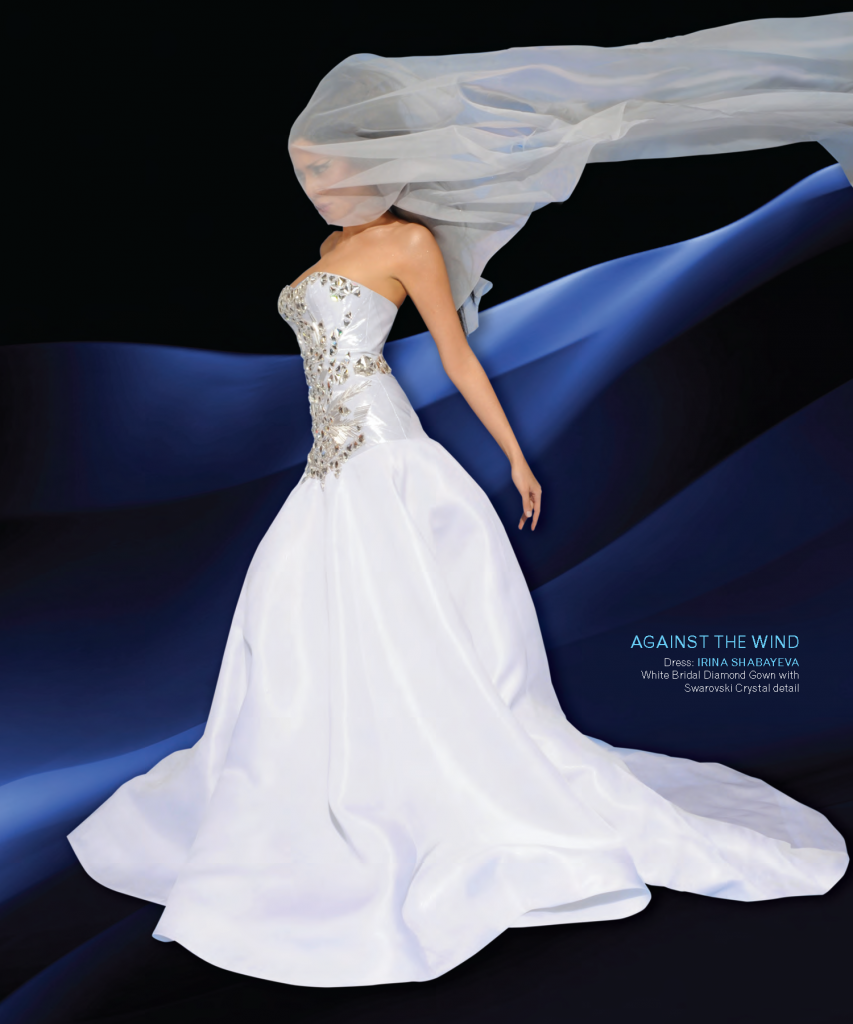
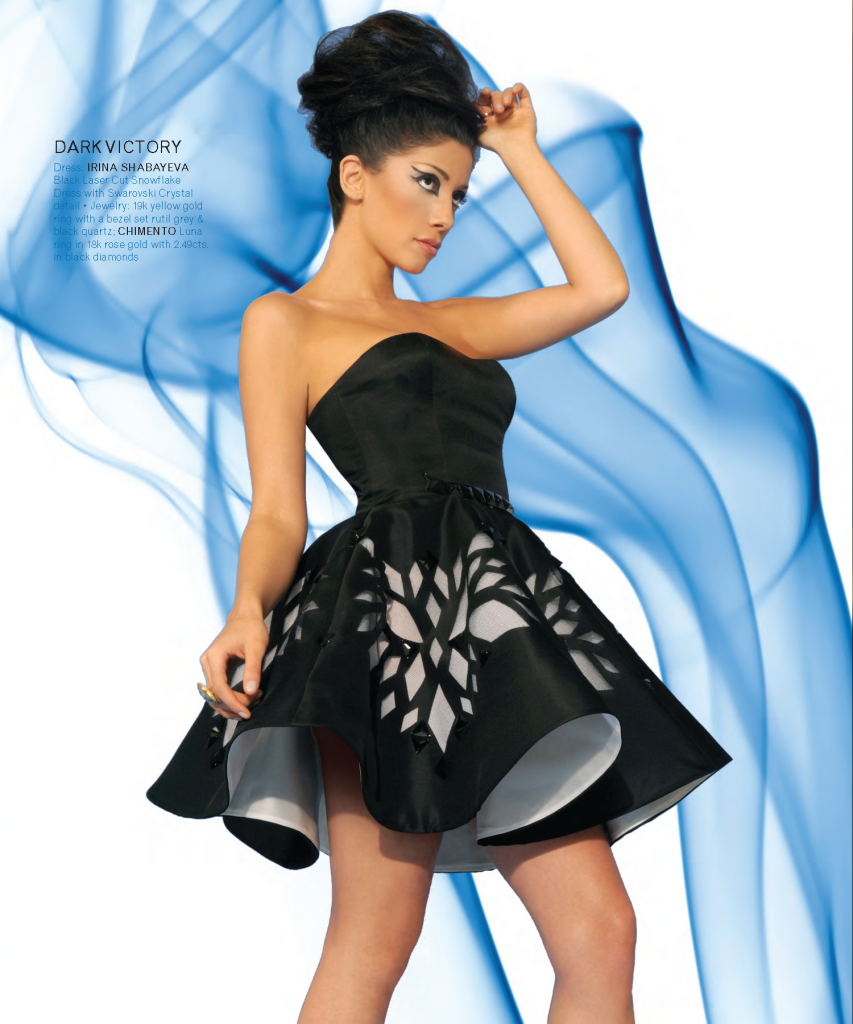
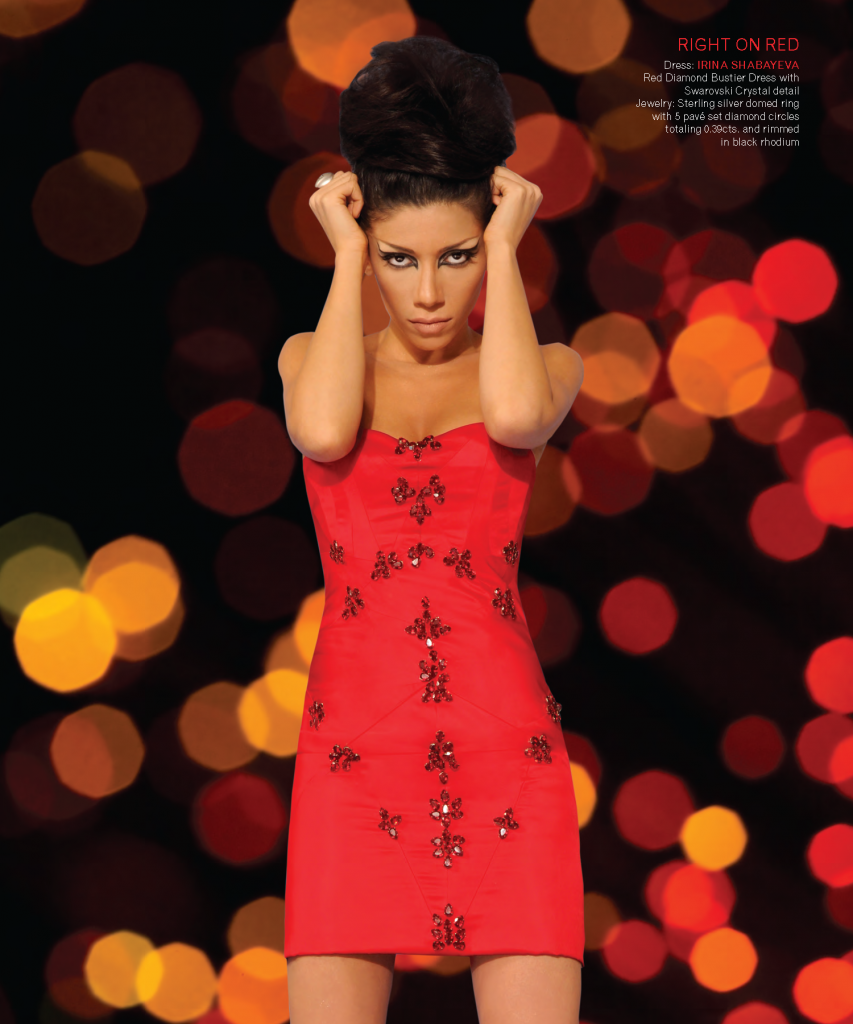
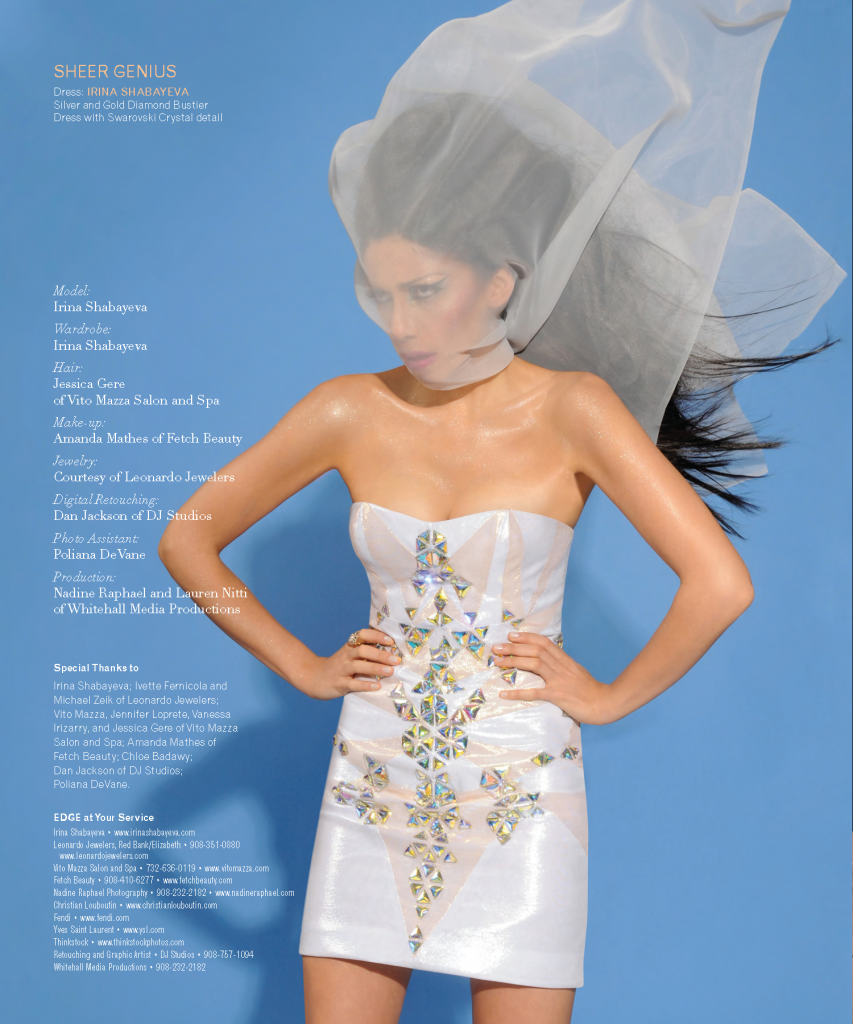
In the television and publishing industries, you often hear the expression, “It’s a numbers game.” Perhaps that explains how DANICA McKELLAR found success in both. As Winnie Cooper on The Wonder Years, she captured the hearts and minds of a generation of viewers, and had one of the most-recognized faces in America. More recently, McKellar has connected with an entirely new generation of young people—this time as an author whose captivating and empowering books on math have made the New York Times Best Seller List. In 2010, McKellar turned her attention toward multiplication, as she welcomed her first child into the world. EDGE Assignments Editor Zack Burgess caught Danica at home in California between books and, it turns out, between feedings.
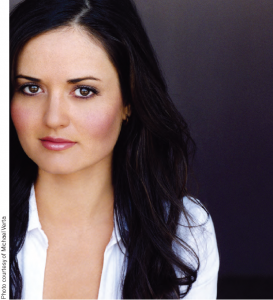
EDGE: You are a new mom, a working actress and a best-selling author. Are your math skills finally being tested when it comes to dividing your time?
DM: (Laughing) I’m not sure if the skill that’s being tested now has ever been in a category of my life before: Sleep Deprivation. There’s not a lot of math that has come into being a mother yet, but I’m sure that there will be. One other thing, I’m breastfeeding— so there is no formula, no bottles, no calculation of how many ounces and how often. There’s just breastfeeding on demand, the most non-mathematical way to go.
EDGE: There are a lot of interesting ways to go with the math degree you earned at UCLA. What were some of the options you considered?
DM: I actually considered very strongly becoming a professor of mathematics. But I missed acting. I missed entertainment. So for me to be able to write entertaining math books, to combine the two things that I love, is perfect.
EDGE: How did the math books come about?
DM: After I graduated, I went back to acting. I was on The West Wing and doing some other things. Because I missed math and didn’t want to abandon it, I  started a math advice column in which I answered people’s math questions. After I finished The West Wing, there was an article about me in the Science section of The New York Times. From that article came an offer to write a math book. I realized that I had been preparing to write this book for a long time without knowing it—first, by being a math major and, second, by writing the column.
started a math advice column in which I answered people’s math questions. After I finished The West Wing, there was an article about me in the Science section of The New York Times. From that article came an offer to write a math book. I realized that I had been preparing to write this book for a long time without knowing it—first, by being a math major and, second, by writing the column.
EDGE: Your first book, Math Doesn’t Suck, was written with teenage girls in mind. You actually spoke before Congress about the importance of women in mathematics.
DM: Yes, and that’s when I knew the kind of math book I wanted to write. The middle school years are the most crucial for girls and math. It’s a time when they decide they’re not good at math because of social pressures and stereotypes. It’s a confidence issue. Middle school is a time in a girl’s life when she starts asking herself questions like, Who am I? It’s a vulnerable time in terms of self-image.
EDGE: That was the first of three titles. Next came Kiss My Math and Hot X: Algebra Exposed.
DM: I had no Idea I was going to be writing more than one book. I thought the first wasn’t going to do well; I just wanted to help some people. So for it to take off the way that it did was crazy. To be named ABC’s “Person of the Week” and to have two books become New York Times best sellers, it was amazing.
EDGE: What distinguishes the approach of your books from, say, the type of teaching students would receive in a classroom environment?
DM: It’s completely different. First, the math books look like teen magazines and the tone is extremely conversational. It’s like we’re getting together, girl-to-girl. I tell funny stories and make little analogies to help them remember things. The books work for boys, too. I get letters from boys who say, “Hey, the books are kind of girlie, but now I know how to solve for X, so thanks.”
EDGE: How crucial is the role of the teacher in terms of fostering a love of math rather than a fear of math?
DM: The way the math is presented makes all the difference. If a teacher in any subject is fun and friendly, that’s how the material is going to appear. If you have a teacher who doesn’t like math and was just thrown into that position— which happens all of the time, because it’s not the most popular subject—then you end up with kids who are confused and scared. When I was in seventh grade I had that experience. We asked questions and didn’t get good answers. I thought it was me, that I was stupid. But another teacher came in midway through the year. She was fun, friendly and just exceptional. The vibe was so different. I started to understand the math and, as I relaxed more, things made sense. That showed me just how much presentation matters. When I write the books I keep that in mind.
EDGE: Do you imagine you’re writing for yourself at that age?
DM: I do. I try to bring math into that world. I have all my journals from that time, so what I do is read sections to give me perspective of who I am writing for. I can look back and say, “I remember what that felt like.” So I talk about issues that girls are already thinking about, like popularity. I weave the math into their lives so that they can remember the math concept based on these fun stories and topics. That’s what I would have wanted at that age.
EDGE: What is the message beyond the math you try to get through?
DM: Girls are seeing negative stereotypes and getting a message from every conceivable media source—especially reality TV—that it’s okay to be slutty and ditzy in order to be attractive. This message keeps getting through again and again, and it’s so disturbing to me. Girls think if they’re too smart then they won’t be attractive. Or if they’re attractive that they can’t be smart. My message is that you can be anything you want to be, and the smarter and stronger you are by challenging yourself with math, the more fabulous you’ll be—and the better decisions you’ll make—in anything that you do.
EDGE: Did you get to spend much time in the classroom as a young actress?
DM: The Wonder Years started when I was in the seventh grade. The show was filmed, so any day that I actually wasn’t in a scene I went to my regular school. On average, I was on the set one or two days a week. It wasn’t until the very last season that they decided to put Winnie Cooper in way more of the episodes. My last year I was out of the classroom more than half the time. We had great tutors on the set. The producers did not skimp on that, which I am more than grateful for. In my senior year, when I was on the set all of the time, I had a dedicated calculus tutor because my class had surpassed what the regular tutor could do.
EDGE: What were the positive aspects of balancing schoolwork and acting?
DM: During The Wonder Years I learned how to compartmentalize. “Okay,” I’d say, “for these twenty minutes I’m working on this math test and for the next two hours I’m doing this emotional scene. Now I’m going to go back and finish that math test.” Having to switch gears like that really trained me to have a dual career in both entertainment and as a writer now.
EDGE: Is it fun to hear “Winnie Cooper was my first crush” or is it just creepy and annoying?
DM: It’s flattering. The show was so loved by so many people. And there are a lot worse things to be recognized for! People tell me all the time how they watched the show together as a family. Now most of the kids reading my books don’t know The Wonder Years—they know me as “That girl from the math books.” I love it! I actually like to tell stories from The Wonder Years in my books. It’s an opportunity to show how someone can lead what you think is a glamorous life and still make really smart choices. You can study and be a responsible person who is happy in life because you made smart choices.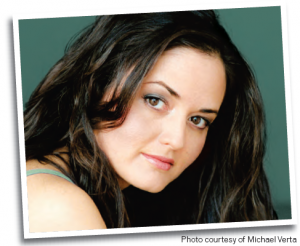
EDGE: You went into UCLA with the ambition of being a filmmaker, and came out with a math degree. What brought that change of course?
DM: My parents were a great influence and they sent me off right, but I still went through a lot of those insecurities that you go through when you’ve been on television and you’re still recognized for one thing. You’re a kid, and you are taught that that’s who you are, and you’re like, “Wow! Is that my whole self-value, my self-worth? What else would I be valued for if I didn’t have that?” Well, in college, I discovered that math could give that to me. I felt smart, I felt capable and it had nothing to do with Hollywood. I thought, I know I was going to be a film major, but I’m going to be a math major. I like this and to heck with it—I’m going to do this. I don’t how or why this is going to help my life, but I want to do something that makes me really feel good about myself.
EDGE: The theme of this issue is Childish Things. Have you put away Winnie Cooper, or will that character always play a part in your life?
DM: The answer to both questions is Yes. Because people remember The Wonder Years, it is still a part of my life. However, I have moved on—meaning, I don’t identify with it anymore. In large part because of being a math major and writing the books, I have a new self-reference point. Something I identify with. In the halls of UCLA, where I became a calculus tutor, I went from “That girl on TV” to “That girl who helped me pass calculus.” The math really helped me leave behind the childish things and move forward.
EDGE: And as you look forward, would you say your dream job is in the entertainment industry or in the world of education?
DM: I don’t know. I love them both. It’s as if I had two kids and you asked which one I loved more? I love being able to do both. I guess if I had to choose, I would have to say writing math books. It feels like this is what I was put on this planet to do. I feel like I’m making a big difference. EDGE
What happens in Vegas stays in Vegas. Well, that is not entirely accurate. Actress RUTINA WESLEY, one of the stars of the HBO series True Blood, did not 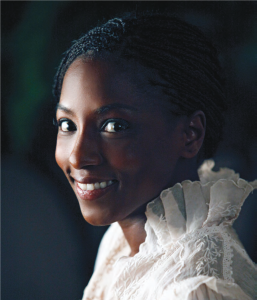 stay. The daughter of professional dancers, the Las Vegas born-and-bred Wesley took her show on the road—first to the University of Evansville as an undergrad and then to the Juilliard School in New York. Along the way, Wesley also studied at London’s Royal Academy of Dramatic Art. A plum role on Broadway in David Hare’s The Vertical Hour and the lead in the 2007 dance film How She Move earned her an audition for Alan Ball, who was casting the tricky role of Tara Thornton in True Blood. The depth she brought to the character not only won her the part, it has since made Wesley one of the most popular characters on television. EDGE Assignments Editor Zack Burgess took the actress back to Las Vegas to talk about her show business roots and inspirations, and to explore the imaginative and eclectic Rutina Look (his words, not hers). The ground rules for the interview? Only one “vampire question” allowed (our rules, not hers). Oh, the pressure! As usual, Zack saved the best for last.
stay. The daughter of professional dancers, the Las Vegas born-and-bred Wesley took her show on the road—first to the University of Evansville as an undergrad and then to the Juilliard School in New York. Along the way, Wesley also studied at London’s Royal Academy of Dramatic Art. A plum role on Broadway in David Hare’s The Vertical Hour and the lead in the 2007 dance film How She Move earned her an audition for Alan Ball, who was casting the tricky role of Tara Thornton in True Blood. The depth she brought to the character not only won her the part, it has since made Wesley one of the most popular characters on television. EDGE Assignments Editor Zack Burgess took the actress back to Las Vegas to talk about her show business roots and inspirations, and to explore the imaginative and eclectic Rutina Look (his words, not hers). The ground rules for the interview? Only one “vampire question” allowed (our rules, not hers). Oh, the pressure! As usual, Zack saved the best for last.
EDGE: You grew up in a town that isn’t always known for its taste, but it is definitely known for its style.
RW: True.
EDGE: Yet you seem to have developed a keen sense for both. How did that happen?
RW: Being the daughter of a mother who was a professional dancer had a definite influence. My mother loves to dress and she has a great sense of style, with the feathers and colors and all. I can go in any direction, from elegant to tomboyish. I think traveling as much as I have has helped, as well.
EDGE: Does your sense of style come naturally or is it something that you have to plan and work on?
RW: A little bit of both. I’m a chameleon with my style because there are so many things I like; it’s hard for me to choose. I love to glam it up for events and wear things that I can’t in everyday life, but I also love to run around in jeans and sneakers, especially since I’m secretly a sneaker freak.
EDGE: Is there a story behind the Rutina Look?
RW: I definitely consider myself a New York girl. I just like the style of New York. There really is no story behind my look. I just think I have a good sense of what makes good and bad fashion—although I have been known to take risk with fashion from time to time.
EDGE: Who are some of the designers that you like?
RW: Jean Paul Gaultier, Cynthia Vincent, Stacey Bendet [Alice & Olivia], Versace, Tadashi—there are just too many to name. I like a variety. It’s nice to switch it up every once in a while.
EDGE: Were there actors you felt drawn to as a girl—any that you wanted to model yourself after?
RW: Of course. Angela Bassett, Viola Davis, Meryl Streep and Julia Roberts come to mind. I consider them all people who carry themselves with dignity and class, and who have mastered their craft.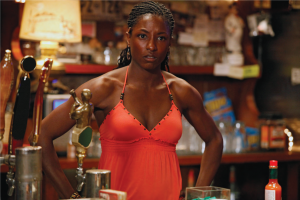
EDGE: On True Blood, there is a lot of grittiness to your character, Tara, in the face of unimaginable danger and evil. Where do you reach down and pull that from?
RW: I know a few people who were forced to grow up too fast because of something that happened in their lives. I tend to draw from the stories I’ve heard from them. I’ll just take myself to these dark places and use my imagination, to picture what it would be like to grow up in a home that was abusive and volatile, try to think of how that would make me feel. I do always try to come from a place of honesty and humanity, because I don’t want it to be too over-the-top. A lot of the time, though, I can get a true sense of things from the words I’m given in the script. I’m lucky to be working with some amazing writers.
EDGE: Talk about the performing arts school you attended in Vegas. People picture Fame on the Strip. What was the reality like?
RW: Yeah, I can see how people would think that. You know what our first play was? Fame! It was a ton of fun. We were always doing something. Whether we were singing songs from Grease or performing Shakespeare, I love Shakespeare, it was definitely a wonderful experience. It prepared me for what was to come and fueled my desire and drive to become who I am today.
EDGE: What percentage of your classmates had parents who were entertainers, as you did?
RW: Not many at all. Most of the kids’ parents either worked on the Strip or had their own businesses.
EDGE: You mentioned your mother’s influence. In what ways has your father helped your career?
RW: Both of my parents prepared me for what to expect as I made my way in this business. My father was always there to say make sure you read something before you sign it, and makes sure you have a lawyer.
EDGE: Was acting your first love?
RW: I would have to say dance was my first love. But I had to choose, and acting just made more sense. With acting I can do so many things. I can even dance if I want to. I can always dance in a musical.
EDGE: After earning your theater degree at Evansville, you made the quantum leap to Juilliard. Looking back, can you identify the performances that won you a spot there?
RW: At Evansville we did a lot of Shakespeare, and we had to perform many monologues, which they knew about at Juilliard. So they made me do all of them, which is amazing when you think about it.
EDGE: Looking back, which Juilliard teachers played key roles in your development as an actress?
RW: John Stix and Richard Feldman were very influential.
EDGE: Is Juilliard harder to get in or stay in? And who were some of the teachers who were influential in your development as a performer?
RW: Both are hard! They used to have a cut rule, but they don’t anymore, which is good. That way you can really concentrate on your craft and not worry about being sent home. It was definitely challenging, but worth every minute of my time. It was fun—just an awesome experience. I met lifelong friends there. I met my husband there. It was, and has been, one of the greatest experiences of my life. Recently I was walking with a friend from high school and he reminded me that I once said that I would go to Juilliard. I didn’t remember that. He reminded me that I was living out my dream. I couldn’t help but start crying right there on the streets of New York.
EDGE: When you were cast in The Vertical Hour on Broadway, what kind of expectations did you have in terms of building a personal or professional relationship with Julianne Moore?
RW: None really. But she was nothing but exceptional to work with and be around. It was a small cast, so we really became like a family. To work with Julianne and Bill Nighy, who is a true professional, was a remarkable experience. And to work with people you admire and to have them treat you well, it was such a pleasant experience. I have nothing but positive memories of working with Julianne and being around her.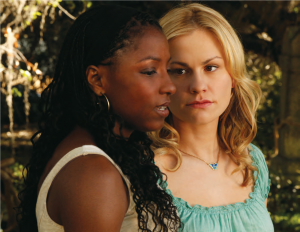
EDGE: What did you learn about the craft from her?
RW: Her work ethic was amazing. The way Julianne immersed herself in her character was a very good thing to see. She works so hard at her craft that it can’t help but rub off on you—especially if you are willing to learn. She’s a risk-taker. She’s not afraid to do different things with a character.
EDGE: In what ways did the director, Sam Mendes, have an impact on your approach to performing?
RW: He was always working to get the best out of you. He forced—and allowed—me to stretch as an actress. Which is what good directors do.
EDGE: Juilliard connections can take you in any number of directions. In your case, it led to your part on True Blood, through a classmate, Nelsan Ellis, who is now your co-star.
RW: Yes, we have known each other forever and have been good friends throughout. So it was great when he recommended me for the part. It was so natural because he knew my work and what I was capable of. When I found out I got the part I was driving out of a Starbucks parking lot. I was so excited I almost crashed the car. So I pulled over and just started screaming.
EDGE: Is it fun being a celebrity?
RW: It’s fun. Although I still have a hard time considering myself a celebrity. But in this business if you are being recognized for what you do, it’s a sign that you are doing well. And so far, it has been very good to me and I am enjoying it. I consider myself fortunate.
EDGE: Final question. Would you rather be trapped in a room with a vampire or a Hollywood agent?
RW: I would have to say a vampire. At least with a vampire, I think I’d have a chance of surviving. EDGE
Editor’s Note: Rutina Wesley was hailed in a 2008 New York Times profile for her “reedy voice and crackling energy,” as well as the subtlety she brings to the role of Tara. Wesley and her fellow True Blood cast members earned a Dramatic Ensemble nomination at the 2010 SAG Awards.
So many questions, so little time. Model. Actress. Activist. Author. To put it mildly, BETH OSTROSKY STERN leads a very interesting life. EDGE Assignments 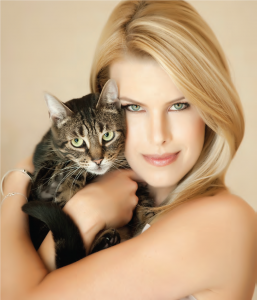 Editor Zack Burgess managed to grab 20 solid minutes with Beth at the “tail end” of the publicity tour for her new book, Oh My Dog: How to choose, train, groom, nurture, feed and care for your new best friend (Gallery Books). Zack covered a lot of ground in his Q&A, yet he never got to the question Letterman posed to her on national television: Why Howard? Turns out she kind of answered it anyway. The spokesperson for North Shore Animal League America, Beth wouldn’t tell us how her book ends. Spoiler alert…the woman ends up taking care of the dog!
Editor Zack Burgess managed to grab 20 solid minutes with Beth at the “tail end” of the publicity tour for her new book, Oh My Dog: How to choose, train, groom, nurture, feed and care for your new best friend (Gallery Books). Zack covered a lot of ground in his Q&A, yet he never got to the question Letterman posed to her on national television: Why Howard? Turns out she kind of answered it anyway. The spokesperson for North Shore Animal League America, Beth wouldn’t tell us how her book ends. Spoiler alert…the woman ends up taking care of the dog!
EDGE: When did you make that first connection with animals?
BOS: The day I was brought home from the hospital. When I was born, my mother and father had rescued a mutt named Suzy Dog. Right away my older brother and I were taken with her. When my brother, who is 17 months older than me, came home, Suzy Dog was placed in front of him. It was the same for me. She was the first thing I saw when I opened my eyes. We always had animals in our home. We were always rescuing animals. It’s in my blood.
EDGE: How much thought should go into preparing your home and family for an adopted pet? Some say it isn’t that different from preparing for a new child.
BOS: In some respects that’s true. You’re not bringing a human into your home, it’s an animal—let’s just make that clear. But absolutely, you have to assess your lifestyle. Do you work? Do you have a family? Do you have a yard? Do you live in the city? Do you have access to dog walkers? If you travel, do you have people to take care of your dog? All of those things should be lined up and well thought-out before an animal enters your home. I write about that very thoroughly in my book. Whether you adopt a dog or purchase one from a breeder, you have to appreciate that you are in charge of this animal for the next fifteen years. You are essentially the parent of this live being that is needy. It needs to be fed, needs to have a safe place to sleep, and needs to be taken care of.
EDGE: You also write about the importance of bonding. As a celebrity, presumably you have less time to bond with your pets than the average person. So how much time is “enough” time?
BOS: I think anyone who has an animal in his or her life is going to fall in love and make time for that addition. Being a celebrity hasn’t anything to do with it. When you have an animal, you’re committing to that animal. Yes, both my husband’s and my schedules are crazy. But that’s true of a lot of dog owners. You put in the time and make sure there is coverage for when you are not available for their needs. They are a part of your family.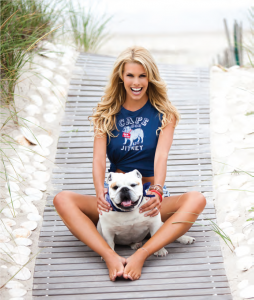
EDGE: In your book you describe the Top 20 breeds and the importance of matching the personalities of dog and owner. What ever happened to the old-fashioned way of picking a dog—love at first sight?
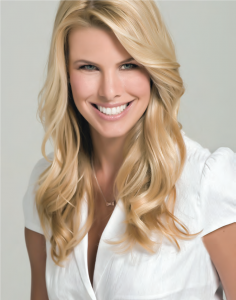 BOS: I believe in love at first sight. Just know what you’re looking for. Assess your lifestyle, as I mentioned before. When you go into a shelter, if you have a big house with a beautiful yard or access to a park, you might want to get a bigger breed. Or if you live in a one-bedroom apartment, you might not want to get that Rottweiler or Bernese Mountain dog; you might want to go for a smaller dog. Talk to the adoption counselor, determine the right fit for your lifestyle, and then when you spend time with a dog and make eye contact and fall in love, you’re also going to know it’s the right one to bring home.
BOS: I believe in love at first sight. Just know what you’re looking for. Assess your lifestyle, as I mentioned before. When you go into a shelter, if you have a big house with a beautiful yard or access to a park, you might want to get a bigger breed. Or if you live in a one-bedroom apartment, you might not want to get that Rottweiler or Bernese Mountain dog; you might want to go for a smaller dog. Talk to the adoption counselor, determine the right fit for your lifestyle, and then when you spend time with a dog and make eye contact and fall in love, you’re also going to know it’s the right one to bring home.
EDGE: You have been working with the North Shore Animal League for five years now. How did that relationship begin?
BOS: I was modeling in New York City and the booker at my agency asked if I would volunteer my time to model at a fashion show during their annual luncheon. I spent my day walking the runway, modeling gowns with puppies from the North Shore Animal League. I didn’t leave the runway until every animal was adopted! They put two and two together, seeing my passion for animals and realizing that I was the girlfriend of Howard Stern. They asked if I would pose for a newspaper ad for the North Shore Animal League. I said absolutely, and after I saw what they do I began to volunteer regularly. I am so passionate about their mission. It has just been the most rewarding part of my life the last five years.
EDGE: Which is how Oh My Dog came about.
BOS: Yes. People would stop me on the street and ask me questions about their dogs. I had to explain that, although I’m affiliated with animal rescue, I wasn’t an expert on dogs. So I would rush home to my computer and go online. Not only did I quickly learn that there was bogus information on the Internet, I also saw that I was getting ten different answers to every question that I would plug in. Wow! I didn’t know which answer to give people. Then I realized I had such amazing experts at my fingertips. I’m friends with Oprah’s trainer Tamar Geller. I know one of the groomers that was on Groomer Has It. I know these amazing people at the North Shore Animal League. What if I gather all those questions that people have asked me over the years—come up with even more questions—and act as the “host” of a guide filled with their expertise? Oh My Dog ended up being over 500 pages.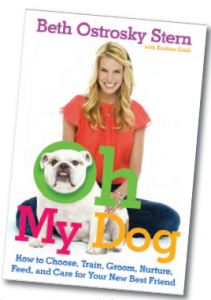
EDGE: As a writer, I know one of the hardest things to do is to ask your spouse to read something you’ve written. It’s probably one of the reasons I have an ex-wife. What was that experience like for you?
BOS: I didn’t actually let Howard read the book until it was finished. He knew what chapter I was working on or what outline or interview I was working on, because it took up so much of my time—a year-and-a-half actually. Howard was a loving husband. He supported me and encouraged me every step of the way. I couldn’t have been luckier. I guess I get props for not making him read every page.
EDGE: Did being married to a public figure help or hinder you as the book project moved along?
BOS: I don’t think it made a difference at all.
EDGE: Who could you have not written this book without?
BOS: My dog, Bianca. She was my inspiration. She was beside me, at my side, the entire time that I was working on this project. She was my best friend. She kept me going and drooled on the pages as I was proofing them.
EDGE: The English majors of the world need to know—did all that reading and writing in school pay off when you authored your first book?
BOS: Absolutely. But you know what has really helped me? I’m so grateful that, in high school, we had to take a typing course. I don’t think they offer that anymore. Being able to type very quickly has been my savior. But yes, understanding sentence structure, being used to writing every day—I think that my English Lit background was definitely useful. EDGE
Editor’s Note: Beth Ostrosky Stern is one of the judges on the ABC reality series True Beauty, where contestants think they are vying to become the “face of Las Vegas” but are, in fact, being evaluated on their character. She says she was honored to be chosen as a judge of inner beauty. Zack Burgess is tearing it up as a freelance writer and editor this summer. Look for his upcoming articles in Politics and SLAM magazines. Photo by Christopher Appoldt.
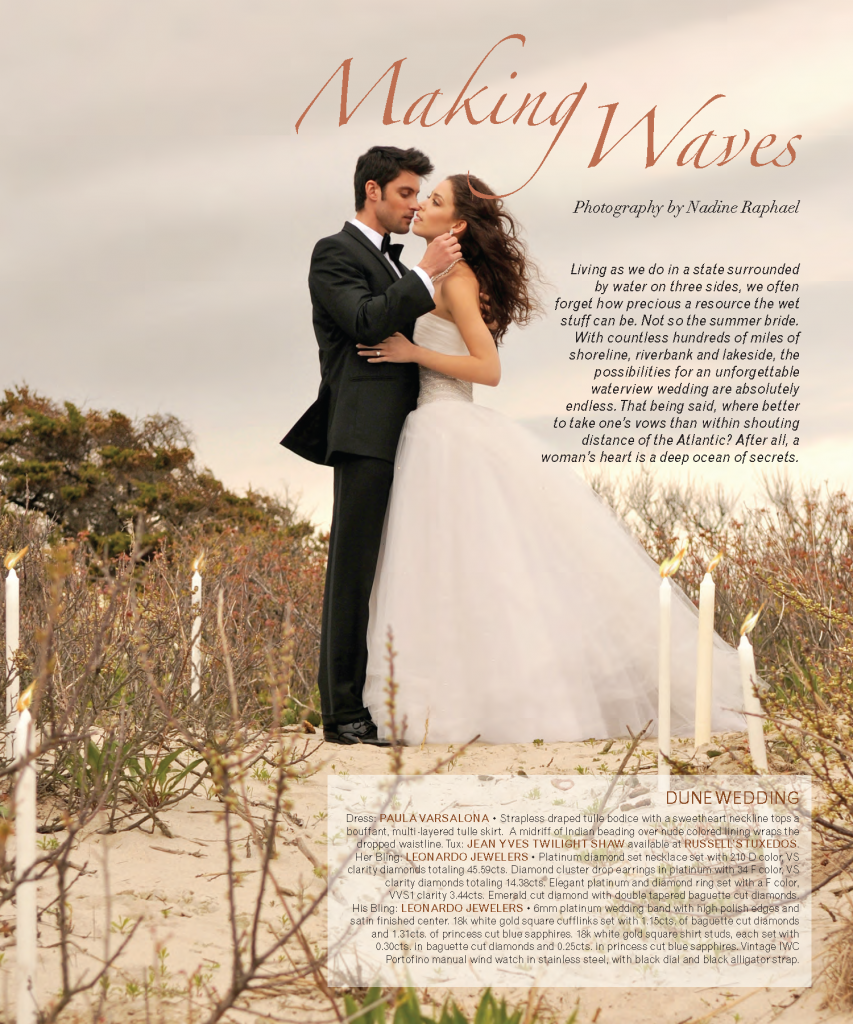
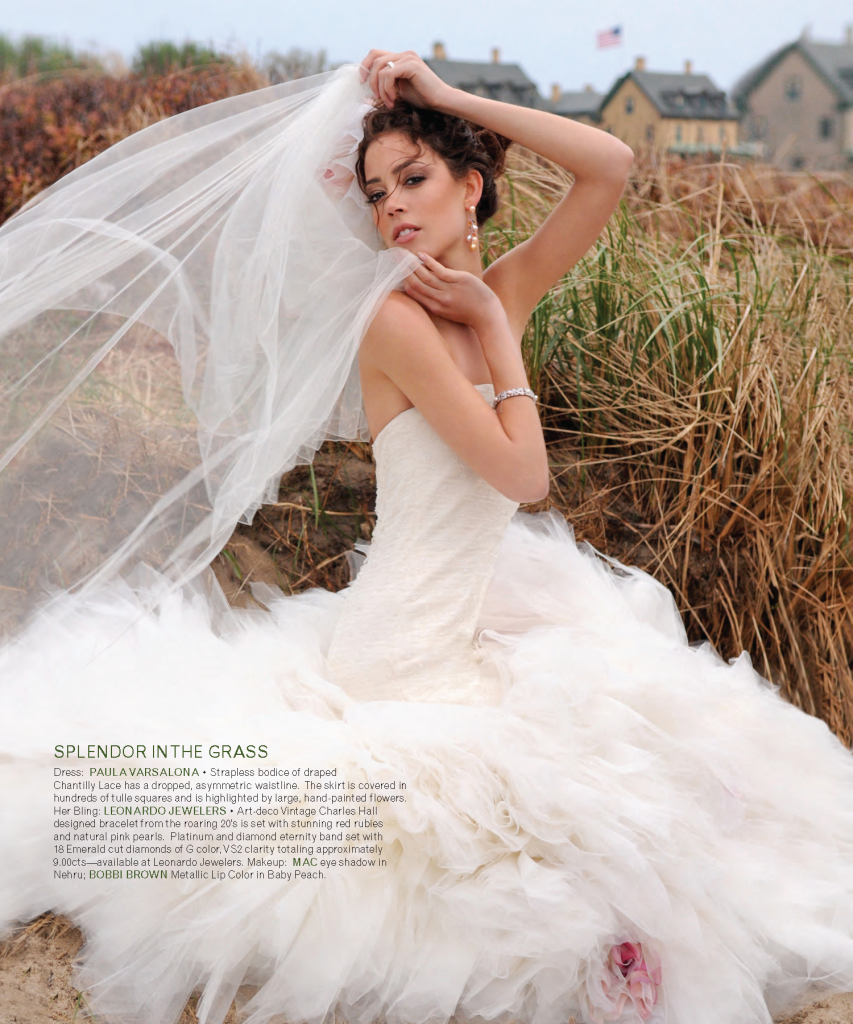
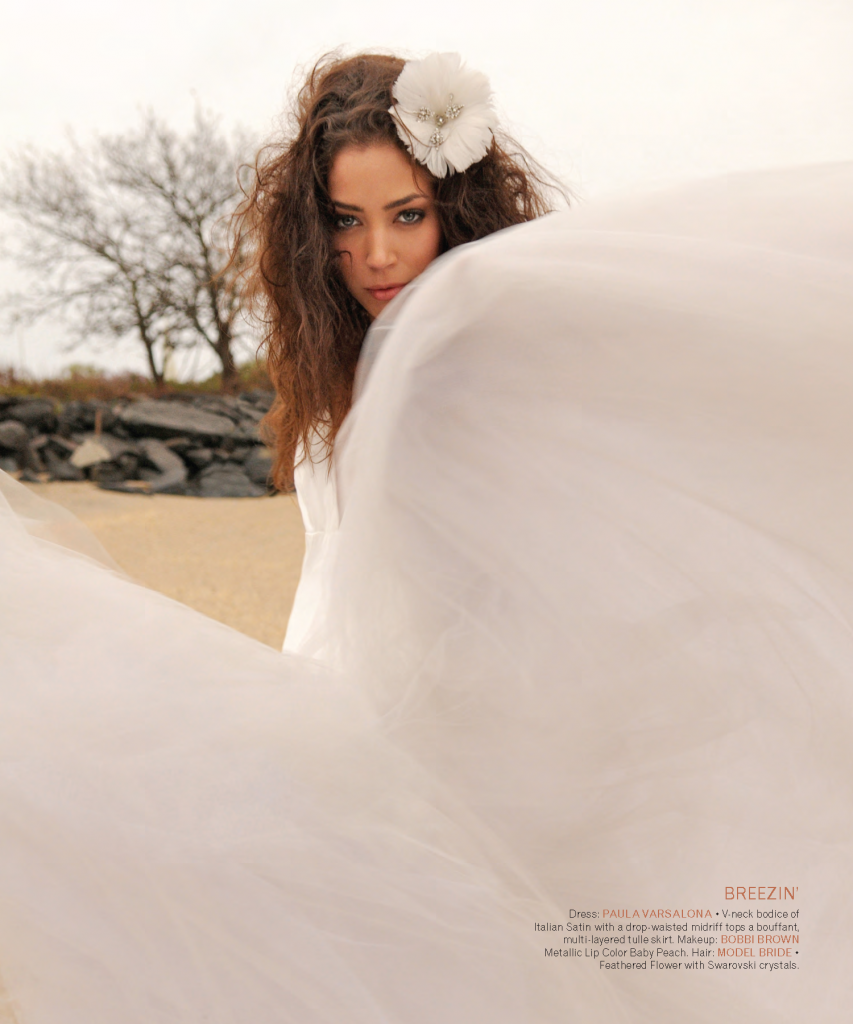
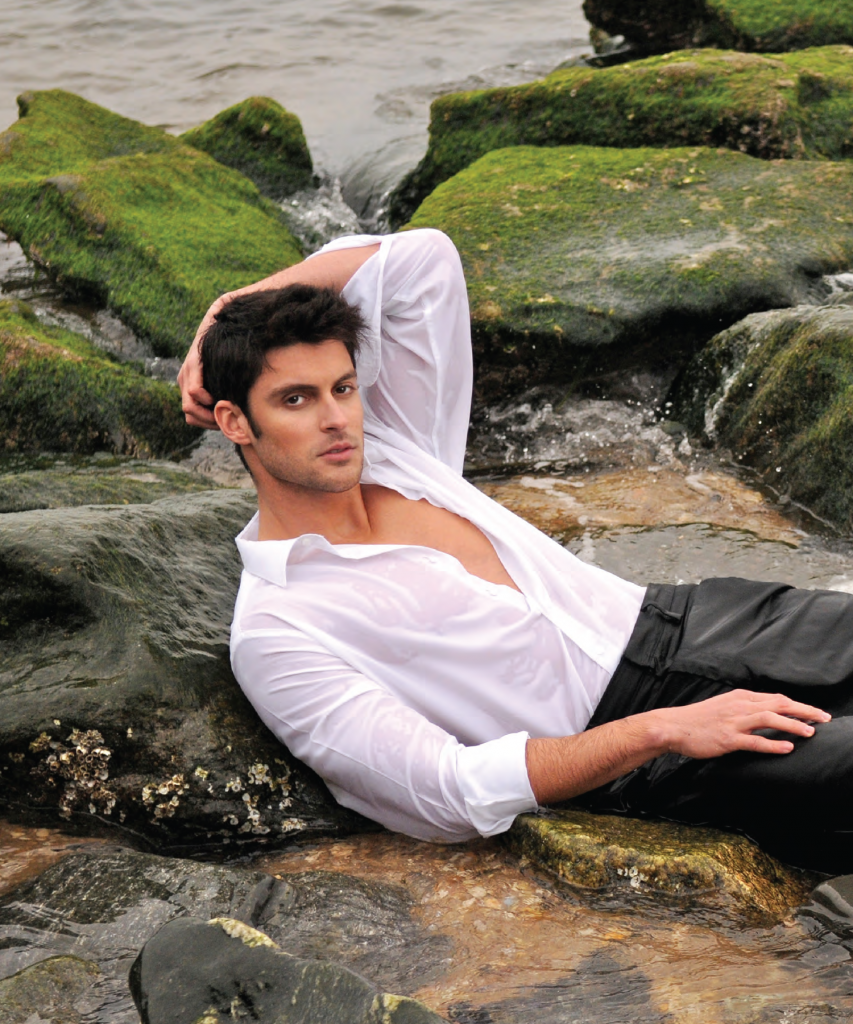
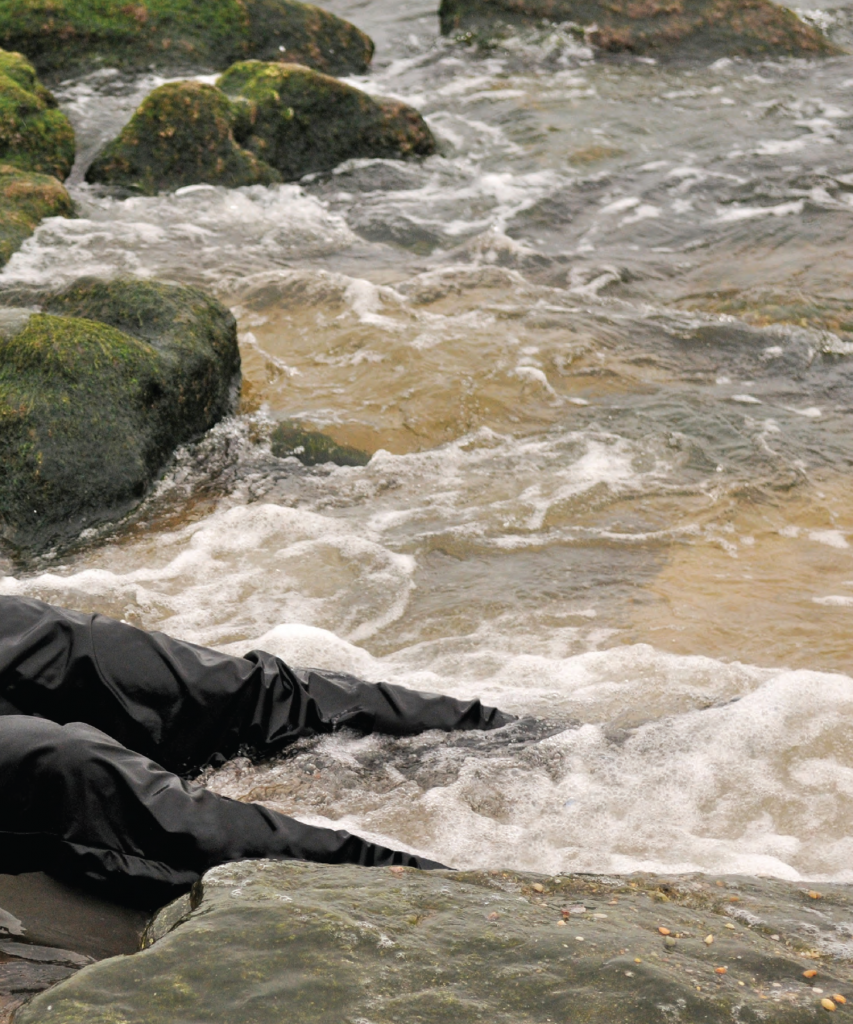
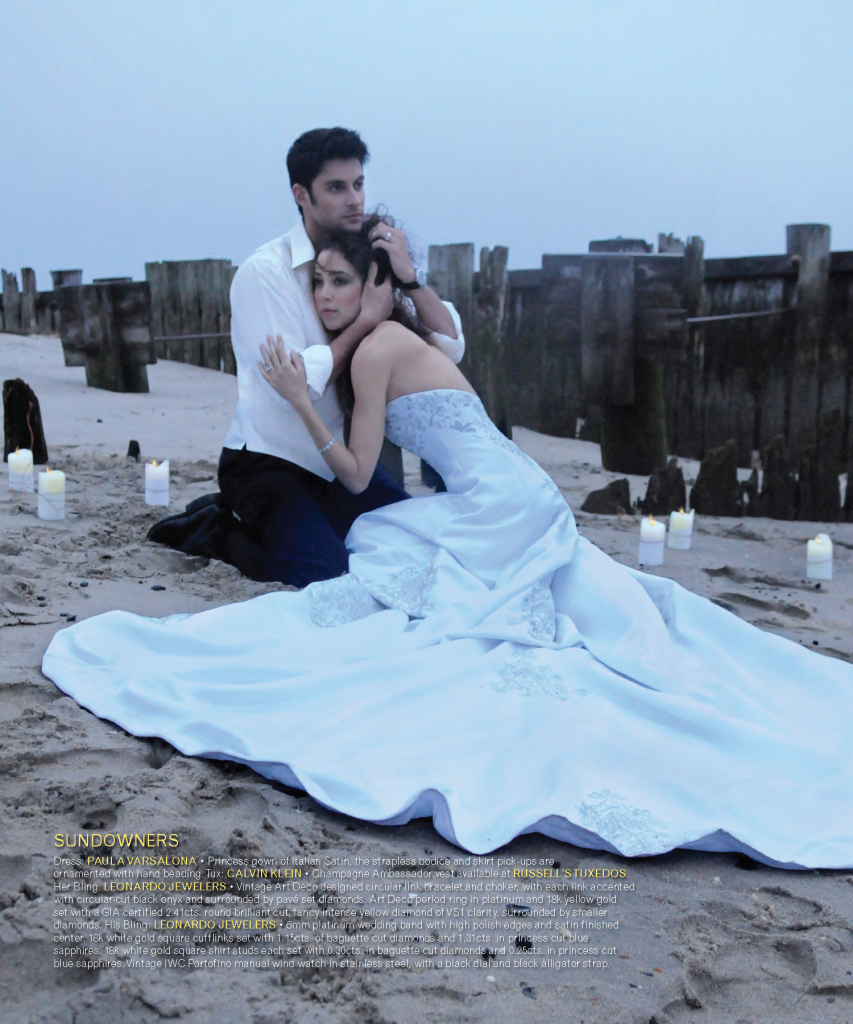
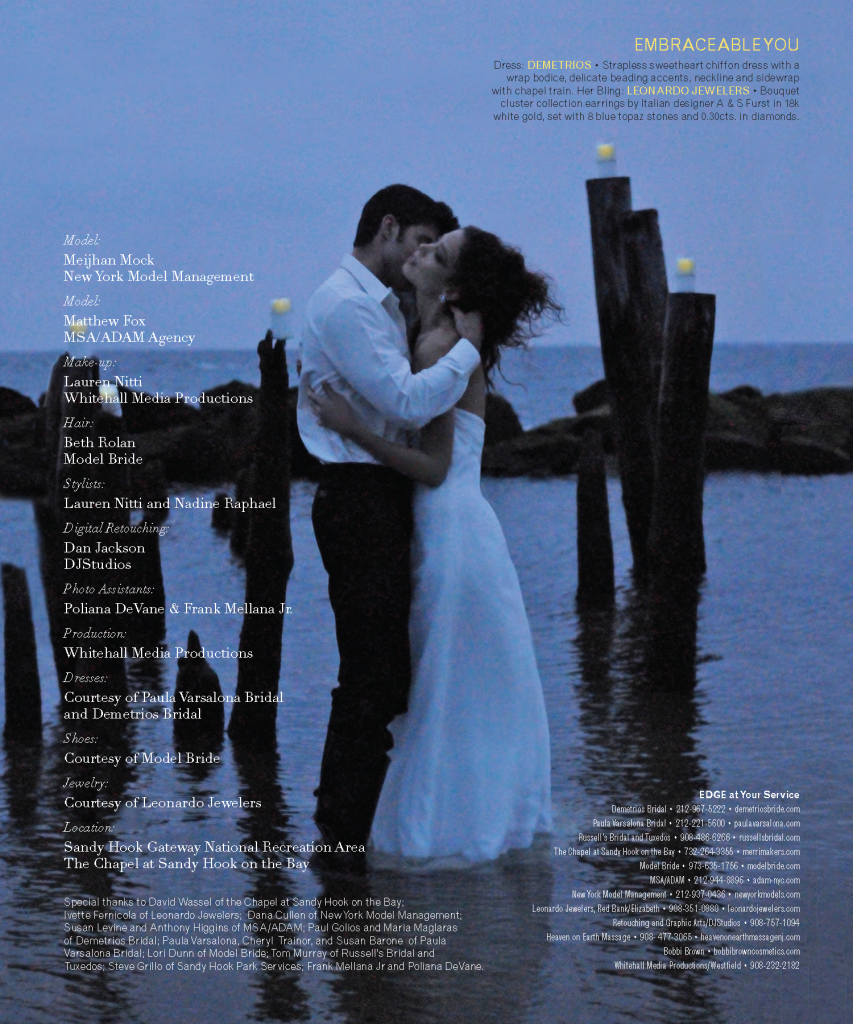
In 1974, when Alice Waters’s Chez Panisse was a toddler, a young chef named DENNIS FOY opened a restaurant some 3,000 miles from the mecca in Berkeley, California that was setting a new standard for dining in America. Located in Meyersville— thought of in those days as west of nowhere—the Tarragon Tree drew people curious about a way of cooking that was ingredient-focused, seasonal, and dependent on the nearest farmers. Technique was critical but, like Waters and her foraged-food menus, Foy couldn’t, and wouldn’t, write his bill of fare until he’d made the rounds of local farms.
Foy’s philosophy remained the same as he moved Tarragon Tree from Meyersville to Chatham, opened Les Delices in Whippany with his brother, John, and crossed the Hudson to Manhattan, where he widened his audience with Mondrian. There were other restaurants: Toto, Townsquare, casual Shore spots in Bay Head and Point Pleasant Beach, as well as EQ and Dennis Foy in New York, both in partnership
with his wife, Estella Quinones. He often shared his kitchen space, as well as his experience and passion for local fare, with novice chefs—who themselves made serious marks on American cuisine, including the top judge of “Top Chef,” Tom Colicchio, and James Beard Award winners Debbie Ponzek and Craig Shelton. Foy also kicked in his two cents as consulting chef on major restaurants in New Jersey.
Now, after heart surgery and recovery, after a successful series of gallery shows that put the chef’s paintings in the spotlight, Foy’s back full-time in New Jersey. He and Estella last fall bought and re-fashioned the former Lawrenceville Inn, christening it Dennis Foy. This year, the chef and painter added another job to his résumé: student. He’s taking classes at the University of Pennsylvania in Philadelphia. ANDREA CLURFELD caught up with him between kitchen shifts and classes
EDGE: For those who don’t know you are the granddaddy of modern American food in New Jersey, talk a bit about your early restaurants
DF: In 1974, when we opened Tarragon Tree in Meyersville, there was a farm nearby where we’d get eggs still warm. That’s what we did— go from this farm to that farm. When we moved Tarragon Tree to Chatham, we kept that focus. In 1978, I also did Les Delices with my brother. Tarragon Tree was a precursor, really, to any modern restaurant in America. Out of that, I built other restaurants that helped to change food in America. It was a great time. The people who came to the restaurants and came through the kitchens were some of the biggest names in food. Critics, chefs. A lot of menus today are written the way I started writing menus back in the 1970s, early 1980s.
EDGE: You gave Tom Colicchio, a Jersey boy, his big break.
DF: Tom was my sous chef at Mondrian. I hired him because I knew him, knew his potential. A lot was happening in those days; I was also opening Toto, in Summit. Still doing Tarragon Tree.
EDGE: And you were hiring Debbie Ponzek and Craig Shelton.
DF: Debbie Ponzek [later the Beard Award-winning chef at Montrachet in New York] did a stage at Tarragon Tree. I just
love her. She’s a great talent, a great person, a great chef. She learned everything, worked hard, and deserves every
bit of her success. Debbie will tell you I drilled her. But she learned how to run a kitchen and how to cook. Craig Shelton[former chef-owner of Ryland Inn, Whitehouse, and anotherBeard Award winner] was a gifted, talented chef. Very bright, well-educated. We all were committed to our belief systems and very devoted to doing it right. I have been very fortunate to always have had a great deal of talent around me.
EDGE: Today, the buzzwords in food are local, sustainable and organic. Does that seem old hat to you?
DF: What’s really wild is that I’m returning to my roots— to what I was doing at Tarragon Tree in 1974. Getting eggs warm from the nest. Finding berries in the woods. Having people bring us things—wild things, berries, mushrooms— because they see what we’re doing. We’ve come full circle. So that is nothing new to me. The seasonality of food always has to be second nature; it has to be a natural reaction. It’s funny to remember this now, but back then, the Frelinghuysen’s used to bring me beefsteak tomatoes from their gardens every summer. My customers just did that, back in Meyersville and Chatham.
EDGE: How are you bringing local farms to your table at Dennis Foy in Lawrenceville today?
DF: The new menu literally is designed to be farm-to-table food. We found a guy who has black honey. Great stuff. We showcase it. Right near us are three farms. Two orchards. I feel almost like I’m back in the pool I first dove into in 1974. I source a lot of my produce through Nature’s Reward, the produce market over on Bridge Avenue in Point Pleasant; I’ve worked with them for years, going back to my places in Bay Head and Point Pleasant. It’s the best. I’ll go out of my way to go there.
EDGE: Have farmers become savvier?
DF: I think they have. There are farmers with serious degrees in agriculture and animal husbandry. New Jersey has some of the top growers. I think that if people become more attuned to what’s happening, the concept of the small farm can be reinvented. You don’t need big spreads. Just the right crops. The bottom line is that the farm-to-table concept is good economy—for both sides.
EDGE: How does all this Jersey bounty influence your cooking?
DF: I buy every day. So it’s basic. Keep it simple, keep it color-coded, keep it organic. It’s like the Depression-era mothers who made the most of their gardens
EDGE: So you think this has legs, that there’s a future to local-sustainable-organic—for the home cook and for restaurants?
DF: Absolutely. Lately, I’ve been thinking a lot about how full circle this has come for me. I’m surprised, but not surprised to be realizing that everything old is new again. Look at it this way: If you have your own victory garden, you’re a step ahead. Having that food in your backyard will make you recalibrate your diet in a good way. That could be a big change. Frankly, I don’t think there’s much new that’s going to come down the road for restaurants. Gradual influences, not major changes. It’s great that so many different cultures are coming to America and adding ideas to menus
EDGE: What’s on the menu these days at Dennis Foy?
DF: I’m cooking more simply, but bringing out more flavor in my ingredients. I spent the past year recovering from
heart surgery. I ate fairly well, and I still eat well. But I’m more focused today. I’d love to have, say, two elements on a plate. Two absolutely pristine things. Sea scallops from Point Pleasant with a parsnip cream. Just a touch of a balsamic reduction. That’s it. Pristine, elegant. I’m not doing frou-frou food. I started getting ice cream, the best ice cream, from Jerry Reilly, who runs Halo Farm [in Mercer County]. I taste his ice cream and I’m totally blown away. I’ve been in New Jersey 35 years and I’m still discovering what’s here.
Editor’s Note: Dennis Foy is located at 2691 Main St., Lawrenceville. Telephone: 609. 219. 1900.
“Popular” may be one of the iconic songs that Kristin Chenoweth has made her own during a hit-filled stage and screen career, yet it falls far short of describing her standing among musical comedy connoisseurs. It is no exaggeration to say that Chenoweth is one of the most beloved performers in Broadway history. From her Tony-winning performance as Sally in You’re a Good Man, Charlie Brown to her memorable turn as the good witch Glinda in Wicked—to her portrayal of Mildred, the cranky preacher’s wife in this summer’s joyfully insane Apple TV series Schmigadoon—she has specialized in imbuing her characters with irresistible charm and explosive energy. Can you imagine Kristin Chenoweth sitting quietly on the sidelines during the COVID-19 pandemic? No…and neither could EDGE editor Mark Stewart. Fortunately, he was able to slow Kristin down long enough to chat about her busy 2021 and the just-released holiday album, Happiness Is…Christmas!
EDGE: Can you recall the moment when you were on a stage before an audience and thought, This is for me?
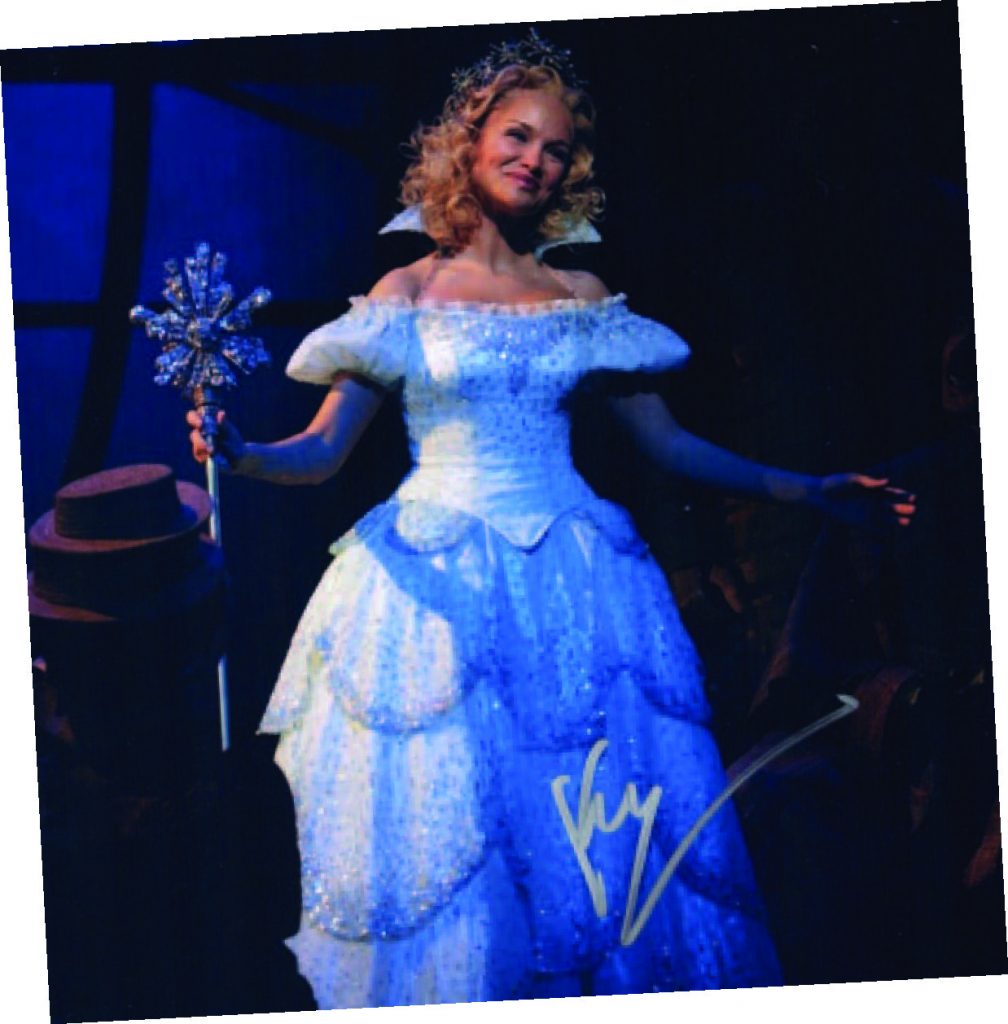
KC: Of course. I was about eight years old and wanted to be a ballerina. I was in a version of The Nutcracker in the Tulsa Ballet and wanted to play one of the mice, but I was too small to fit in any of the costumes. The director said he wanted me to “create” the role of the rabbit. I thought that seemed kind of sketchy. The rabbit just sat there next Clara for all of Act II. It was the second weekend, a Saturday matinee. My family was there. One of the props the sugarplum fairies dance with, a large vine, fell center-stage. It was a pretty big prop. That’s very dangerous for theater and especially for ballerinas. I thought, What would a bunny do? How would it act? So I hopped out, put it in my mouth and hopped back. The audience went crazy. I thought, Hey…I like this feeling! That’s when the bug bit me.
EDGE: Did your parents indulge this desire?
KC: You know, they did. We lived in Broken Arrow, Oklahoma and the nearest town that had anything was Tulsa. My parents were very gracious. They allowed me to take piano lessons at Tulsa University and I studied ballet in Tulsa, as well, where I became a member of the Tulsa Ballet junior dance company. And I sang in church. The first time I sang in church I was little, too, and thought Hey, I like this singing stuff, too. It kind of all happened at once.
EDGE: Florence Birdwell passed away earlier this year. She is someone you’ve mentioned as having played a key role early in your career.
KC: Thanks for asking about her. We had her memorial this October. The only way I know how to describe her is that she was a force—in terms of emotion and technique and knowing how to handle each student in a different way. I was really hard on myself, so I didn’t need somebody else being hard on me. She knew when to be hard on her students and when not to be. Yes, she taught me vocally and technically, but she’s really the one that ingrained in my mind the idea of If you don’t mean what you’re singing, don’t sing it. I still hear her in my head today. And now that’s what I tell my students, at Broadway Boot Camp and other places: “If you don’t mean it, don’t sing it.”
EDGE: I’m thinking of the bunny story in Tulsa and about the idea of creating a role. In the 1999 Broadway revival of You’re A Good Man, Charlie Brown, you played Sally. I saw the original and she wasn’t in it. It must have been an interesting opportunity to create a role that didn’t previously exist. Who in the world knew that Charlie Brown’s little sister would be a show-stopper?
KC: Certainly not me! I remember Michael Mayer saying, “I have a surprise for you but I can’t tell you yet.” I had another offer at the time in Annie Get Your Gun with Bernadette Peters. He said, “Trust me, you’re gonna want to do this.”
EDGE: Why couldn’t he tell you?
KC: Because Charles Schulz was still thinking about whether he wanted to give his permission to [add the Sally character]. Somehow, I knew in my heart I wanted to be in Charlie Brown, I just didn’t know why. I followed my gut and took the job. The first day of rehearsal, we were all asked to sit in chairs, in front of the costumes of the characters we would play. When I got to my chair I saw it was all Sally stuff. I thought, Oh my gosh! I get to create this part! It’s rare that a director trusts someone to do that. And obviously, it was the right decision for me and one of the most fun times in my life.
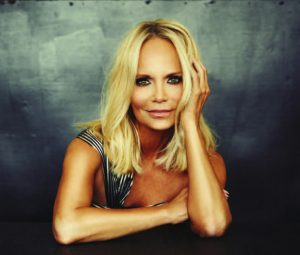
EDGE: Thinking about Wicked (left) and some of the wonderful roles that followed, do you look back at that decision as a game-changing moment for you?
KC: I look back and think of Michael Mayer’s genius of having the idea and how lucky it was that Charles Schulz said yes to Sally. And what a good idea it was to let us play with all of the different sketches when we were out of town to see which ones really worked, and which didn’t, in front of an audience. And finally, the genius of Andrew Lipa to come to me with a song, “My New Philosophy,” which was so character-driven. It was a great experience, but also one I can never repeat because my life changed overnight. I was lucky to be with my Charlie Brown family, and they with me—there were only six of us—because we were together.
EDGE: Do you still have to audition for roles?
KC: Sometimes I have to audition. Mostly for Broadway I don’t. To be honest, we look for jobs that are “me” or they come to me and say this is a “Kristin part.”
EDGE: How do you know you’re good to go with a role?
KC: If I don’t want to see anyone else playing it, then I know that’s my part. I’ve got to have fun and love the person—even if she’s a nightmare, I’ve got to figure out ways to love her. Sometimes I like to turn a part on its ear and not do what people expect. I think I’ve been successful in that respect; I’ve found my niche.
EDGE: Which, I guess, is how you make it look easy.
KC: That’s a very big compliment and I appreciate it.
EDGE: What’s the most difficult thing you’ve had to do professionally?
KC: Schmigadoon was pretty hard because we had to do an 18-page song in one take, with no cuts. In other words, no mistakes. That was a little scary.
EDGE: Do you have a favorite song, one you never tire of singing?
KC: There’s a song, “Til There Was You,” that Meredith Wilson wrote in the movie of The Music Man, which I did years ago with Matthew Broderick. I never get tired of singing that song. I just think it’s one of the most perfect songs.
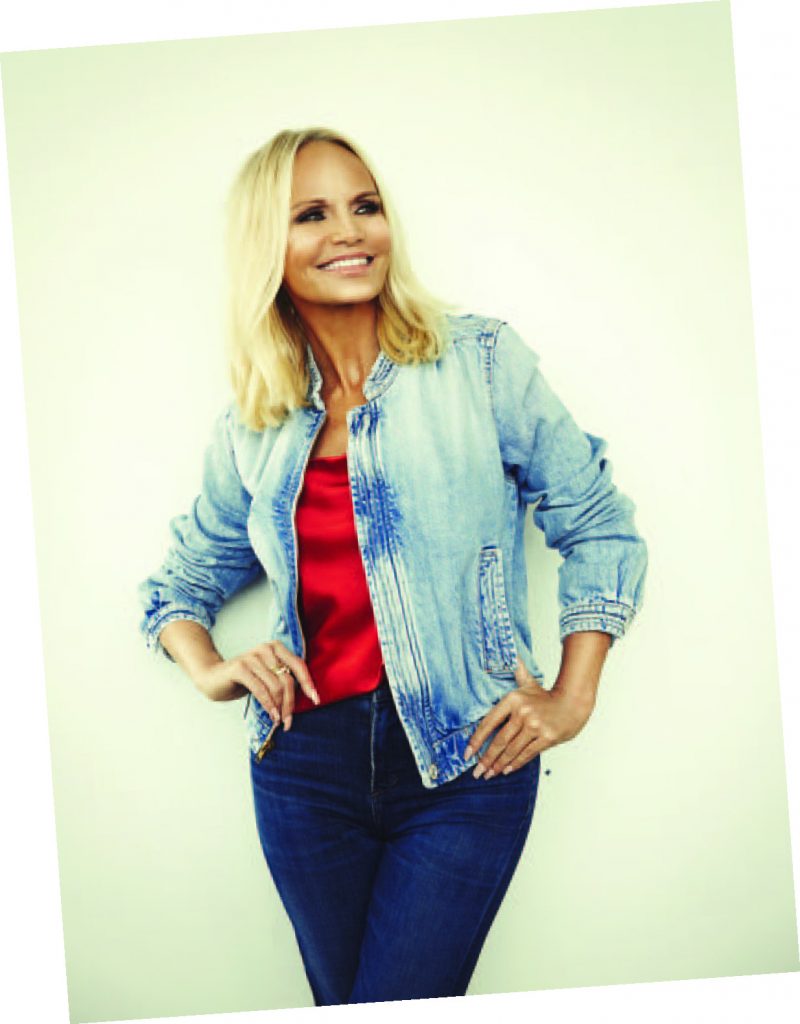
EDGE: You’ve played opposite some very impressive men and women on Broadway, people like Andy Karl and Peter Gallagher, whom most people know. What I’m wondering is have you ever worked with someone you knew little or nothing about, and they just blew you away in that first rehearsal?
KC: Everybody blows me away [laughs]. I think about the Andy Karls and the Peter Gallaghers and, goodness, going back in time to Brian D’Arcy James…I’ve just been so lucky. With my leading women. With my leading men. I’m grateful because they have all been very giving. In Promises, Promises I was in a role that no one wanted to see me play because it was more on the dramatic side. Sean Hayes, who is one of my closest friends, held my hand and was like I got you. He’ll always have a special place there for me.
EDGE: Tell me about your upcoming Christmas album. I’ve always wondered, how does an artist pick the songs that “make the cut” and belong together? Are they personal favorites? Are they ones that you feel suit your style? To me it seems like a real hand-wringing decision.
KC: Well said. It can be a hand-wringing experience. I really wanted this album to have a particular feel, like it’s in my DNA, which is why I recorded it in Nashville—not Country, but something with intimacy. I chose each song very carefully. We do a version of “Happiness” from You’re a Good Man, Charlie Brown where we were given permission to rewrite the words about Christmas. That was a big one because of the history for me. I love Kaye Starr so “Man with a Bag” had to be on there. I love Karen Carpenter, so “Merry Christmas, Darling” had to be on there, too. There’s a song that Barbra Streisand sang a long time ago called “Christmas Lullaby” written by Ann Hanson Callaway that had a huge orchestration to it, but I wanted it to be smaller in nature. A wonderful guitarist out of Nashville named Brian Sutton played it so beautifully. There’s a song that Stephen Schwartz wrote called “We Are Light” and as I thought about the feel and the tone of the record, the idea of “light”—of light at the end of the tunnel, of we’re getting there—kept coming up. It’s a Chanukkah song, but it’s so hopeful that I really wanted to have that on there, too, because a lot of people don’t feel that now. The way we end the record is with Peggy Lee’s “My Dear Acquaintance.” With all we’ve been forced to deal with the past couple of years with the pandemic, that song to me is a real standout because it’s like, “here’s to life” in a way. There’s a lot of happiness on this album.
EDGE: You mentioned Karen Carpenter. To my mind, no one made a happy song sound sadder than Karen Carpenter. How do you make her song your own?
KC: First of all, you quit listening to her [laughs] because I will imitate her. But you can’t help take some of the things she did so beautifully and pay homage to her. Karen had a deep voice, with a kind of cry in her voice, you feel her heart and her pain. On my version you get more of I’ll see you soon baby. I’ll be coming your way and it’ll be amazing. But yeah, you’ll hear a little Karen in there because she is the O.G., the original source.
EDGE: You mentioned Schmigadoon. I look at that cast and see a Who’s Who of scene-stealing performers. How did anyone keep a straight face?
KC: We didn’t [laughs]. We had a lot of do-overs.
EDGE: Usually there’s someone in a cast that really gets to you, and it’s not always who the public might think it is.
KC: Alan Cumming was hard because he’s so silly. And Fred Armisen. They just make me laugh. It’s who they are.
EDGE: Did they give you a “Mothers Against the Future” tee shirt when you were done?
KC: No, but I want one! Don’t you think we should have had them printed?
EDGE: That’s the first thing I thought of.
KC: That actually was the first line I read in the script and I thought, Oh, this is epic. You know, these are all my friends in Schmigadoon, people I’ve known forever and just love.
EDGE: Also, I can’t think of anyone other than Martin Short playing the leprechaun. I don’t think Martin could, either.
KC: I know [laughs]. He’s so perfect in every way.
EDGE: And he’s having a little too much fun, I think.
KC: I agree. EDGE
Editor’s Note: Kristin Chenoweth’s new album, Happiness is…Christmas!, was released in October. National Champions hits theaters November 24th. Schmigadoon is available on Apple TV. For more information on Broadway Bootcamp visit kcbbc.com. For more information on Kristin’s Arts & Education Fund, visit officialkristinchenoweth.com.
We all know someone who is good at everything they try. They instinctively find their groove, never seem to over-reach and succeed again and again where others fail. It makes you a little crazy, but how can you not love their talent and courage? Aisha Tyler has pulled off “good at everything” in the toughest of all spaces—the entertainment business. She has been brilliant as a standup comic, as an Emmy-winning host of The Talk and ringleader of Who’s Line Is It Anyway?, as a star of the beloved animated series Archer, as an unforgettable character on Friends and as a director on the Walking Dead franchise. The next challenge? Her own Brooklyn-based cocktail brand. The challenge for Gerry Strauss was a bit more daunting: slowing Aisha down long enough to cover the vast and ever-expanding landscape of her remarkable career. Is it any surprise that these pages could not contain her?
EDGE: You’ve taken a lot of chances and explored several different directions in your career. This being our “Best Case Scenario” issue, I have to ask: Is there anything that you can think of that you were advised not to do, but did anyway?
AT: I don’t know that I was ever told not to do anything, but I did get a lot of discouraging feedback when I started doing stand-up. I got a lot of This is never going to work. You’re never going to make it anywhere. I’m a grownup and my comedy was always grownup comedy, so my show was always kind of edgy. I had this club owner tell me that I should stop cursing, that my material was too dirty. Then the next guy after me was talking about a little person in the most vulgar fashion and I remember telling this guy he’s a hypocrite. He said, “You’re just a little girl trying to run with the big boys and it’s not going to work.” Later I saw him and he came up to me and he was like, “I always knew you were going—” and I was like, “No, no, you didn’t. No. No, you don’t get to revise history now, buddy. You said I was going to fail.” I’m not a petty person and I don’t hold grudges, but every kid just thinks, Someday I’m going to show them! So I did really enjoy cutting him off.
EDGE: Was standup always a dream of yours?
AT: I wish it was that intentional. As a kid, watching Eddie Murphy’s Raw or Richard Pryor’s Live on the Sunset Strip, I felt like those were magical people that had fallen out of the sky. There was no direct bright line between that and like, Oh, I could do that for a living. I had discovered standup in college but it wasn’t until I got out of school that I realized that comedy could be a vocation. My minor was Environmental Studies and I wanted to work in environmental policy, so I got a job at a conservation group called the Trust for Public Land. I was doing marketing and PR for them. I think the idea was just to take a year or two to work and then go to law school and become an environmental lawyer. In the interim, I realized that working in an office was just highly problematic for me. So I started doing standup, which was obviously the hardest of hard right turns. I was watching a lot of standup on TV and thinking there were some really mediocre comics out there…and I could be mediocre, too. So I tried it once to see if I liked it. I think any standup will tell you that that first set is typically pretty electrifying. Either you fall in love with it right away, or it’s not for you. But just doing it once—and doing it poorly, I might add—I was like, Oh…this is the gig for me!
EDGE: At that point, did success in comedy seem like it would be enough?
AT: Oh, yeah. And it’s not that I’m not an ambitious person. But I found out I could do standup and be able to pay my bills and I thought that might be enough. I was really just focused on trying to be the best standup comic I could be. It was a very mid-level “best-case scenario”—an eh-case scenario, I think [laughs]. It all turned out way better than I envisioned.
EDGE: As you branched out, did you prefer to play fictional characters or find projects, like hosting, where you could be you?
AT: Oh, that’s a good question. Being myself, that’s an easy job, right? For some people, hosting and doing standup live on stage is really discomforting, however I found hosting is a very easy thing for me to do and I quite enjoy it. But I probably preferred acting because I typically like to lean into the stuff that I find most challenging and most difficult. But the host stuff was cake, you know what I mean? Even when I kind of started doing comedy and then I started getting up into drama, I really gravitated towards doing drama. I wanted to do something where I knew I was going to have to stretch myself because I typically prefer the thing at which I’m least proficient.
EDGE: Is that true of directing? I’m thinking of your doing Fear the Walking Dead.
AT: I think so. I find directing to be the most challenging and, on some days, the most frightening—so definitely the most interesting. To go into a space where you’re good at what you do, but you know you have a lot to learn, you know you’re going to be growing and you’re going to constantly be expanding your skillset and your experiences long-term. So yes, it’s definitely true of directing.
EDGE: You won a Daytime Emmy during your time on CBS’s The Talk. What were the biggest challenges of occupying that chair every day?
AT: I don’t mean to be glib, but right from the beginning it was a very easy show to do. As a standup, I was accustomed to speaking contemporaneously and off-the-cuff and being myself. It was a network show and it was for daytime, so sometimes we had to be circumspective and kind of shave off the edges. But as the show became more popular, we were able to speak more freely. I think that’s why it did well when I was there. There was a nice frankness, a kind of emotional openness to the show. It was driven by personal experience rather than politics. I’m a pretty private person, so I did struggle to figure out what about my personal life I wanted to share and what I wanted to keep private. That was always a challenge—to want to be present and forthcoming, to be supportive of the other women, but also wanting to keep some of your life’s details to yourself. I think that’s a normal human inclination, that not everything has to be out there in the open.
EDGE: In regard to your acting résumé, I think your stint as Charlie, Ross Geller’s love interest, is something that will live forever as part of the Friends legacy. Were you nervous inserting yourself into the Ross-and-Rachel dynamic?
AT: No, and I’m sure it was because there was no social media then. I really just didn’t want to suck. I was just trying not to be bad at my job. I will say that there might’ve been a general backlash against anybody who came between Ross and Rachel, but I never had anything but positive feedback, to this day. Charlie Wheeler ended up being a fan favorite. I get 10-year-olds that watch the show now that love her. I think the way that her relationship with Joey and Ross was framed and how it happened, it was all very playful. So yeah, that paleontologist lady, people tended to like her quite a bit. But I was nervous for sure, because it was the best and most popular show on television at the time. It was the peak expression of that kind of comedy and, I think, has held up as a pillar of four-camera comedy.
EDGE: There’s a story out there that you got into acting because of Sam Rockwell—
AT: It is entirely true. We went to the same high school and I thought he was super cute. He went into an improv class and I followed him in there and stayed in there. I mean, not like a stalker [laughs]. I went and hung out with him in improv class and out of school. Luckily, we’re still very close friends to this day, so it all went well.
EDGE: So what’s something about Whose Line Is It Anyway? that most people wouldn’t know?
AT: I’ve said a million times that the guys absolutely don’t know what they’re going to be improvising about until I tell them. There are no cheat-sheets or advanced stuff. So what you wouldn’t know—unless you are in the studio for the taping—is that lots of things don’t go well. They flub a lot. They make mistakes. There’s a lot of stuff that’s not safe for television—a lot of cursing—but it’s always a really playful night. It’s all hilarious. Sometimes it’s perfect and sometimes it’s a mess. But they’re so good at what they do that the whole night is really joyful. Another thing people don’t know is that, in my first season on the show, the sound guy kept complaining because I was laughing too loud. He was like, “Aisha, you need to not enjoy this as much.” I was like, That’s an impossibility.
EDGE: Tell me something that you haven’t done but would like to try.
AT: Two years ago a friend of mine gave me a skydive as a Christmas present. They did that knowing that I was going to be really angry about it, because I do not want to jump out of a plane—but the fact that they challenged me to jump out of a plane means now, of course, I have to show them and jump out of a plane [laughs]. I’m terrified. I’m legitimately terrified to do it. So now there’s just this battle between my ego and my terrified inner child over whether I’m going to ever jump out of a plane. This person knows that I have a little bit of a soft spot and they can just goad me and shame me into doing it, because I won’t be like, You can’t tell me what I’m not going to do. So the skydive is looming on the horizon and giving me palpitations, but we’ll see.
EDGE: Don’t forget a GoPro camera. This can be your next film project.
AT: Or a diaper—I’m not worried about the camera—a large adult diaper. EDGE
EDGE: One of your more recent projects is your line of ready-to-drink cocktails, Courage+Stone. Where did you come up with the idea to launch this brand?
AT: I’m a cocktail lover… that’s the easy answer. I would travel for work all the time and I’d go to these great bars—a lot of them in New York—and I would get home and want to have a great drink, but all I would have is light beer in my pantry. I started buying the stuff that you needed to make great cocktails. I quickly was like, This is a lot of work. [laughs] As the kids used to say, “Ain’t nobody got time for that.” So I started making them in batches and keeping them in my fridge so I could come home late on a weeknight when I was tired and just have one great drink without having to make any effort. Then I literally was like, Oh, it would be really great if you could buy these in a store—because most people would probably want the same thing.
EDGE: You began working on this in 2014. What needed to happen to make this brand what you wanted it to be?
AT: It starts with the quality of the base spirit. We really wanted to make sure that we had a real distillery partner so it wasn’t random whiskey in the cocktails or random gin in the cocktails. We looked really hard to find a great distillery partner, people who had great taste. We wanted to know who was touching our liquid and that there was a real team behind it. The whiskey base is three-year-old rye whiskey from a real distillery, made by hand, as are our cocktails. I have photos of me stirring the first batch with a paddle. It’s a real product. Then, everything else had to be premium quality, because I wanted to give people a bar-level experience at home—no corn syrup, no stabilizers, no artificial colors, no garbage of any kind of in these cocktails. From the very beginning, my touchstone was that it had to be a natural product. I was a real stickler for what went into the drink. I wanted it to be something that I would drink, something that my bartender friends would be happy to serve. So yeah, it was really an exact thing about what I wanted and making sure that it was something I was willing to put my name on.
EDGE: Why did you go to Brooklyn to create this product?
AT: There are just a lot of really great craft distilleries in Brooklyn. We took a lot of meetings in Brooklyn. It’s a place that has this kind of maker culture there, right? People are doing things in Brooklyn. It’s not a corporate-type place. You walk around, and there’s just all these great little businesses doing super-cool stuff. So when we were looking at small batch distillers there was a high concentration of people that were performing at a very high level in Brooklyn. It made sense for us as a brand. For me, I really want people to know that when we say handcrafted that’s a true story.
EDGE: I understand that meditation was a big part of your family’s life growing up. Is that a practice you continue?
AT: I really wish that it was. Most people’s moms complain that they don’t call home enough or that they’re not eating well. My mother just complains that I don’t meditate, especially when work is kind of intense. I should meditate, but I don’t. I feel like I have no time to do anything, so sitting still for several moments and focusing on my breathing is way at the bottom of the list. But I should [laughs].
EDGE: Do you think that finding ways to bring your passions into your work has led to a unique brand of success for you?
AT: That’s a really good question and yes, I think so. There’s that greeting card adage about, “Do what you love and the rest will follow” or “Do what you love and you’ll never have to work a day in your life.” Yes, I do think that passion for the things that I’m curious about has been what has driven me, pushed me forward and enabled me. Honestly, at times when things weren’t going the way that I would have hoped or envisioned, they were still the best-case scenario, because I was excited about what I was doing, especially as a filmmaker. The reason I’m a director is because I decided I wanted to direct—and I knew no one was going to give me a break out of the blue. I started making films on my own, making short films. I called all my friends who were in a band and offered to make them a free music video if they let me hang out with them for a few days. I just started doing that and I never felt like that was work. I felt like it was an investment in myself and in my creativity. I was building a body of work on my own without waiting for someone to give me permission. I didn’t hire a crew. I just went and rented a camera for a day and shot it myself, learned how to cut it myself, did everything myself. Then as a result, my understanding of filmmaking and the craft of filmmaking was deepened just by me kind of investing in my own growth. So yeah. I have other friends that want to break into certain areas and they’re like, “Well, I got to wait for someone to give me a job.” I’m like, You absolutely don’t! You can just get in there and do it yourself!
The ability to light up a screen is not the exclusive province of A-List, big-box-office mega-stars. Some actors have learned to wield that quality with understated strength and subtlety—and parlayed that power into long, distinguished entertainment careers. If you’re wondering why Elizabeth Perkins is so relentlessly good in everything she does, you may have just answered your own question. For three-plus decades she has turned in luminous performances in heart-tugging dramas and smart comedies that include About Last Night, Big, Avalon, The Doctor, He Said She Said, The Ring Two, 28 Days and Must Love Dogs—as well as unforgettable TV series like Weeds, Sharp Objects, How to Live with Your Parents and Truth Be Told. She also played Nemo’s mom in Finding Nemo. Perkins has inhabited screen characters that run the gamut from dark to daring to devilishly funny. But as she tells Gerry Strauss, in her current FOX series, The Moodys, she is playing a version of someone fans have never seen before: herself.
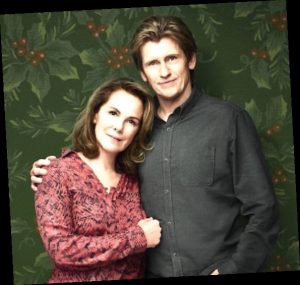 EDGE: In the FOX series The Moodys, you play Ann Moody, an alcohol counselor. There’s a personal story behind that.
EDGE: In the FOX series The Moodys, you play Ann Moody, an alcohol counselor. There’s a personal story behind that.
EP: I asked them to let my character go back to school and become a counselor because of what my mother had done. She was a pianist and then she became an alcohol rehabilitation counselor. She had played in a series of bars and was in that scene, became a full-blown alcoholic throughout most of my childhood, and then got sober when I was 18 or 19 years old. She completely turned her life around, went back to school, got her degree and became a counselor. Sobriety has been a big part of my life, and so is recognizing that and honoring that in people and in my family, and in myself. It was a real inspiration for my character on this show for that very reason.
EDGE: Your mom was an entertainer at heart. Did that influence you early on?
EP: Oh, 100 percent. My mother used to play the piano and I would stand next to her and sing. She always encouraged me to do the things that she couldn’t—or wouldn’t, or didn’t—and was really an impetus for me to get on stage. She introduced me to local theater in our small town in Massachusetts and was always my inspiration. She would say to me, “I wish that I had done that when I was your age.” Because she was a natural performer…and the funniest person I’ve ever known in my life. She was sarcastic and raucous and bawdy. She was just no-holds-barred, with a great deal of confidence. I think that my sense of humor comes directly from her mouth. For sure.
EDGE: You began your career as a stage actress, correct?
EP: Oh, absolutely. I went to drama school in Chicago at the Goodman School of Drama, which now has been incorporated into DePaul University. But when I went there, it was a conservatory, and I think we had a graduating class of 12 people. When you’re in that kind of training program, specifically back then, they weren’t training you for television and film. We didn’t have on-camera classes or how-to TV audition classes. It was primarily performing on the stage. I had really not thought about film and television. When you come from a conservatory mindset like that, it’s all about the theater. I was lucky enough—and I’ll use that word lucky, because luck does play a huge part in any actor’s life—to be seen. I went to New York solely to do theater and was cast on Broadway. That was 100 percent luck and being at the right place at the right time. I was proud of myself working on Broadway, being young in my twenties, in New York.
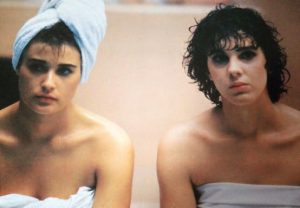 EDGE: Then came About Last Night (above), with Rob Lowe, Demi Moore and Jim Belushi…
EDGE: Then came About Last Night (above), with Rob Lowe, Demi Moore and Jim Belushi…
EP: Again, I just lucked into that first film audition, which I think it was 1985. It had never occurred to me to do film and television, and I was perfectly fine without it. I just fell into it. When I did About Last Night, I’d never been in front of a camera before. I’d never done a commercial or a day part. I’d never even done a student film before, so I sort of faked my way through it. I remember arriving on the set and they were using terms that I’d never heard: your mark, the POV, the cheap shot, over-the-shoulder. I just was like, “I’m going to just fake it till I make it.”
EDGE: And you did. You were listed as one of the “12 Most Promising New Actors of 1986” in Screen World, which was a huge deal back in the pre-Internet and pre-IMDB days. Did you feel some pressure at that point to keep the momentum going?
EP: I felt a little overwhelmed. The film got a lot of attention and the way I looked at it was like, “Well, that’s intense.” But it resulted in me getting more work. I had been living in New York in my twenties and everything was expensive, and I wasn’t making any money. It just translated into, “Oh, I can buy my mom a car!” That’s when I started buying my mom her cars, and I bought her a new car like every five years for the rest of my life, until she passed away a few years ago. Then I remember thinking, “I can buy my mom a house…I can do all these things. I can now help take care of my mom the way she always took care of me.” So it was a blessing. I was 26, but I think I had a pretty good head on my shoulders about it, and I knew these things come and go so quickly. It’s like that great line in Notting Hill: “Today’s newspapers are going to line tomorrow’s canary cage.”
EDGE: Not everyone in that situation would respond that way.
EP: If you’re in it for a certain amount of notoriety, yeah, that could sway how you respond to that attention. A lot of actors who think, Oh, I’m the hottest thing right now—and they actually think that’s going to last—just aren’t really living in reality. Hype is so fleeting, and all you can really do is focus on the work. I’m from a really small town in Western Massachusetts, so all of this was just great [laughs]. I’ll take whatever I can get! I remember when I was making The Flintstones with Rosie O’Donnell, she was hanging out with Madonna at the time and she said, “You could just be so much more famous than you are. You should come out with me and Madonna… you could be super famous. Your career could be so much better than it is right now.” And I remember thinking to myself, I like my career right now. [laughs] I work all the time, but I’m not one of those people who’s surrounded by paparazzi. I work with great people. I make good money. I’ve got four children. I support myself. I’ve supported my parents. Yeah, I guess you could be wanting to be in that level of superstardom…or you can just be really grateful for what’s in front of you. I think that’s sustained me. I’ve been doing this for over 35 years, and I’m good.
EDGE: One of your earliest film roles was opposite Tom Hanks in Big. In 1988, it was an innocent family-friendly fantasy film. Do you think the relationship between your adult character and Josh, who was still a 12-year-old boy, would be done the same way?
EP: Oh, I get questions about this all the time, because we have sex in the movie. He kisses me and touches my breasts, and it was a whole thing. Yeah…we wouldn’t shoot that movie like that today, 100 percent. I’m not sure I feel strange about it in hindsight. That scene was primarily to set up the joke of the next day at the office, when the elevator opens and he walks out like, Oh, I’m a completely changed human being. It in no way indicated any kind of untoward, Oh, she’s having sex with a minor. Based on how we have grown for the good as a society, that scene would probably not be acceptable, period, so I own that. And I’m sure Penny [Marshall, who directed the film], before she passed, would own that as well.
EDGE: Do you view the heightened sensitivity towards entertainment as being a change for the better?
EP: I think when change happens, societal change happens. It goes to the extremes in many different directions and then eventually it finds its home. The change that’s going on now is very necessary, but I do think we’re all still finding our footing there. In terms of certain norms that have gone on for decades, it’s a hard change for everyone, particularly people who’ve been writing or directing or creating for years. But it’s a necessary one. My daughter works in development at the Geena Davis Institute for Gender in Media and she’s my touchstone for all of it. I’m 60 years old. I’ve been doing this since I was in my early 20s. And every time I have a question, I call her and I say, “What do you think about this?” It’s all a big change for me, too. I really applaud my daughter, because she’s at the forefront of working for an institute that is dedicated to equality and inclusivity and diversity. And it’s really needed, and it’s overdue at this point.
EDGE: Is comedy something that you’ve always enjoyed digging into, or was it more of an acquired passion?
EP: Oh, I adore doing comedy. If I could do comedy all the time, I would really be in a sweet spot. Sometimes I feel like I’m always given the job I need at the moment I need it. Prior to doing The Moodys with Denis Leary, I had done all these really dark things. I did a show called Sharp Objects with Amy Adams and Patricia Clarkson. That was so dark. Then I did a show with Aaron Paul and Octavia Spencer that was just Nazis and prison and racism. And then Trump was in office and the pandemic hit, and I’m doing comedy. If you just stay in these dark pieces, you bring it home with you. I do, anyway. So I just feel blessed that I’m making a comedy in the middle of all of this stuff. I’m like, “Okay, universe, you’re giving me exactly what I need.” [laughs]. It’s great to wake up in the morning and know that you’re going to go to work and laugh—I’m so blessed to be working with Denis and Jay Baruchel, who plays our oldest son. Jay is just wicked good. He’s incredible. We’re having such a good time that none of us wants to leave.
EDGE: What specifically hooked you into The Moodys?
EP: Denis Leary. Denis and I grew up about 30 miles away from each other. Chelsea Frei, who plays our daughter, grew up another 30 miles away, and Jay Baruchel is from Montreal, which is like four hours away. So all of us really have this same sort of—I’ll use the word “wicked” because that’s New England lingo— sense of humor, and we’re all from working-class families. So, when the creators sent it to me, they said, “There’s not a lot on the page right now, but we’d love you to do this.” And I said, “Well, can I make her like me?” And they were like, “Yeah.” So they were gracious enough to let me infuse my own life into it. I feel like this is the first time that I’ve created someone who’s really based on me, a woman with older children who are still in and around the house, who’s trying to reinvent herself all the time—which happens when you go from being a mother to being an empty nester. I was able to infuse parts of my mom into it, and so it was the first time I’ve been able to have open season on a character that the creators really allowed me to make my own. At my age, it was really a little gift for me. I took it and ran with it, and I’m having a ball.
EDGE: Would the prospect of creating your own character have frightened you earlier in your career?
EP: Oh, yeah. But everything is scarier when you’re younger.
EDGE: Why does it work so well now?
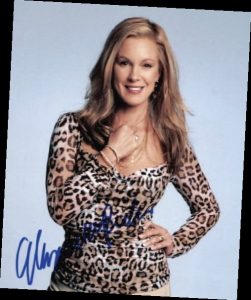 EP: When you get to be a certain age, you don’t care what people think anymore. You just don’t. You’ve been around for long enough to just say, “I am who I am, and I’m proud of who I am.” I love these parts of myself, and I want to share them because I think I’m really great. I do. I love my life. I love my husband. I love my kids. I just feel like I’ve been given so many gifts. And now I’m getting to play a really great part of myself. A lot of people don’t get an opportunity like that, so I adore my creators and Denis for bringing me along on this. They’re allowing me to be nutty and obsessive and fun—a woman who maybe has too many glasses of wine, or maybe overdecorates the house at Christmas, who might be a little bit cloying at times when it comes to her children. These are all real facets of me.
EP: When you get to be a certain age, you don’t care what people think anymore. You just don’t. You’ve been around for long enough to just say, “I am who I am, and I’m proud of who I am.” I love these parts of myself, and I want to share them because I think I’m really great. I do. I love my life. I love my husband. I love my kids. I just feel like I’ve been given so many gifts. And now I’m getting to play a really great part of myself. A lot of people don’t get an opportunity like that, so I adore my creators and Denis for bringing me along on this. They’re allowing me to be nutty and obsessive and fun—a woman who maybe has too many glasses of wine, or maybe overdecorates the house at Christmas, who might be a little bit cloying at times when it comes to her children. These are all real facets of me.
Good girls don’t trade a future in medicine for a career in comedy. If that’s not an old saying, maybe it should be. Or maybe not. Retta, who stars with Christina Hendricks and Mae Whitman in the NBC “dramedy” Good Girls, veered off the pre-med track at Duke to work as a stand-up—and then parlayed her success on the stage into an iconic role on Parks and Recreation. Though not exactly a prescription for Hollywood stardom, in Retta’s case, it produced a positive outcome, and the rest is history. The daughter of Liberian immigrants who settled in the Garden State, she brings a unique work ethic to the characters she plays and, as Gerry Strauss discovered, a healthy dose of Jersey swagger, too.
EDGE: How have you been keeping yourself safe and sane during the pandemic?
RETTA: I’m a big old scaredy-cat, so at the beginning of quarantine, every little thing I thought I had it. Sniffles? Oh, I got it. Cough? Oh, I 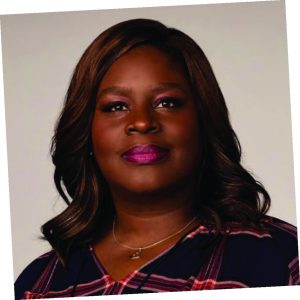 got it. I got an ache? Oh, I got it. My eye’s twitching? [laughs] It’s COVID! So then I had a friend tell me to download the Calm app and meditate, so I did that for a while. What really helped me was just that I didn’t watch the news anymore. Honestly, that helped me a lot. But in late November, I had knee replacement surgery. So I went back into stress mode. It’s been a real ride!
got it. I got an ache? Oh, I got it. My eye’s twitching? [laughs] It’s COVID! So then I had a friend tell me to download the Calm app and meditate, so I did that for a while. What really helped me was just that I didn’t watch the news anymore. Honestly, that helped me a lot. But in late November, I had knee replacement surgery. So I went back into stress mode. It’s been a real ride!
EDGE: You’re dealing with things from a West Coast perspective now, but fans of yours know that you are originally a Jersey girl. Any thoughts on growing up in the Garden State?
RETTA: I think it was pretty typical in that you just tried to fit in, tried to get to the mall on the weekends where all the kids hung out. I have immigrant parents, so home was a little different than my friends.
EDGE: How so?
RETTA: Like with schoolwork. I remember friends getting cash for grades. You get $10 for an A, and $5 for a B, and a dollar for a C. [laughs] I was like, first of all, you get money for a C?
EDGE: Did you not enjoy yourself in school?
RETTA: I liked school, but it was very much centered around doing well so that you could go to college. So school was very important for me. I think it’s part of the immigrant life. Not that I didn’t socialize, because I was very active in school—I was on student council and the choir and a cheerleader. French club, math club. So I was busy, but I didn’t party or anything like that. So, in that regard, I didn’t really experience the high school partying life, but I was so busy with everything else I don’t know that I really even noticed it until I was older. I got the high off of the good grades.
EDGE: Success in science and in comedy both require a lot of hard work and patience. Do you think the work ethic you developed for one helped you in the other?
RETTA: It did in that I’m an empirical thinker. I’m that person: If you want to do something, what are the steps to do it? My goal was to have my own sitcom. So I watched a lot of sitcoms. I noticed that most of the leads in sitcoms used to be stand-up comedians, which is why I started stand-up. I was like, Oh, that’s the path that Roseanne, Tim Allen, all these people took. That must be the way to do it. So that’s why I started. Also, I’m a big fan of checking things off of a list. That’s something that has stayed with me since high school, where it’s like you have all these things to do, and if you don’t do them, you’re not going to get the grade. So that’s another thing that I still do. I love a list, and I love checking stuff off of a list. That kind of thing has stayed with me. I certainly feel like I work harder now, just because being a lead in a show requires more work. You have to spend more time learning lines. You spend more time on set, that kind of thing. But because I know this is what I really want to do, it’s not hard work to me. I get to go do the work I love as opposed to “needing” to study.
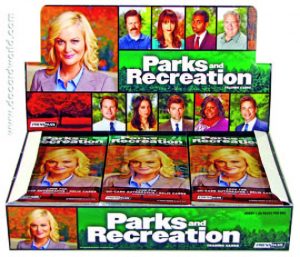 EDGE: It doesn’t sound like you had a mentor or a role model when you launched your entertainment career.
EDGE: It doesn’t sound like you had a mentor or a role model when you launched your entertainment career.
RETTA: I don’t know that I got any advice, really. I used to read Entertainment Weekly and People magazine cover-to-cover, and I would just hear different things. One thing I remember was that people would always say Sandra Bullock was really great with the crew. It made sense to just be a good person and be the kind of person people would want to be around. That was something that stuck with me—but it wasn’t necessarily an advice thing. I will say, while working with Amy Poehler [on Parks and Recreation], one of the things I realized that we had in common was that we always believed it would happen. There was never a doubt that I would get to where I wanted to go in this industry. For me, it was just an anxiousness as to when. How long was it going to take? I remember being in the hair and makeup trailer one day when we were at work, and Amy and I had a conversation about how we always just knew. I think it made it easier to deal with whatever struggles we had on our way up because, in the back of our minds, well, we knew it’s going to happen. I think that made being here and living in a studio apartment or sleeping on a friend’s floor fine, because it was just an interim part of what was to come.
EDGE: Speaking of Amy, how did you first get cast on Parks and Recreation?
RETTA: I got a message from my manager at the time that I had an audition for a new sitcom. It was going to be kind of like The Office in that it was a mockumentary, and one of the creators was the creator of The Office. I went in, I read for the room, which included Mike Schur and Greg Daniels and a couple other people and some casting folks. I was never a great auditioner. I hate auditions. I get sick to my stomach. But I’m good in a room just chatting. At the end of my audition, I had just gotten this watch and it was very blingy. It was one of those things—they call them toy watches—and they’re just super shiny, they’re ridiculous. I remember Mike Schur being like, “Hey, cool watch.” Oh my God, I gave him a good ten minutes on the watch: “You have to be invited to be a member. If you email me, I will submit you to be invited.” He was like, “I’m all good on the watch.” But I was chatty, and I think he thought it would be funny, like he could bring that into the character. Now, mind you, my character Donna did not turn out to be the chatty lady who was trying to sell you a watch, but I think it made me seem funny in the room outside of the read. So I credit my audition success to me being able to talk about this stupid watch for so long. [laughs]
EDGE: Donna grew into a primary character on the show. What did you admire about her?
RETTA: I love that she was very independent. She knew what she wanted and there was nothing that was going to change her mind. She wasn’t going to be persuaded out of something. I appreciated most of the characters in the show—how loyal they were to each other and how supportive they were. I loved that about the friendships in general on the show, and that Donna knew what she wanted and she was going to get it by crook or by hook.
EDGE: Fans of Parks and Rec—and of internet memes in general—are familiar with one of the show’s most famous catchphrases: TREAT YO’ SELF. Did you ever think that this made-up holiday would stand the test of time?
RETTA: Nope. Sure didn’t. I was not really good at reading. I just tried to make it real for me. I never could tell when something was going to be funny. I remember my friend, Brittany, was on set that day visiting me, and she was there for the talking heads with me and Aziz [Ansari]. She was like, “Ooh, that’s going to be really funny. That’s going to be huge.” I was like, Really? It’s just silly Tom and Donna stuff. And she’s like, “No, trust me, it’s going to be huge.” I was working this one night, and I just remember getting a lot of tags on Twitter. I was like, What is going on? because I didn’t really do Twitter that much, but I just remember getting blown up. When I got home, I saw that it was that episode. Then I looked on Twitter and I saw that everybody was tweeting TREAT YO’ SELF and tagging me. I was like, Whoa. Right!
EDGE: You do a ton of voice acting. What makes that type of work appealing to you?
RETTA: Well, the best thing about voiceover work is no hair and makeup. I don’t even have to leave the house now! But voiceover is something that I really wanted to do, particularly when I was doing stand-up, because when you first start out, you’re not making a whole lot of money. If you can get voiceover work, or commercials, you can kind of like float by while you’re still trying to make the stand-up work. So it’s something that I really wanted, but I didn’t really get a lot of opportunity. I didn’t have a voiceover agent. I didn’t really know exactly how to do it. Once you start getting viability from things like Parks and Rec, then stuff starts coming in, so I started getting more auditions. I think the first thing that I booked was a Nickelodeon thing, and I was so excited, but I had been auditioning forever. It finally clicked like five or six years ago. And even so, it wasn’t like I 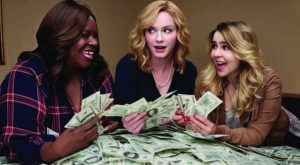 was getting a whole lot of regular gigs—I just got my first commercial voiceover during quarantine, and it was the most exciting thing ever, doing the Rocket Mortgage commercials. I’m like, Woo-hoo, that’s me! I literally pause it and watch it. I watched the commercials to hear my voice. It’s like, you’re on TV, you have a show that comes on weekly. But there’s something about the voiceover commercial that excites me.
was getting a whole lot of regular gigs—I just got my first commercial voiceover during quarantine, and it was the most exciting thing ever, doing the Rocket Mortgage commercials. I’m like, Woo-hoo, that’s me! I literally pause it and watch it. I watched the commercials to hear my voice. It’s like, you’re on TV, you have a show that comes on weekly. But there’s something about the voiceover commercial that excites me.
EDGE: What do you enjoy about Good Girls and your role on the show?
RETTA: It was the first time I felt that I got to play a fully realized character. When I read it, I knew exactly who the character was based on in the pilot script. I literally cried reading what she was going through. It gives me so much joy and satisfaction to feel like I’m playing a person that lives in the world. I was all about comedy when I first came out to LA, so it wasn’t something that I really even thought that I would need. But I read this script and was like, God, I would love to play her. It just excited me that there was a chance that I would get to play this character that had her family, and loved her husband, and was going through trials and tribulations, but was still trying to be happy—and none of it was based on her weight or anything like that.
EDGE: Good Girls has built a following thanks to its drama and dark humor. With Season 4 here, for those who are late to the party, why should they binge the first three seasons to catch up?
RETTA: It’s got heists. There are cliffhangers. There’s comedy. And you’re right, it can get dark—particularly Season 3, where even we were freaked out when we were reading the scripts. I think it takes you on a ride that you don’t expect.
EDGE: A lot of parents of college-age and twenty-something kids read this magazine so I have to ask, how do you go from Duke pre-med to stand-up comedy?
RETTA: When I went to school for the first time, living out of my parents’ house, the first time making my own decisions—when to do laundry, when to go to bed, that kind of thing—I liked that. I got to kind of learn about myself and what made me happy. When I graduated from Duke, I still wanted to go into medicine, but I kind of wanted a break. I knew that [med school] was going to be intense, so I wanted a break before. I took the year off, but I was too afraid to leave science, so I stayed in North Carolina and did chemistry. I mean, some people would be like, really [laughs] that was your break? But that was the first time I lived alone and was left with my thoughts. Which is when I realized what I really wanted to do, which was to perform.
EDGE: Was that a difficult decision to explain to your family?
RETTA: Not so much. I mean, my parents, as immigrants, tend to be very like focused on education and going into the professional fields that are lucrative enough to support you—you know, doctors, lawyers, that kind of thing. But my they were still supportive. I remember calling them and saying, “I think I’m going to drive cross-country to LA.” I had already told them I had started stand-up. My mom said, “Don’t embarrass your father…you’re carrying around his last name.” Which is part of the reason why I dropped my last name. She also reminded me that I’d spent four years in college, so don’t waste it. “If you’re going to do it, do it,” she said. “Don’t half-ass it and just play around.” My father’s big thing was whatever you do, get health insurance…because we can’t afford to take care of you if something goes down.
EDGE: And what did he say?
RETTA: “Drive safe and don’t call us if you get into an accident.” 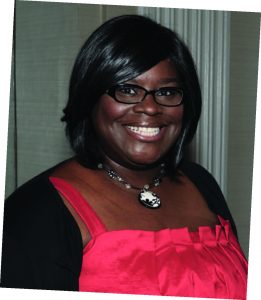
Editor’s Note: Retta, aka Marietta Sangai Sirleaf, was born in Newark and grew up in Middlesex and Monmouth Counties. She graduated from Duke in 1992 and launched her stand-up career in Raleigh, North Carolina. She made her TV debut on a 1997 episode of Moesha and her movie debut in the 2002 cult classic Slackers. In addition to Parks and Rec and Good Girls, Retta also had a recurring role on Girlfriends’ Guide to Divorce with FOE (Friend of Edge) Lisa Edelstein.
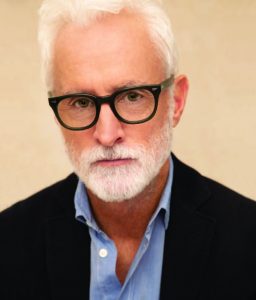
Fox Broadcasting Company
There is an art to delivering a scripted line and John Slattery has all but mastered it. When his characters speak, we not only listen. We want to know everything about them. As Roger Sterling on Mad Men, he offered a window into the brand-building culture of 1960s America and, as Paul LeBlanc in the new Fox series neXt, he is our guide to the chilling prospect of artificial intelligence run amok. Gerry Strauss was curious about the origin of Slattery’s talent for boiling down big television and film concepts into elegant, intimate and often funny moments. Not surprisingly, it was honed live on stage.
EDGE: What drew you to acting as a young man?
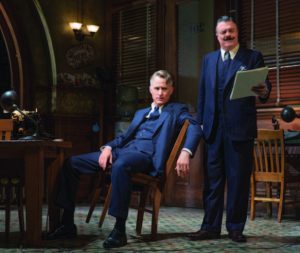
Broadway.com
JS: I watched a lot of movies and TV when I was a kid and, somewhere in there, I realized that people were actually doing this as a job…and maybe I could do that. I had to apply to college somewhere and there was a school—Catholic University in Washington, DC—that my sister had gone to. I was not a very good student and my options were probably not that great. It was the only place I applied. If I didn’t get in there, I was going to have to figure something else out. I got in and they had a theater department, so that’s how I started.
EDGE: Your stage résumé is very extensive. Do you actively pursue theater work in between your television and film projects?
JS: Absolutely. One of my favorite things is to be able to do various disciplines. There are different rhythms to all of them. When I went to New York, my first legit jobs were commercials and stuff like that—which are great jobs to have and you learn a lot. But as far as acting, I learned on the stage. It’s thrilling and difficult in a different kind of way. It tests you and your ability to repeat the whole process every night and rehearse for a sustained period of time. So it’s just completely different than anything involving a camera. Hopefully, that is something that people will still be able to do.
EDGE: How did John Slattery become Roger Sterling?
JS: Matt Weiner saw me in a play. I was doing Rabbit Hole on Broadway with Cynthia Nixon and Tyne Daly. I went in to read for the part of Don Draper; that’s because the part of Roger didn’t have a lot to do in the pilot. And then, after I read a couple different times and did my homework and prepared, he said, “Well, here’s the thing…[laughs]…we have that guy already.” That actually happened. Matt claims that I was in a bad mood the whole time we shot the pilot because I didn’t think that my part was good enough, and my nose was out of joint because he made me read for Don Draper.
EDGE: Were you in a bad mood?
JS: I don’t know. But I probably had one foot out the door, because no one knew what Mad Men was going to turn out to be, since AMC hadn’t done very much original programming. Anyway, Matt promised me it would be a great part…and it was.
EDGE: When the series concluded, were you concerned that future projects might not meet the untouchable quality standards that you’d become accustomed to as a part of that show?
JS: No, not even a little bit. I’m not looking for Mad Men. I’ve done that and I had a great time doing it. I never expected it to happen in the first place, and I don’t expect it to happen again. That said, I went on and did Spotlight, which was pretty great—great circumstance, great people. I just try to find the material that speaks to me. Sometimes it works out and sometimes it doesn’t. But that’s okay, too. If you can find something that satisfies you, then I’m good with that.
EDGE: You’ve played a lot of bosses and high-ranking employees. Does each take a particular kind of preparation?
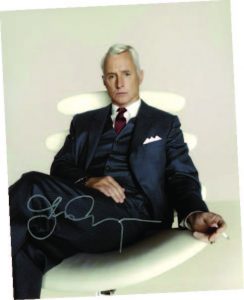
Upper Case Editorial
JS: I’ll do my research, the required homework in order to make myself as convincing as possible. But people are in positions of authority for all kinds of reasons, whether they know their job, or whether they they’re just good with people, or whether their brother-in-law runs the company. For example, in Mad Men, I played a guy whose name is on the building, but it’s because his father founded the company. However, If you said that to him, he’d say, “What does that have to do with anything? Are you trying to tell me that I don’t know how to do my job?” There isn’t any one quality that is required to have that job.
EDGE: neXt has been quite the addition to Fox’s lineup this season. What appealed to you about the concept of the show?
JS: The character appealed to me because this guy created this artificial intelligence, and he immediately recognizes the potential dangers of and tries to lock it away. In his absence, it’s unlocked and plugged into the internet and it starts to run amok, and he’s trying to warn people how dangerous it is. I was interested in exploring how do you describe exponential growth and tell someone the planet’s burning? So he’s trying to describe to people how super intelligence works and why it’s dangerous. You give this thing an order on Friday and over the weekend it learns the 20,000 years of human history—you think it might take issue with you being its boss on Monday morning? I say a line in the show—“You know, in your lifetime, you’ll kill maybe 100,000 bugs with your car. You don’t mean to…they’re just in the way. That’s what we are to this thing.”
EDGE: People look at your character Paul like he’s crazy.
JS: Because he is kind of crazy. He has this brain disease, and he’s hallucinating and he’s paranoid and he’s anxious. People are put off by him and don’t really want to listen to what he has to say. So it’s that combination that made the whole role a really interesting exercise—and makes it a thrilling show. You asked the question about how I approach playing people in positions of authority? So I don’t know anything about super intelligence. I read a couple of books and watched Sam Harris give a couple of lectures. I listened to Elon Musk and Bill Gates trying to explain it. You go So how do I do that? I had to learn how to get my mouth around some of the technical terms that that need to be second nature to my character and I have to communicate with a degree of authority—as well as an off-handed quality—that really smart people have [laughs].
EDGE: With so much streaming content that gets binged and forgotten until a new season drops, do you think there is a benefit to having series like neXt air one episode a week—so that suspense builds, storylines develop and buzz gets generated?
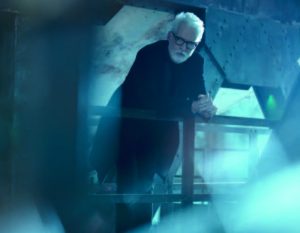
Fox Broadcasting Company
JS: It’s a good question. I just finished watching a show called The Bureau. It’s a French spy show. They had already made four seasons of it, so I binged four seasons of it. I thought there were five and was expecting to watch the fifth next, and then I realized that the new season hadn’t come out yet. Then, the fifth season was on week to week [laughs] so I had to watch the thing every week and wait for them one at a time. I was kind of pissed in the beginning, but it didn’t keep me from turning it on. You can binge something and you can crank through the story in a couple of days, which is great. But there still is that anticipation if you know how to hook the audience. You’ve got to have a good couple of shows up top, kicking the thing off and setting the hook as it were to the audience—which I think we do. You’re not trying to manipulate anybody, but you’re trying to get them interested in the story you’re telling. There’s so much entertainment out there, and people’s lives are so filled with media of one kind or another, that it’s hard to make a dent. I think this show does. I really do. And I think it’s more timely now than when we made it six months ago.
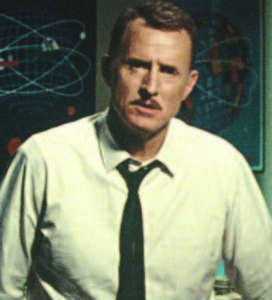
Marvel Studios
Fans of the Marvel Cinematic Universe know John Slattery as Howard Stark, Tony Stark’s father, a character presented in flashbacks since he was murdered before the current-day setting. How did John land this role?
I wasn’t a big comic book fan—not since I was a kid, so I really didn’t have that much of a pull towards it. I got a call from Jon Favreau, who directed the first two Iron Man movies. “Do you have any children?” I said, “Yeah…”, and he said, “You have to do this then. I mean, how are you going to tell your kid that you had a chance to play Howard Stark and you turned it down?”
When I did scenes with Robert Downey, there’s a script and we rehearse it and then we change it. It wasn’t like a total improv, but there was a lot of stuff that we were just trying to figure out. You have to figure out the best way to tell the story of the film and try to figure out where the scene lives. It was really fun to do that with Downey and the Russo brothers, who are such smart guys.
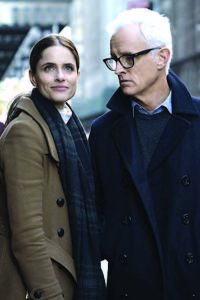
Amazon Studios/Prime Video
Is it fun for you to pop into an episode of The Romanoffs or a film role that doesn’t involve a long-term commitment?
Yeah! Variety is part of the reason I went into this business. You can play different people and learn to do a variety of different jobs, but you don’t have to actually stick with them. Sometimes the short assignment can be preferable, depending on where my life is at the moment. Sometimes it’s tricky because you don’t have as much information about the story to go on. Then again, you have to remember that because a show like Mad Men happens one scene at a time, so you don’t really know a character in its entirety until you get to the end.
At a time when everyone in New Jersey needs a good laugh, we couldn’t think of a better go-to guy than Jason Alexander. From his New Jersey roots to his magnificent run on Seinfeld, he embodies the kind of honesty, vulnerability and humor that are the foundation of great entertainment. Gerry Strauss asked Jason about the myriad stops on his show business journey, and where he hopes to go from here. We think his answers will make you smile.
EDGE: What do you think it was about growing up in New Jersey that helped set you up for success?
JA: There are probably two things I could point to. One is sort of general and one is specific to where I grew up in Jersey. What I’ve found as I travel across the country and around the world is that places have a kind of a rhythm and a music to them. New York has an accent. New York has a rhythm. LA has an accent. LA has a rhythm. You can say the same about many places throughout the South or in New England. Jersey actually does have a kind of a distinct music to the accent, and a rhythm that you don’t really find other places. It’s not quite as pugnacious as New York. Not quite as tough. But there’s a certain kind of a bravura to Jersey.
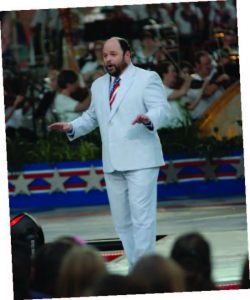
Boboroshi – John Athayde
EDGE: And a sense of humor…
JA: It’s self-deprecating, and we sort of taunt each other on what could be soft spots, but it’s all done with love and affection. Nothing really has a malicious intent. So there was this sense of humor and attitude about Jersey that I think I was steeped in growing up—and that in some ways informed a lot of some of the early characters that I was asked to do. It wasn’t honest, because if people really knew me, they knew that I was kind of a shy, intimidated kid, but I had a cover for it that had a kind of a Jersey swagger to it. And so people who didn’t know me well thought that I came off as not only rock-confident, but somehow cocky. I think initially that gave people a sense of confidence about hiring me that was totally disproportionate to my ability [laughs]. I think it was all just swag. So, I think that may have served me well.
EDGE: Your move from Maplewood to Livingston was a game-changer, too.
JA: I was 12. In the initiation process of being a new kid in a new town, the first kids that picked me up were these theater kids, because Livingston had this really active financial and community support for the arts. There was an organization called the Livingston Teen Theater. It was not affiliated with any of the schools. And just like a sports team, it was financed by the community and it was given resources by the community, and that was my entree into the theater. Those kids, that organization—the first two or three shows I ever did in my life—was right there in Livingston, through the auspices of that teen theater. Those kids became my friends. They became my community. And with those kids, I began going to the theater in New York and seeing what the mecca of American theater could offer and getting inspired by that and eventually aspiring to that.
EDGE: Did you start with the distinct focus on making it as a stage actor?
JA: When I was a kid standing in my living room holding the hairbrush and accepting it as the award, it was always the Tony award. It was not an Oscar or an Emmy. So, my focus was really on how great it would be to be able to have a career in the Broadway theater, if that was possible for me. The truth is, my first professional jobs were in front of cameras. I got into my first acting union by doing a pilot for a children’s musical theater sort-of television show idea, and then my first professional jobs after that were television commercials. So I was professionally performing in front of cameras before I was professionally performing in front of audiences. But I was always into the theater, and then everything else that happened was a happy accident. I did think I was going to be more of a dramatic actor than a comedic actor. I don’t know why I thought that…I guess because I didn’t think of myself as particularly funny, and I was impressed with actors that seemed to have this great command and power on stage. I thought I could emulate that. Because I was delusional—I didn’t look in a lot of mirrors when I was a young man. I didn’t see that I was five-foot-five and 30 pounds overweight and already balding at the age of 18. So, it had to be pointed out to me later in college, and I started to understand perhaps comedy might have more opportunity for me.
EDGE: Who inspired you during those formative years?
JA: They were an odd group of actors. I became interested in acting at first by becoming a Star Trek fan and being completely smitten with Bill Shatner as Kirk. That over-the-top, large, hyper-masculine, hyper-theatrical approach was something that really appealed to me. I started going into New York to watch theater with these kids I was doing teen theater with. One of the earliest shows that we saw was a matinee of the original production of Pippin. Ben Vereen came on that stage and he was so charismatic and so mysterious and so powerful and magical that I thought, “Oh, wow. That’s the kind of musical work I’d like to be able to do.” I remember seeing James Earl Jones do King Lear in Central Park, and that was burned into my brain as one of the great performances. So, there were those kinds of actors that I wanted to emulate and then aspire to.
EDGE: So with this intense focus on stage acting, what actually led you to television, and then landing on Seinfeld?
JA: Like most actors, you get led by the nose of opportunity. I never made any hard-and-fast rule about doing or not doing film or television—or anything else that came along. I was a young guy, a working actor, and just about any opportunity to make a living was okay by me. I was very fortunate in that a lot of the stuff that came my way, even if it wasn’t the most successful projects in the world, I got to work with extraordinary people. So, take my first Broadway role. Merrily We Roll Along was not a successful production, but it’s Hal Prince and Stephen Sondheim and George Firth and Paul Gemignani and Ron Field—extraordinary, extraordinary people to be tutored by. I had the ability to learn from Neil Simon and from Jerome Robbins. So, that was just very fortunate. But that turn to television and film, to the extent that it happened, was never something I could plan. There’s a casting director in town, they saw you on stage, they think you might be viable. You go in, you meet a director or you put something down on tape and the dice roll. With Seinfeld, there was no magic formula. It wasn’t through connections that I’m aware of. It was literally that they had seen a ton of people in LA, they hadn’t found anyone that they quite clicked with, for whatever reason. They called a New York casting director who knew me and said, “This is the kind of guy we think we’re looking for. Put twenty actors on tape.” And I was one of the twenty guys. If she hadn’t thought of me, my guess is that I wouldn’t have been part of Seinfeld. So, it’s all just happy circumstance, until you start getting to a point where you can kind of guide or nurture your own choices.
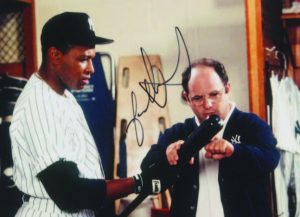
Upper Case Editorial
EDGE: Not a lot of actors have that freedom.
JA: I think there’s only about forty of them in Hollywood who are picking and choosing what they’re going to do next—and then actually get it done. So, you’re a leaf in the wind and you’re constantly casting yourself out there and hoping somebody will pick you up, and whatever medium it’s in is fine. If it’s good people and a worthwhile project, you go forward and then you see how fortune treats it.
EDGE: Since Seinfeld was taped live in front of an audience, did you look at it as a form of theater?
JA: Very much. Yeah, absolutely. Multi-cam sitcom is closer to theater than it is to other kinds of television or film. In single-camera filmmaking, I’m always aware of the camera. In fact, I’m always probably a little too aware of the camera. Really fine film actors are able to just ignore the camera. They don’t see it. It’s not there for them. They’re neither compelled nor intimidated by it. I’m always a little aware of the camera. But in Seinfeld in particular, or multicam sitcoms in general, the cameras are a good distance back. There are three or four of them, and you’re not really playing for them; you’re not having to hit tape marks in quite the same way. You are really much freer to exist and play the scenes to that live audience. So, for me, it was always a more theatrical experience than a filmed experience.
EDGE: George was a “big” character, very theatrical.
JA: All those performances are quite large, which was great because I was always playing for the live audience—which was a hundred feet away. The cameras were only twelve feet away, so, initially I was concerned that my performance was just too big for a television screen. But the size of the Seinfeld show, the size of that comedy, was very friendly to someone who works as large as I do.
EDGE: Given that all of the cast members came from different backgrounds, was it difficult to establish that great chemistry?
JA: No, not really, although I totally appreciate what you’re saying about the different journeys that we all took before we got to that show. That’s certainly true. The only conversations I ever had with any of them about how do we do this was during the pilot, with Jerry. We were rehearsing a scene in the diner, and I remember Jerry saying, “Hey, when we were writing this, we kind of heard a different reading here and there. Would it be okay if I told you how we heard it?” And I said, “Absolutely, absolutely. Please tell me how you heard it. And if I understand it, if it makes sense to me, I’m happy to do it…If it doesn’t make sense to me, you may have to explain it to me, or we may have to talk about it. But, absolutely. I’m not an actor who is afraid to hear a line reading—if that’s the best way you can make me understand what your intention is.” Then I said, “Conversely, can I talk to you about what the hell you’re doing in this scene? Because you and I are having an argument but you’re not really fighting on your side. So, I’m punching into Jell-o. To make this really fly, you’ve got to kind of stand up to me a little bit more.” And so, in that moment, the quiet agreement that Jerry and I had was that he would help me be funnier and guide me towards the character of George that they had in their head…and I would be given an opening, considering Jerry was my boss, where I could say, “You need to try to get more out of this, or the scene isn’t going to work. There’s nothing I can do if you don’t do that thing fully.”
EDGE: That was the only time you had that conversation?
JA: That was the only time any of us actually talked about how would we work together. The rest of it really was the best arranged marriage I could ever point to. There is no reason—given how different we are as people and how different our journeys were to get there—why this ensemble of four would click the way it did. I can only tell you, from my memory and my vantage point, that I just enjoyed watching everybody work. I enjoyed being there so much. I enjoyed how wonderful they were at what they were doing. And you know it was true of Jerry, as well. Because you see him smiling through every episode in the early ones. I think it was the fact that we enjoyed watching each other that made us support each other’s moments. There was not a sense of, He’s got more lines than me or She’s got funnier stuff to do. It was all We’ve got great stuff to do and look how we get to pass this ball back and forth. This was unusual because the show was not a hit at first. So, generally, you would think everyone would be all hands for themselves, grab what you can get. This ship’s going to go down and I want to be the one holding the life preserver. But there was really more of a sense of No, we’re in this together and let’s have fun while we’re here. And so that sense of unity and that sense of ensemble and that sense of selflessness established itself very quickly and very organically, and we never lost it.
EDGE: Rehearsals must have been fun.
JA: We were always a group that enjoyed coming to work—we enjoyed rehearsing. We would rehearse, I think, more than a lot of successful shows did. We would spend an hour or two or three on a scene trying to see if there was anything else we could get out of it and do with it. Jerry himself has an amazing work ethic as a comedian, and we all kind of came to the process with a similar intensity and purpose and dedication, and it all just clicked that way.
EDGE: Everyone has their own favorite Seinfeld episode or moment. Is there one that stands out to you in how it played to a live audience?
JA: Well, there is one that I’m sure we would all point to, because it was insane how well it worked. In the “Marine Biologist” episode, Jerry had convinced an old girlfriend that I was trying to get reacquainted with that I’d become a marine biologist. So I was trying to live up to the lie that Jerry had established. The end of my storyline in that episode, as written, was that while walking on the beach with this girl, suddenly there is a beached whale and somebody yells out, “Is there a marine biologist? Is anybody here a marine biologist?” So I had to strip down and kind of walk into the ocean knowing I don’t know what the hell I’m going to do when I get there. And that was really the end of my story. Then, there was another storyline where Kramer is hitting golf balls into the ocean to practice his swing. I don’t remember what the original final scene of that episode was, but on tape night with the audience, we had filmed my scene at the ocean. They played it back so they could record the audience’s laughs in response to it, and then I was done. They sat down to do the final scene of the episode, and it was fine, but it wasn’t quite the boffo ending that Jerry and Larry [David] always wanted to get. They are diligent about getting the big laugh, and the scene they had written, as good as it was, wasn’t satisfying to them.
EDGE: How did they handle that?
JA: Whenever that would happen, it would usually be about a line or a piece of business in the scene. It was never about a whole scene that I can remember. But in this case, they were rethinking the whole scene. Jerry and Larry and the writers kind of circled the wagons and they pow-wowed, and a couple of minutes later, Larry came over to me and he said, “How quickly could you learn a monologue?” I said, “Well, how long is a monologue?” And he said, “A page, page and a half.” I thought, “Oh, just a couple of minutes.” So, he wrote out on the back of a page of the script this monologue about how “the sea was angry that day, my friends,” which was basically what happened when George went out and saw the whale. Within that monologue, they came up with a way to match the ending of the Kramer storyline with the ending of the George storyline, which was that the whale was beached because it had gotten a golf ball in its blowhole and couldn’t breathe. So, they wrote the scene. We never rehearsed the scene. They literally wrote it in front of the audience. As we were reading it to each other, we went, Oh, this is really good. We all memorized our part. We sat down, we did one quick run-through of it with screens in front of us so that the audience couldn’t see anything we were prepping, and we only did that so that the cameras would know what shots they were supposed to get. And then they take the screens away and they go, Okay, we’re going to try a new scene—the first and only time we performed the scene that is now the one everybody sees when they watch that episode. We’d gotten to a place with our characters and our knowledge of the show, the style of the show, the comedy of the show, the understanding how we would each work as an ensemble, knowing how our cameras capture this, and we nailed that thing in one take: When I pulled the golf ball out of my pocket, Michael [Richards]’s reaction to the golf ball, Jerry’s reaction to the golf ball… I mean, everything was just absolutely magical, and that audience, the live audience laughed for, I kid you not, a solid minute, which is a huge laugh. I mean, you get a minute of laughter where you cannot go on. Then, Michael has that line as Kramer where he goes, “Is that a Titlist? Hole in one, I guess.” He couldn’t say that line for a minute after I pulled the golf ball out. That was the most extraordinary live studio audience experience, but it also really was a great marker for where we were as an ensemble, where we were in our command of how to do the show—that the writers could write to our characters in that split-second and, with virtually no rehearsal, we knew how to play that scene. That was something I will just never forget. It was an extraordinary moment.
EDGE: I am curious about the other end of the spectrum, when you are not working on camera, specifically with all of the voice acting you’ve done. Is that something you enjoy as much as your other roles?
JA: It certainly is fun. The stuff that I’ve been able to do for the most part is a joy. The bulk of my voiceover work with things like Duck Man… that was a really funny, interesting show—the polar opposite of the Seinfeld experience, in that all of us were recording in a vacuum. We had no idea what the other performers were doing until we saw the show. So, that was always a miracle that that ensemble worked so well. The Disney animation work that I’ve been able to do, it’s just always fun. It is very freeing. It is not hard work to do. It just requires imagination and some vocal ability, but it’s really fun. I’m doing one right now that seems to be a hit, and I assume we’re coming back. It’s a Warner Brothers series Harley Quinn, the Joker’s sidekick girlfriend. It is a very adult cartoon, and I have this recurring character of a wheelchair-bound, half-cyborg, half old Jewish man villain, Cyborgman. We’ve been having a great time doing that. So, they pop up all the time, and when they do, it’s always a pleasure.
EDGE: Is there anything you have not yet done in your career that you’d like to do?
JA: Not necessarily within the entertainment industry. I’ve been disproportionately blessed here to be able to do everything—from being an actor, singer, producer, writer, director. I’d love to do a lot more of all of it, but nothing new and different. The one thing that I, in an abstract way—and I don’t know what it becomes in a more realistic way—is I’d love to start finding a way to actually be of service to people and particularly young people in a different way. I believe that, based on the amount of it that I’ve done, that I would love to be able to spend some time before I check out of this world where I put a lot more focus on becoming a teacher. I’ve been teaching actors and doing master classes and doing extended workshops for thirty years. The joy and the satisfaction that I get from those experiences is equal to, if not even greater than, what I get from doing a good performance or creating a good project. There’s something that is very gratifying to me about watching people find their way in something that is hard to teach, you know? You can teach math, you can teach science, you can teach language. And I’m not saying that those things are easy to teach, by any stretch of the imagination. But they’re not interpretive, necessarily. They’re factual and they have real standard tools that you can use to try and convey a technique to your students. But in the arts, it is much more instinctual. It’s much more how you relate to your student, what it is that you think is the thing they need most next. And there is something so satisfying and beautiful about having a successful connection that results in a student making a discovery they might not have made with anyone else. I think I’d like to be able to do more of that.
Editor’s Note: Special thanks to Joe Whelan, Syracuse Stage and Brenna Merritt.
Not all show business beauties are what they seem. Take Annie Wersching. For more than a decade, TV audiences have been drawn to her appealing, girl next- door good looks only to discover that the people she plays tend to have a mean streak that, well, you wouldn’t want living next door. That may also explain why Wersching a) is one of the most in demand actresses on television, and b) is having so much fun. As Renee Walker on 24, Emma Whitmore on Timeless and now Leslie Dean on Marvel’s Runaways, Wersching has demonstrated a particular talent for taking her characters to the next level in the most entertaining and unexpected ways. Mark Stewart talked to her about the finer points of being a Hollywood star and a Hollywood mom—yet another challenging role she can claim to have mastered.
EDGE: So, congratulations on becoming part of the Marvel Universe.
AW: It’s been crazy [laughs]. It’s not just how they deal with their shows and their actors—it’s certainly more secretive, and there are more rules—but it’s fun to see how they’ve taken the Runaways comic and changed it for television. And how they are pleasing the hardcore fans, yet keeping things unpredictable. I’ve never played someone like my character, Leslie Dean. She’s quite a trip.
EDGE: She seems a bit unhinged.
AW: Yes, but in a very put-together way. She’s the head of this big celebrity church in Los Angeles, and she harbors a lot of secrets. There’s a lot of crazy, cringe-worthy stuff she has to do. Stuff that, to look at her, you wouldn’t expect from the way she presents herself. It’s a big ensemble cast, so in some episodes I have a lot to do and in others not so much. There’s actually been a learning curve for me getting used to that.
EDGE: On your previous series, Timeless, you played a time-traveling assassin. That was a very complex character. A lot of fans were anxious for Timeless to be renewed for a third season because Emma was about to become the leader of Rittenhouse, the bad guys in the show. At least there is a wrap-up TV movie on the way.
AW: Emma was following what she believed the overall Rittenhouse plan was but, yes, she was going to run the show now. It would have been really fun, because she was a little “spontaneous” shall we say.
EDGE: I’ve always been curious about an aspect of movies and TV shows that deal with time travel. Since it doesn’t exist, that means the writers have to establish some basic do’s and don’ts and then weave them into the plots. You also tend to bump up against some logic issues. Was this a constant discussion on Timeless?
AW: Oh, my gosh. Yes. In terms of the science of time travel, there were rules on the show. I would have loved to have been a fly on the wall in the writers’ room to see how in the world they figured out the exact rules we were going to follow.
EDGE: For your character in particular.
AW: Right. When we first find Emma, she has been spending ten or eleven years in the past. But in the present storyline, it’s only been about six months or something. So I would ask, Wait, how old am I? Am I aging? If I go back to the present-day storyline, would I look ten years older? There were so many things like that I’d ask questions about. I have no idea how they kept it all straight, but they had it down. No-no-no…this should be this, and that should be that, and you can’t go back to a time you’ve been in before…I was pretty good at science in school, but when it comes to the TV version of time-travel science, I was like, Yeah, somebody just tell me what makes sense.
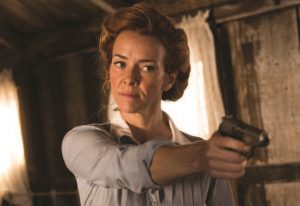
NBC/MiddKid Productions
EDGE: Was Emma’s story arc laid out for you, or did it unfold script by script?
AW: It was one hundred percent script-by-script.
EDGE: So, as an actor, how do you dig in and understand her purpose and motivation?
AW: It was very tricky. Especially in her first episode. It wasn’t even revealed to me at that point that she was a mole or a bad guy or with Rittenhouse or any of that. Looking back, I think fans saw little smirks and things that they read into her, but at the time, I had no idea how the plot would twist at the end of the season. I knew there were secrets that she had, for sure, but I didn’t know exactly how big they were. A lot of actors write journals and go really in-depth into backstories so they can flesh out a character in their mind. But that’s hard for me in television, because if I make up this whole story and the script comes for the next episode and it contradicts what I made up in my head, that just complicates things for me. So unless I have a really big, serious question—something that doesn’t make sense to me in the episode—I tend to go with what I have on the page from the writers and try to give the characters some humanity and vulnerability and go from there.
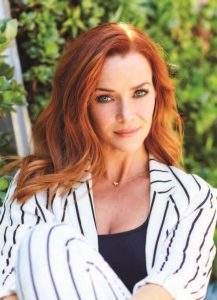
Photo by Jonathan Weiner
EDGE: You had worked with Goran Visnjic before Timeless.
AW: Yes. He played Garcia Flynn in the series. We had done the Halle Berry series Extant together. Goran and I already had a nice rapport, which was good because Emma and Flynn had a fun little chemistry. I hadn’t worked with any of the other cast members, but I had seen Abby [Abigail Spencer] in Rectify. It was fascinating to watch her work. Everybody works differently. Some people have everything planned out when they come in. She would come in and have a lot of questions. But when they said Action, she was just so one hundred percent present and could tap into different emotions so amazingly. It was just so cool to watch her work. I would forget my lines just watching her in awe.
EDGE: On 24, you played Renee Walker, more of a good guy role, at least on the surface. Do you have more fun playing good guys or bad guys?
AW: I absolutely adored playing Renee. Any character that has a switch or change is fun to play. Renee was a good guy, essentially, and Emma was essentially a bad guy. But Renee started as a rules-follower then slowly but surely went over to the dark side after spending some time with Jack Bauer. Emma was very committed to the rules she was going to follow. She spent all those years back in the past to prove herself to Rittenhouse. So both were very committed.
EDGE: How much Annie Wersching was there in Renee Walker?
AW: There is a little bit of me in every character I play. As far as her being a bad-ass, I really enjoyed playing that portion of Renee. I also loved fleshing out her physical aspect. I was a dancer growing up.
EDGE: Did her use of torture bother you or make you squeamish?
AW: Oh, no. I was like, Yes! Not that I agree with torture, but I like anything that makes the audience go Holy crap! That’s always fun to play. And again, it was something that deviated from what she had always been like. It was super fun.
EDGE: Is it an advantage or a disadvantage of joining an established series like 24, which was already six seasons in?
AW: A bit of both. It’s nice to go into a show that’s already a well-oiled machine. I came on in Season Seven, and there had been some negative stuff said about Season Six, so there was a lot to prove. In terms of someone who had to go toe-to-toe with Jack, who had a lot of fans in the audience, that’s always a risky thing. But as soon as I saw how they were writing Renee and the fan response to her, I couldn’t have been more excited. Especially when she started to kind of become the female Jack Bauer. That was huge in terms of winning people over.
EDGE: Did they let you know from the start that you would become a love interest for Kiefer Sutherland’s character?
AW: I didn’t really know that. They wanted Renee and Jack to go toe-to-toe, professionally. Of course, they wanted there to be sparks. Actually, the second I learned about them finally getting together, my first thought was Oh. No. That’s the end of her.
EDGE: Any feelings about Russian meddling?
AW: Oh, I know! I spent all that time undercover with the Russians in that second season! When I’d see that stuff in the script, I’d say, No, that’s too much. This isn’t believable. No way. Let’s stick to real life. Cut to ten years later, and it’s…real life. Terrifying!
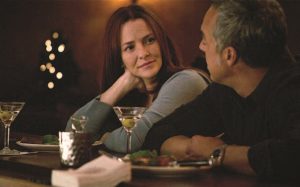
Amazon Video
EDGE: In the Amazon series Bosch, you played against Titus Welliver. His character, Harry, was also very dark— like Flynn and Bauer. Does that rub off on you after a while?
AW: Definitely. But in Bosch, my character was such a newbie, always messing up. The two of them together— the hardened professional veteran with this rookie—I thought it was a cool dichotomy. I love Titus. We got along fine. We had a really good time.
EDGE: Which male lead has brought out the best in you?
AW: I’ve been really lucky in that department. I played against Kiefer so long I learned a tremendous amount from him. Titus is definitely up there. And I really loved working with Goran in two different shows as two different sets of characters. I feel I’m good at observing and absorbing the good things from these dynamics. I’m a bit of a sponge.
EDGE: You mentioned dancing. Was that how you got your start as a performer?
AW: It was. In fourth grade, I started doing plays and musicals in school and continued into junior high school and high school and then into college. I don’t recall a moment where I thought, This is what I have to do! It was just kind of what I did. But yes, I started with dance. Tap, jazz, ballet, and Irish dancing—which I think was where I had my first experience in terms of stage presence. In the Irish dancing community at that time, everybody was very, very serious. No one ever smiled. It was very rigid. Nowadays, it’s happier, and there is more of an entertaining factor to it. But back then, I was literally known as “The girl that smiles.” If you go back and look at stories from my competitions, they would always mention that. From a competitive standpoint, I have a lot from that experience, in terms of finding a way to stand out. That really helped when I transitioned into plays and musicals.
EDGE: What were your plans after college?
AW: I was a musical theater major, and I’d always planned to go to New York. I went to Chicago briefly after school and ended up touring with a musical that closed in Los Angeles. So I thought, Let me check this L.A. thing out. One of the first things I witnessed was, as a member of a live audience, a taping of Stark Raving Mad, the sitcom with Neil Patrick Harris and Tony Shalhoub. I thought, This is the best of both worlds—they are performing like it’s theater with the audience interaction, but you are on TV—this is the dream. I never went to New York. I returned to Chicago, packed up my stuff, and moved to L.A.
EDGE: What were you doing to develop your skills in your 20s?
AW: Gosh, I was doing it all. Early on, I did a couple of musicals at the Pasadena Playhouse. I was doing commercials. I did extra work. I didn’t take many classes—probably because I didn’t have any money. I booked a pretty good guest star on Star Trek Enterprise. That was fascinating. I remember learning a lot from that group. Then I slowly started booking co-stars with a couple of lines, and then guest stars, then the “recurs”— it’s like this ladder you have to climb. Once I became more of a woman as opposed to a girl, I think it matched up more with how I carry myself, and also my voice. Things changed when I started auditioning for the woman in the show and not the chipper girl in the show. It meshed better with my personality…although I am pretty chipper.
EDGE: After all these years working in television, are you ever tempted to get back on the stage in a play or a musical?
AW: Oh, yeah! I’ve been thinking about it for years, but it’s hard to time it with the television world. It would have to be in the hiatus from whatever show I’m on. But I’d absolutely love that.
EDGE: Did you model yourself after a particular actress when you were younger?
AW: No, not really. Growing up, the posters on my wall were Marilyn Monroe and [laughs] Brad Pitt. Not that I wanted to be like Marilyn, but I was obsessed with her transformation from Norma Jean. Also, I always loved Michelle Pfeiffer and Julianne Moore and Diane Lane. Women who were women, who had a lot of gravitas in their roles.
EDGE: On your résumé is a stint on the daytime drama General Hospital. I am friendly with actors who tell wild stories about knocking those shows out day after day.
AW: I was on General Hospital for about five months, and it was totally insane. I had never done anything like it. It was incredibly exciting. Also, it was the first time my mom and the people back home could see me on TV every day of the week. It was definitely a big deal for me. I left t h e show for a couple of weeks to shoot the pilot for 24, which was my first big pilot booking. Darby Stanchfield played my role for those two weeks, and then I came back. At that point, they were interested in signing me to a four-year contract. I was wavering on whether or not to sign for a long time. It’s a commitment. I think we shot fifty pages a day. On 24 or Runaways or Timeless, we might shoot six to eight pages of dialogue a day. It was intense. I mean, unless you’re falling down bleeding, they’ re moving on—just get the words out and go to the next scene. It was great training, and it forces you to make a choice because you don’t have another take to try something different. You have to really know what your character wants s and what you want to accomplish in that scene. It helped me become more concise and also I learned pretty quickly that I was good at the memorization part of it. It was a lot of work…I don’t think the regulars who are on the show get anywhere near the credit they deserve.
EDGE: You are expecting your third child at the same time you are shooting Season Two of Runaways. Is this the first time you’ve been in this situation? Are you at the point where they need to start hiding you behind things?
AW: I think we’re just about to hit that part…and yes, it’s a first for me. I wouldn’t say that it’s been fun. At the very beginning, I was actually terrified to tell them—Oh, God I’m going to ruin the show, Leslie is going to be chubby this season—there are so many aspects of that, just from a vanity standpoint. There are so many things that go through your head. My character wears all white and, in the beginning, I was having morning sickness like crazy, so I was dealing with that. But it’s fine.
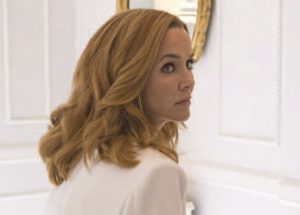
HULU/ABC Signature Studios
EDGE: You and your husband [actor Stephen Full] are raising a family while working full-time in the business. How do you pull that off?
AW: It’s not super easy, but it’s certainly nice that we both“ get it. ” We both understand what it’s like to be in the midst of a crazy shoot. We’ve been incredibly lucky that our careers have balanced each other in amazing ways. The couple of times we were both series regulars we didn’t have kids yet, so we were living the dream. Now, like, tomorrow, both of us are filming and for the life of me, I cannot find a babysitter. So I’m like, Okay I guess my son will just have to come to the trailer with me. I feel like we’re always scrambling to figure it out. But I think we’re doing a good job keeping things normal for them. We’re Both pretty grounded.
EDGE: What presents the biggest challenge?
AW: We’ve been lucky in not having to work out of town too long. That’s where it becomes really hard when you’re on location. The Vampire Diaries shot in Atlanta and I was gone quite a bit for that. I had the little one with me, but I missed my older boy’s first day of kindergarten. You know, stuff that’s never going to happen again. It’s inevitable that you’re going to miss some of those moments. That’s rough. Timeless shot in Vancouver, but at least that was in the same timezone as California, so you can talk to your kid before bedtime. Sometimes it’s these little things that make a big difference.
Editor’s Note: Annie Wershing’s third child was due as this issue went to press. Although NBC canceled Timeless after Season Two, the network shot a two-hour “wrap-up” TV movie, which it plans to air in December.
In a few years, Meg Donnelly will look back on the early months of 2020 and wonder how she did it. Donnelly is currently filming Season 4 of the ABC sitcom American Housewife, opening Disney’s Zombies II on Valentine’s Day, and will be touring this March in support of Trust, the well-received album she dropped last December. It’s great to be 19, right? Donnelly got the musical comedy bug as a grade-schooler in New Jersey, and then fell in love with Broadway after her family moved to New York. She’s been singing, acting and dancing professionally since her ’tween years and at this point you’ve probably seen or heard her a hundred times without even knowing it. Start paying attention… Donnelly is not just a natural talent, she is a force of nature. EDGE editor Mark Stewart caught Donnelly before she revved up her day in L.A.
EDGE: At what point did your professional training begin?
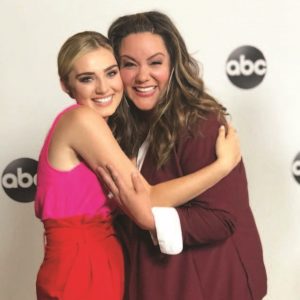
ABC Studios
MD: I went to a school called Annie’s Playhouse in Far Hills starting when I was five or six. Originally I went there to do shows for fun, because I was bad at sports and had to find something to do after school. I would go there, like, every night and watch all the older kids in class. That’s where I fell in love with performing. I just couldn’t see myself doing anything else, musical theater is so big in the NewYork– New Jersey area, so it was really cool to get into that. I was born in New York City and then my family moved to New Jersey, then moved back to the city when I was growing up. But I spent a lot of time in Jersey all the time, because of so many family members living there—in Hunterdon County, Somerset County and Morris County—all over the place. It was fun to visit them and visit old friends, too. I love New Jersey. It’s the best.
EDGE: Did your parents take you to a lot of Broadway shows?
MD: I loved going to Broadway shows. In New York, I attended the Performing Children’s School. PCS was really fun. I was a huge theater kid. My favorite musical still is Rent. I saw it on Broadway the first time when I was five. I had no idea what was going on and I fell asleep at the end. Growing up, I would watch the movie every single day—long before I even grasped the concept of what it was about. I loved it.
EDGE: From what I’ve seen, you’d be very much in your element in a Broadway musical. I hope that’s on your radar.
MD: Oh, yeah. For sure. I would like to do theater. Acting is so amazing and singing is so amazing, so I’d love to combine all three.
EDGE: You started shooting the fourth season of American Housewife in January, playingTaylor Otto, the family’s teenage daughter. How has that role evolved?
MD: In the first season, Taylor was an athlete playing three sports. I love watching sports so much…I just cannot play them. It was a challenge and it was fun— no matter what Taylor is or does, I love playing her—but I am so thankful that the writers threw in that she broke her ankle and couldn’t play anymore. She had to find a new activity and turned to theater. That was really cool. [laughs] I think Taylor has become a very relatable character for teenage girls everywhere and to parents, as well. She is a combination of all the writers’ teenage daughters, if that makes sense, so there are many situations with her mom and the things she says where parents who watch American Housewife say, “Oh… Yup…”
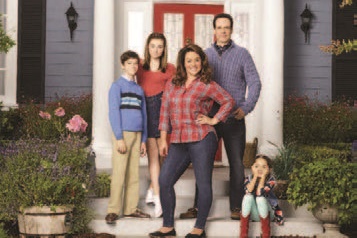
ABC Studios
EDGE: How do your experiences as teenagers differ?
MD: Taylor navigates through life a little more than I do. She’s in high school and about to go to college. Me, I was 11 and out of school auditioning. I didn’t have a normal life. So it’s hard to relate. But as teenagers and daughters, we have a lot of similarities, too.
EDGE: There are a lot of funny people on your show. Who cracks you up the easiest?
MD: I honestly would say Daniel [DiMaggio] who plays my younger brother, Oliver. Diedrich [Bader] and Katy [Mixon] are constantly making jokes and they are so funny. Also, obviously Ali Wong. Her improvs are so funny. I don’t have that many scenes with her because she’s usually doing the “second breakfast” with Katy. I always talk with Ali outside of work. You know, it’s crazy how nice everybody is. You hear these horror stories in Hollywood and we’re, like, nothing of the sort. I pinch myself every day. And it’s not just the cast. The entire crew is like family. We know each other like the back of our hands because it’s been the same crew going on four years.
EDGE: There are never any guarantees that a network series will be picked up, of course. During your first season, did everyone feel like the show was going to make it?
MD: We did 13 episodes our first season and were hoping for more. I asked Diedrich, because he’s been around the block in this business and he’s like my second dad. He said, “There’s literally nothing you can do.You just have to wait it out.” Everyone was so happy when they announced we would get a full season. You pay attention to the ratings and all that, but in this day and age, you never know.
EDGE: In the Zombies films you’ve made for Disney, was that your first time playing the romantic lead?
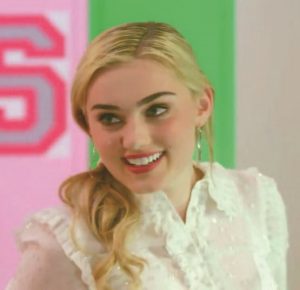
Disney Canada
MD: In American Housewife, Taylor has boyfriends and stuff, but that’s not the equivalent. In Zombies that was the first time it was super-heavy romantic. It was so much fun, though, because Milo Manheim [who plays Zed, her zombie boyfriend] and I are, like, best friends. Especially doing the second movie, it’s so easy to go into a scene where we know exactly what we’re doing. The scenes are challenging, but the chemistry of romance is so natural now.
EDGE: Did you know Milo before Zombies?
MD: No. We met during the audition process. But we instantly trusted each other. It was the weirdest feeling. That’s why it ended up working out—we just had this connection, I don’t know how to describe it.
EDGE: How did the audition work?
MD: The process was interesting. First, you come in for the role. So there were three auditions of me going for [the lead role of] Addison. Then it was a chemistry read, where they’d pair you up with different guys. All the Zeds and Addisons would go in and they’d check the height and the look and see what was happening between the actors. Milo and I were paired up with different people at the beginning and it wasn’t until the end of the day that they put us together. When we were in the room, I don’t know what happened. Something clicked. Everyone kind of saw it and Milo and I saw it, too. We were just so comfortable and laughing at the same time. It was cool. So for the rest of the process they only paired us up, so we were a team. Once that happened, it was like, Which team will get it? It’s funny. In the final audition they asked if we could sing a duet. And I was like, ummmm… I started freaking out. But Milo being Milo, he said, “Give us two minutes.”
EDGE: And what happened?
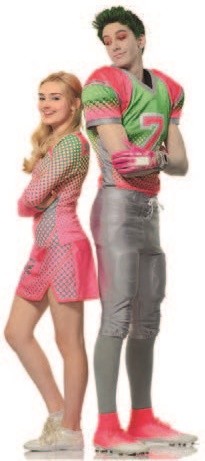
Disney Canada
MD: We went outside the room and I asked, “What is your idea?” He said, “I don’t have an idea! I just started saying stuff!” We quickly decided we’d sing “Love Is an Open Door” from Frozen and, in two minutes, we got the harmonies down and made up some choreography. We went back in shaking—we were so nervous—but we just went for it.
EDGE: Addison is a cheerleader in Zombies. You mentioned that sports isn’t really your thing. Did you have to go through a lot training to play a cheerleader convincingly?
MD: It was cool because when I was little I had taken gymnastics. It started to come back, especially the tumbling stuff. But, yeah, there were four weeks of rehearsal and then six to seven weeks of shooting. So during rehearsal we had intense cheer training. We filmed in Toronto, so all these cheer teams from Canada would come in and teach us how to keep your elbows together when you clap, the proper way to position your arms and legs, it was really intense. But so much fun.
EDGE: You began making a splash as a recording artist in 2018. Now you have the album Trust, which came out near the end of 2019. How did that part of your life evolve?
MD: My whole life I’ve been writing down song lyrics and have always had melodies in my head. I didn’t know how the whole recording and producing part of the business worked, but it was always something I’d wanted to do. On the first Zombies movie, Ali D Theodore, the producer of the song “BAMM”—we actually went to the same high school, PCS in New York—said, “I really want you to come by my studio if you’re home.” A year later I was in New York, dropped by the studio, and it just kind of clicked. I started making music and that was that. He helped me navigate through the music world and I couldn’t be more grateful. My life has changed a lot since then—music is very therapeutic for me and it has always been such a big part of my life. Now I finally get to do another thing that I love.
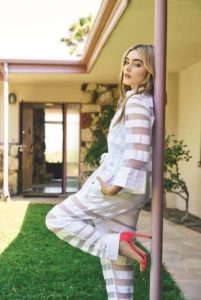 EDGE: Is there an entertainer you look at now and think, Yeah, she did it the right way—not an idol so much as an inspiration?
EDGE: Is there an entertainer you look at now and think, Yeah, she did it the right way—not an idol so much as an inspiration?
MD: I feel like Zendaya is such a good model. She gracefully and gradually went out of the Disney world and is doing stuff she loves. She’s on [the HBO series] Euphoria and she came out with music that’s really good. I feel like everything she does is poised and elegant, but you can tell she also has fun and is very authentic. She balances all of those qualities very well.
EDGE: At some point down the road, achieving that kind of balance might mean making decisions about pursuing dramatic roles or acting in comedies, or chasing a singing career. Are you thinking about those choices yet?
MD: Honestly, I’m down for anything. [laughs] I’m seeing where things take me, playing it by ear, staying ready for whatever comes my way. I do tend to overthink and plan out my whole schedule, but in this business you have no idea what’s going to happen. I could get a call tomorrow to be on a flight to Seattle and I’d be, Okay, great. Right now, I’m just grateful for every opportunity and excited for the future.
At only 10 years old, Alexa Swinton has become the talk of the 2019–20 TV season. You’ve seen her in Showtime’s Billions and on The Tonight Show and Saturday Night Live, but she has earned her first starring role in the ABC sci-fi drama Emergence. Alexa more than holds her own with screen veterans Allison (Fargo) Tolman, Clarence (Shawshank Redemption) Brown and Donald (Scrubs) Faison. A longtime (relatively speaking) New Jersey resident, she shot the first season of Emergence right here in the Garden State. Veteran EDGE interviewer Gerry Strauss found her to be full of surprises.
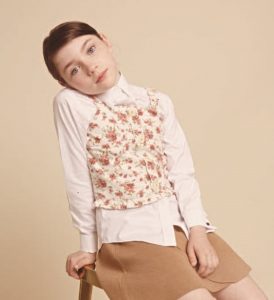
Photographer: Emily Assiran • Hair & Make-up: Evy Drew • Stylist: Jenn Rosado
EDGE: Is this the first you’ve heard of Edge Magazine?
AS: It’s really funny because I’m actually in love with this magazine. I’ve been going to this place called Karma Organics Spa in Ridgewood since I can remember. They have Edge Magazine there, so that’s what I’ve grown up reading.
EDGE: When you first started preparing for your role in Emergence, how did they describe the character of Piper to you?
AS: Oh, wow. They described Piper as this mysterious girl who’s sweet and doesn’t remember anything about herself. I was very intrigued by just that.
EDGE: You handle this role impressively. Do you think you would have been comfortable working on a show this terrifying a year or two ago?
AS: I feel like I could’ve definitely handled it because I would’ve worked just as hard. It would’ve been a tiny bit harder for me, but obviously I would’ve still enjoyed it and still worked on it.
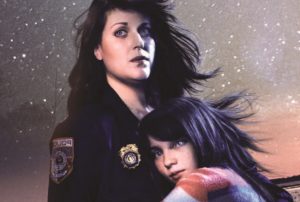
ABC Studios; Swinton with co-star Allison Tomlin
EDGE: Before you started working on the show, did you know anything about co-star Allison Tolman?
AS: I’d heard of Good Girls actually, because my class watched it, and they were like, “Oh my God! Isn’t that the person who played that evil character on it?” And I was like, “I don’t know.” Then I realized that it was, and I was like “Oh God, you guys talk about her all the time.”
EDGE: Has she given you any advice, or helped you? Are you friendly behind the scenes?
AS: Yes, it’s a close family, it’s a really great set family. I feel like we really lucked out, because some sets don’t love each other the way I feel like our relationship is. Allison always says be nice to the crew, because you are one of them and they are one of you. She’s just the best and nicest person you’ll ever meet.
EDGE: Who would you say is the funniest person that you have acted with so far?
AS: My mom! She’s an actress, writer and stand-up comedian and we are collaborating now on a film based on her immigration at age 9 from the Soviet Union to New Jersey in the 80’s. I play my mom. We are also working on a book series about a fourth-grader named Skylie—based on me and my siblings and friends—who lives in New Jersey. So all New Jersey-focused projects.
EDGE: What about on Emergence? In this family that you work with, who’s the comedian there?
AS: I think that they’re all really funny, I feel like role- wise though, I think that Clancy Brown takes it, only because his role has been the funniest. But I feel Donald Faison comes in second for Murray on Clueless, and Turk on Scrubs. And then, Allison comes third because I’ve not watched Downward Dog, the only comedy she’s done that I’ve heard of.
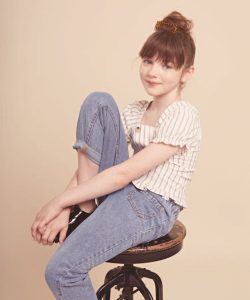
Photographer: Emily Assiran • Hair & Make-up: Evy Drew • Stylist: Jenn Rosado
EDGE: If you could do a voice for a character on TV, which show would you like to be on?
AS: SpongeBob. If there’s ever a recreation of it, I’d definitely love to be a SpongeBob character. I feel like Sandy would definitely be number one on my list. I would also love to be in The Good Place. It’s the best show ever. It’s really funny, and I just think that I’d love to be on there.
EDGE: Do you have any actors who you hope you will get to meet and work with someday?
AS: I definitely really want to work with the whole cast of Friends. They’re really just amazing people, and I feel like they really have done so much work that I really feel is great. But I’d also love to work with Jerry Seinfeld. He’s really funny.
EDGE: What’s the best movie that you’ve seen in the last year or so?
AS: Ready Player One. It was the best movie ever I think because it really shows the way that the world could be, everyone addicted to this one thing.
EDGE: What are some of your favorite things to do when you aren’t working?
AS: I love the malls, especially Garden State Plaza, which is like a whole city. We love the movie theater and the shoes at Nordstrom during their sale. I also love bicycling in the bike path along Saddle River Park, from Paramus to Glen Rock to Ridgewood.
EDGE: Are you more of a New Yorker or a Jersey Girl?
AS: I was born in New York and do have a special love for it, as well. I mean I have been auditioning in the city since I was three, and I have many favorite places and neighborhoods there. But I am proudly a Jersey Girl!
EDGE Editor’s Note: Emergence scored a 93 among TV critics on the Rotten Tomatoes web site, with reviewers noting parallels with Stranger Things and Lost, and Alexa’s performance in a difficult role drawing comparisons to Millie Bobby Brown.
Hollywood defines the power couple in many different ways. Nicole Ari Parker and Boris Kodjoe are busy redefining it. Busy is the operative word here. Both are starring in network TV series—Boris on ABC’s Station 19 and Nicole on the FOX mega-hit Empire—and raising two young children, one of whom was born with spina bifida. Boris and Nicole met on the Showtime series Soul Food and their partnership has blossomed along with their respective careers. As Gerry Strauss discovered, they have carried their rooted principles with them through marriage, parenthood and personal projects that are designed to spread love and awareness out into the world, including a family fitness app (see page 40) and the Full Circle Festival—an event hosted by Boris that honors and celebrates their ancestry, heritage, and generational legacy. Their family life is filled with ups, downs and the desire to find joy in all of it together.
EDGE: Boris, when you were a rising star in tennis at Virginia Commonwealth, were you already thinking about a career beyond the sport?
BK: No. While I was playing, I was completely committed to tennis, and that was my ambition, my dream, my purpose, everything. When that was cut short [due to injury], I came to the states to study and take my mind off of tennis for a little bit, and it progressed into getting my degree, and then moving to New York and being discovered for modeling. While I was modeling, I took acting classes to see if I could improve my English, because I had an accent. Throughout that process, being in acting class is when I fell in love with the craft.
EDGE: Nicole, when did you discover your passion for performing?
NP: I came at this fully open arms twirling, loving the theater, fully committed to being an actress from the very beginning. I graduated at 17 from a high school in Baltimore, and got into NYU early. Second semester, I switched over to the NYU Tisch School of the Arts. I was a Journalism and English major, and I called home, and I asked my dad if I could go to Tisch. NYU was really expensive, and he said, “You just have to promise me that when you get knocked down, you’ll get back up and I’ll support you. Don’t give up and I’ll support you, because it’s going to be a tough road.” I did it and I switched over to the full theater program, and stayed in New York for 13 years. I got my big TV break with Soul Food in 2000.
EDGE: You both had busy, thriving careers before getting married and starting your family. As your lives together have evolved, how has that changed the way you prioritize your career compared to other parts of your life?
BK: I think you just answered the question (laughs).
NP: Soul Food was my big break, and it was kind of his, as well. We’re in this wonderful new exciting moment in our careers coming at it from different places, and our friendship developed, and then our relationship developed, and then we got married and then we had kids. We progressed together. We actually do well working together—the beginning of our relationship was learning how to be together 14 hours a day. We really knew how to be around each other for long periods of time, and we had a nice rhythm in terms of managing our creative time, our personal time, our professional time.
EDGE: And kids…
NP: Kids change everything. For anybody. No matter what you’re doing, no matter what business you’re in, kids change everything. You have to come together and be on the same page about how you want to do this: Do you want them to be the priority? Do you want them to be part of our plan? We just agreed to make them the priority and everything wonderfully fell into place. We didn’t sleep the first year, like any parent, and we still worry like any parent. But we really work together. The one thing we agree on is how we want to raise the kids.
BK: We learned together how to make our children our priority, and that made everything else fall into place automatically.
EDGE: The theme of this issue is Teachable Moments. How tuned in are you to that aspect of parenting?
BK: I think there are teachable moments every single day. There’s teachable moments in terms of taking in your kids and balancing structure and trust. I think there’s teachable moments in our relationship, how we relate to each other, communicate, take each other in.
I’ve certainly learned a lot about my behavior and how it comes across because sometimes we think we’re communicating effectively, but your partner lets you know that it might not be as effective as you think. There’s learning each other’s dance steps, and it’s literally every single day that you learn something new and that you have a teachable moment. I think the key is to give each other the space and the freedom to learn, as well as to teach. A lot of people are shut off from learning new things or being open to receiving input, and I think as long as you’re open and willing to learn—to make mistakes and give each other that privilege, as well—it’s a good thing.
NP: There are opportunities every day, but there are a lot of things that are different about the way my kids are growing up than the way that I grew up. I am very conscious of some of the values that I want my kids to have, even with all of the access that they have, and the travel, and the exposure. We both are very conscious of them still having life skills. As Boris said, those present themselves all the time—like conflicts with people, taking care of your responsibilities, time management. Really, we don’t let that stuff fly because you can’t. Your kids are being saturated with so much stuff 24 hours a day that we really check-in and make sure they have, like, basic self-awareness, and know how to take care of themselves and how to take care of their responsibilities, things like making their beds and folding their clothes—Sophie even knows how to cook. I just think that there’s something wonderful inside of those things that every kid should have, just to survive and feel good about themselves when
they’re out in the world and not with you anymore. In terms of each other, it’s just hard traveling so much and working so much that we, again, both agree that we have to check-in and make sure we’re still having fun, and that we’re not just roommates and business partners.
BK: Part of teachable moments when you’re talking about our kids is exposing them to different cultures. With the Full Circle Festival, we have made it our goal to invite people to experience Ghana’s vibrant culture and connect with their ancestry because this happens to be the Year of Return 2019, which commemorates 400 years since the beginning of the slave trade. Taking our kids there along with other friends and family was a really important way for us to expose our children to history, to culture, to their ancestry, and doing it in a celebratory way.
EDGE: How do you explain your celebrity status to your kids?
NP: One time, I was doing a play in New York during the summer, and we put them in a camp. It was a camp at the Y, and as soon as we walked in, not even realizing we dropped them off, all the kids were like, “Oh, my God!” They knew Boris from the Resident Evil movies, and they were very excited. Our kids hadn’t really experienced that before. We were, like, “Uh-oh. Teachable moment. Too late!” [laughs]. Sophie and Nicolas were just frozen. We talked to the counselors and everybody calmed down and they had their day. I asked Sophie later, “How did it go at camp?” She said, “Well, I told them that my parents were just regular people like their parents and what they do is just a job, just their work.” She had this kind of understanding for herself that kept her calm, and so it just calmed everyone around her. She’s like, “It’s just the job they do. Just their job.” I felt like that was the age-appropriate understanding. Then, as they get older and become self-aware and they’re in the photographs now, we just make sure they’re okay. Just make sure that they’re not being overexposed and self-conscious. I think we’ve worked on that in a way that they know when they’ve had enough. They don’t need to be on the red carpet. They’ll go ahead of us. They’ll run and see their friends if they go to an event. They don’t need to be in it.
BK: When they were smaller, we were driving downtown and there was this huge, gigantic advertising for one of my shows, and Nicolas screamed and said, “Daddy, daddy, look. They got your picture. How did they get your picture?” Then, Sophie, who was at the time maybe four, leaned over to him and said, “You’re so silly, Nicolas. Mommy gave it to them!” It was all very, very innocent. They had no clue. Then, as time went on, they really were educated more from their friends, because we really kept them sheltered in our community in Manhattan Beach. It’s very family- oriented, very protected. After a while, they figured it out on their own by themselves.
EDGE: What advice would you guys give to parents who are at the onset of facing their own medical challenges with their kids?
BK: The first thing I would say is that you’re not alone. I think that’s the lifesaver. It was for us when we realized that there’s a whole world out there, there’s a whole community out there of parents who were dealing with similar things. That really encourages you to do your research, and to talk to as many people as you can, and to get input and advice. Then, I would encourage them to know that they are the parents of their child, so they know their child better than anybody else—get multiple opinions, always trust their parental instincts and their connection with the child that they have. Children will teach you what they need.
EDGE: Let’s talk about your professional lives a bit. Boris, Station 19 is following an impressive blueprint for success. It’s a spinoff of Grey’s Anatomy and is being produced by Shonda Rhimes.
BK: I’ve been a fan of Shonda Rhimes since the beginning. She’s a trailblazer who has changed the way we watch television. I’ve always wanted to be a part of “Shondaland.” Station 19 wasn’t established. They had just finished the first season, and I guess they were still looking for their place, for their rhythm. It was a good moment for me to join the cast and help them find their path, if you will. I’m excited about it because it’s a great show with a great cast, and I don’t think we’ve even scratched the surface yet in terms of the stories that we want to tell. I’m always an advocate for going deeper, telling multi-dimensional stories and for heightening the stakes, and we have a great opportunity now in this third season to do that.
EDGE: Nicole, you’ve become a major player on Empire, a show that was already a ratings monster. How did you feel about jumping onboard that speeding train?
NP: It was a joy because I have known Terrence Howard for so long, and I was so excited to work with Taraji Henson and Gabby Sidibe and everyone. I just jumped in and I felt like a new girl the first season entering into a family, and then it just took off from there. They made me feel like I was part of the family and it was a really great feeling. It’s tough. It’s a one-hour show. It’s a drama, it’s fast-paced. It’s a big cast. It’s in a different city, but somehow it has this joyous ride, a crazy ride. It’s been good.
EDGE: With both of you starring in full-season network shows, have your respective shooting and media schedules created even more of a juggling act when balancing family life?
BK: I think it’s always a juggling act when you’re talking about being on two network shows, because of the time commitments it requires. Also, Empire films in Chicago, so that comes with its own challenges in terms of traveling back and forth. It’s certainly a blessing, but there’s always a trade-off. I wouldn’t call it a juggling act or balancing. It’s really setting your priorities and not only making sure that the kids don’t pay the price, but that we don’t—because we have to look at each other and say, “Look, we were here first. We have to make sure that we have everything we need from each other.” Which is very important. If that means that we meet in Mexico for two days or if that means that I’m flying to Chicago for a day or three days or whatever that means, we have to be honest and we have to be committed to that.
There’s an App for That
EDGE: Boris, your commitment to fitness has produced KoFit. How did this app concept evolve?
BK: Health and fitness has been a part of my life and my brother’s since we were kids. We’re both athletes. He played professional basketball. The fact is that we are regressing as a society in terms of our health, which is obviously public knowledge. I don’t have to bore you with the stats, but we found that a lot of people complained that the plethora of workouts, fitness advice and nutritional information that’s out there is just super-confusing. It ends up being clutter that’s intimidating for people. It renders them paralyzed. Patrick (right) and I wanted to simplify all things fitness and nutrition. He is a certified nutritionist. He’s a personal trainer and a life coach, and so we came up with the KoFit app as a way for people to start where they are at. They don’t need equipment, they don’t need a gym, they don’t need an advanced degree to understand nutrition. All they need is a space in their house and they can start with as little as five minutes. None of our workouts are longer than 20 minutes. My brother gives great simple tips on food. We run people through mindfulness exercises like meditations and yoga exercises. Patrick’s wife is a certified yoga teacher. We want the whole family involved—we’ve got our kids on the app to communicate the simplicity and how easy it is to introduce some positive habits into your life and make health and fitness part of your lifestyle.
EDGE: KoFit is offering 30-day memberships for free to anyone who signs up. Why was that important to you?
BK: This is building the community. KoFit is a family, and we want to invite families across the world to take part in this movement—to find a way to be healthier, happier and stronger. This is just part of us wanting to invite people to join the family.
The Boris File
Boris Frederic Cecil Tay-Natey Ofuatey-Kodjoe
Born: March 8, 1973 • Vienna, Austria
Boris is the son of a German psychologist and Ghanaian physician, who named him after Russian poet Boris Pasternak. He is fluent in three languages. Groomed to be a pro tennis player, Boris starred for the Virginia Commonwealth University tennis team; his brother Patrick played basketball for VCU. A back injury cut short his career, at which point he pivoted to modeling and acting. His film credits include roles in Love & Basketball, Madea’s Family Reunion, Surrogates, two installments of the Resident Evil franchise, Baggage Claim and the upcoming Nicole & O.J. (scheduled for release in 2020). In addition to Soul Food and Station 19, Boris has appeared in a number of television series, including Boston Public, Second Time Around, Undercovers, Real Husbands of Hollywood (with Nicole), The Last Man on Earth, House of Cards and Grey’s Anatomy.
The Nicole File
Nicole Ari Parker
Born: October 7, 1970 • Baltimore, Maryland
Nicole is the only child of a dentist and healthcare professional. While attending an all-girls prep school she was named Best Actress in a statewide theater competition and went on to join the Washington Ballet Company. She earned a degree in acting from NYU in 1993. In her 20s, Nicole made memorable appearances in a string of critically acclaimed independent films, including The Adventures of Sebastian Cole, 200 Cigarettes and Boogie Nights, which earned her a SAG Award nomination. Her breakthrough TV role came in 2000 on the Showtime series Soul Food. She also earned rave reviews in Remember the Titans and Brown Sugar.
Nicole’s other film credits include Imagine That with Eddie Murphy
and two Martin Lawrence comedies, Blue Streak and Welcome Home Roscoe Jenkins. Among her TV credits are CSI, All of Us, The Deep End, Revolution, Murder In the First, Time After Time, Rosewood and The Romanoffs. Earlier this year, Nicole squared off with Boris on an unforgettable episode of Lip Sync Battle.
If you are someone who believes the apple doesn’t fall far from the tree, then Ever Carradine is your kind of actor. The third generation of accomplished performers in the Carradine line (you know her grandfather, John, her uncles Keith and David, and her father, Robert), Ever is the latest success story in the family business. She is currently a cast member in two hit series on HULU—Marvel’s Runaways and The Handmaid’s Tale—and has turned in memorable performances in numerous films and TV shows. Along the way, Ever has won critical acclaim, as well as the admiration of her peers for the authenticity and creativity she brings to her characters. She’s a true professional, in every sense of the word. Mark Stewart caught up with Ever prior to the Season Three premiere of The Handmaid’s Tale.
EDGE: The theme of this issue is “fish out of water.” It strikes me that, given your family’s history in the business, you might never have felt that way as an actor.
EC: I haven’t. Where I find myself most comfortable, having grown up on film sets, is being in that environment. The transition to making that place my working environment—and not just my family’s—was very easy. That’s kind of half the battle: showing up at the set knowing what everybody’s job is, understanding the workings of a crew…it’s very helpful in doing good work, because then you’re not distracted by trying to catch up with what the heck is going on [laughs]. As far as performing in front of an audience, I don’t know that any actor will ever tell you that they’re totally comfortable with that. I still struggle with public speaking, but I’m very comfortable on a film set. I love it so much. It’s one of my favorite places to be.
EDGE: Have you done much stage work?
EC: My last play was in college. I graduated and then hit the ground running in Los Angeles. I started working in film and television. There have been a couple of opportunities where I’d almost done a play, but the timing wasn’t right or I couldn’t move myself from Los Angeles to New York in a way that financially made sense for me. But it was in college I had a little bit of a lightbulb moment. I was doing a play and thought, “Hey, if I could do this and make a living at it, I would be one of those lucky people who loves going to work every day.”
EDGE: And are you?
EC: As far as kicking my feet up and thinking, “Wow, I really am successful and making a living at this”…I’m an actor, and actors are always concerned about what the next job is going to be, what’s going to happen when one thing ends and who will hire me…that never really goes away. The past couple of years, I find myself on two shows that not only do I love, but I’m proud of the work we’re doing and proud of the stories we’re telling. And they happen to be on opposite schedules, so I shoot Marvel’s Runaways (right) half the year and The Handmaid’s Tale the other half of the year. So I just feel gratitude and am pinching myself because I can’t believe I get to be on these two shows at the same time.
EDGE: I couldn’t help noticing that, in school, you majored in Anthropology. My daughter did, too, and found it to be very helpful in her professional life, which has absolutely nothing to do with anthropology.
EC: Initially, my major was Sociology/Anthropology. And, as your daughter knows, you’re digging deeper into other people’s culture. That is a great starting-off point for fleshing out any character as an actor, to take yourself out of your own shoes and delve into somebody’s else’s reality.
EDGE: Getting into the business with the Carradine family name, was it easier for you or did that set the bar higher?
EC: When I started my career I just wanted to work. I wanted my own experiences on film sets. Coming out of college we all take ourselves pretty seriously, so when I started I saw myself doing dramatic work. But right away I started booking comedies, and it was really confusing me. But I sort of just took the ride. I did a lot of comedies for a lot of years, and then I booked a big drama and that turned things back for me toward the dramatic. Now I feel very comfortable in both worlds.
EDGE: What advice did your family offer?
EC: The advice my family—and all of their friends—have always given me is Save your money. When I was young I was, like, Yeah, whatever. Then as I got older I realized that the reason you save your money is that, in leaner times, you are still able to be in control of your choices. You don’t have to take a job you don’t necessarily want because you need the paycheck. Everyone in my parents’ generation has told me that. Save your money. Save your money. Save your money. Also, my uncle, David Carradine, used to tell me that the only ones who didn’t make it were the ones who quit. So after some dark auditions, some sad auditions, I would always remind myself of that.
EDGE: How did you land the role of Naomi on The Handmaid’s Tale?
EC: I had done a pilot with Bruce Miller, the series creator, and Jenji Kohan and Gus Van Sant, in 2015. It was one of these special pilots that I was certain would be a go, and that we would be on the air forever and ever. And then the pilot didn’t get picked up. But I had an incredible working relationship with Bruce and his wife, Tracy. About a year later, I got the script for The Handmaid’s Tale. I read it and I was floored…and was desperate to be in it. Initially, I read for the role of Rita, the Martha to the Waterfords—and thought I did a great job. Then I didn’t get it. I was heartbroken. I sort of put it out of my head. Months later, I got a call: There’s another role in The Handmaid’s Tale and would I go in and read? It was Naomi. I went in and read. After a long wait—for actors, a long wait is more than ten days—I was told I got it and I was on a plane to Toronto the next day. One of the things I love about that show is that everyone reads for every role, the old-fashioned way. Generally, they don’t offer things—they like to hear the people and look at them say the lines.
EDGE: Is Naomi a bad person?
EC: I don’t think so. Something that is coming up for me more and more, in Season Two and definitely in Season Three, is that these people are all in a misery of their own making. Nobody is really happy in Gilead, but they all created this and now they’re stuck there and have to work with what they have. I am so desperate for the Naomi flashback episode, which sadly does not happen in Season Three but fingers-crossed will happen in Season Four. I would love to get a little glimpse of who she was, pre-Gilead. She is a bit of a busybody and has to get into everything. The core of Naomi is her bravado mixed with her raging insecurity. And rage.
EDGE: You’ve played a number of tricky characters over the years. I’m thinking of the one you played on Shameless over the course of four episodes or so. I thought you were really good in that.
EC: You know the pilot I had done with Jenji Kohan and Bruce Miller? I found out that it hadn’t been picked up right before the Shameless audition came up and, also, I had had a child four weeks earlier. I was such a fan of Shameless and the cast and the directors—and it shoots in Los Angeles, which when you have a newborn makes it all the more appealing—that I really wanted to go in and audition. Well, the character I read for was an overwhelmed, exhausted mother who didn’t feel well, which is sort of how I felt [laughs]. The whole thing was a blur, honesty. I was white-knuckling my way through it because I was exhausted and terrified. I think that translated on screen and made it all the more interesting. You just make sure you show up on set and know your lines backwards and forwards and just hang on, because they are all so good in that cast.
EDGE: The first time people saw you regularly was about 15 years ago on the FX series Lucky, which was nominated for an Emmy. I know the series only lasted a year, but that must have been a fun cast to work with.
EC: Oh, I loved that show. It was so fun to be the girl with all those guys. We had a really, really good time. I think you could tell. Craig Robinson and Billy Gardell together were genius. We would go to Vegas sometimes to shoot exteriors and I would just make sure I got to bed at a reasonable hour. The guys went out all night.
EDGE: After that you played the lead in the cult horror movie Dead & Breakfast. That looked like fun in a different way.
EC: The thing about Dead & Breakfast was that the writer and director, Matt Leutwyle—and Jeffrey Dean Morgan and Erik Paladino and the rest of the cast—we were all on a softball team together. Matt was like, Do you guys want to make a horror movie? So he and Billy Burke wrote this hilarious script and we all went up to Livermore, California for three weeks. I think we shot the entire thing at night and it was just the best time.
EDGE: And you got to kill someone with a chainsaw…
EC: I did. I remember swinging the chainsaw around and thinking, I really hope I don’t decapitate the cameraman [laughs].
EDGE: What roles do you look back on as being among your best?
EC: I feel that way about Lucky, for sure. I really thought it would stay on longer, but it was a little ahead of its time, with the gambling/Vegas theme. I did the first season of Goliath with Billy Bob Thornton. That was a great job. I’d admired him for years so it was a real pinch-me moment to work beside him. They always say don’t meet your heroes, but I admire him now even more.
EDGE: On Marvel’s Runaways you play an evil parent. Explain that for the uninitiated.
EC: You know how they say that every teenager thinks their parents are evil? The premise of Runaways is: What if you found out they actually are? I just found that to be so smart and so fun.
EDGE: Have your children watched it? Your oldest in almost nine now.
EC: They don’t get to watch it. I don’t think I’ve done anything they can watch yet. It’s so sad [laughs]. When my daughter is 10 or 11 she can watch Runaways. She’s getting close.
EDGE: What do you like about Runaways?
EC: I love Josh Schwartz and Stephanie Savage, the show-runners. They are such wonderful leaders. And I love the cast. There are 16 series regulars on that show. Usually when you have that many people you get one or two bad apples. But I have to say, it’s a wonderful working relationship we all have, and we’ve formed friendships that are just getting deeper with every year. I think that translates on screen. You can see that.
EDGE: What’s different now that you’re part of the Marvel Universe?
EC: You know, I didn’t get it until I got the job. Then I was like, Oh my God…I’m in the Marvel Universe! You get a Marvel email! And the way they welcome you to it, it feels very big and exciting. I love it. I framed my pick-up letter on that show.
EDGE: Playing two different parts on two concurrent series, do you think of yourself as a character actor?
EC: I guess that I do. I remember when I was a kid my dad telling me that he was a character actor and I was like, “What’s that mean?” As I’ve grown older, I’ve found that character actors sometimes get the best scenes—the scenes you really remember when the whole thing’s over. It’s a gift and an art unto itself.
EDGE: When you think of your family, what are some of the favorite roles they have played?
EC: I remember as a kid, my dad making me sit down and watch Captains Courageous, and kicking and screaming because I didn’t want to. Twenty minutes in, I was completely riveted. I just loved Captains Courageous. And c’mon, Revenge of the Nerds, are you kidding? [laughs] And my uncle Keith, I was lucky to see him on Broadway as Will Rodgers. He’s good in everything, but he was just so good in that show.
EDGE: We have a Q&A with Timothy Olyphant in this issue. Your uncle co-starred with him as Wild Bill Cody on Deadwood.
EC: He did. And they killed him off almost right away. I think they had some regrets about that down the line.
EDGE: Your father was in a movie with John Wayne.
EC: He was. He was in a movie called The Cowboys. I feel my daughter is just about the right age to see that. She loves horses and I think she’d love it. That’s maybe on our movie-viewing list. I loved that movie as a kid, too.
EDGE: And was there anyone better than your grandfather, John Carradine, in The Grapes of Wrath?
EC: I know, right? I haven’t seen that in forever. We definitely need to up our Friday family movie night game!
When Christie Brinkley first earned the title of “supermodel,” it seemed to encompass anything and everything a fashion icon could ever hope to be. Now it hardly does her justice. The face of CoverGirl for more than two decades, she has expanded her brand across every media platform while retaining her honest, down-to-earth appeal in both her personal and business life. Brinkley was discovered at 19 by a photographer in a post office and went on to appear on more than 500 magazine covers, including three straight Sports Illustrated swimsuit issues. She was the girl in the Ferrari in National Lampoon’s Vacation, played Roxie Hart in the Broadway revival of Chicago, and has stolen the show in countless television appearances. Last November, Brinkley and her daughters, Sailor Moon Brinkley and Alexa Ray Joel, shared the 2018 Footwear News Style Influencer of the Year award—the first time the magazine crowned multigenerational winners. Gerry Strauss caught Christie during a recent photoshoot to talk about a life lived well…and very much in the public eye.
EDGE: Looking back, what do you think has enabled you to enjoy such a long and meaningful career?
CB: You know what? I was very, very lucky. It was just a timing thing. If it had been five years earlier or five years later, then that photographer that spotted me never would have paid attention to me. But it was a moment when things were starting to change and they were looking away from the very skinny, unapproachable hottie-model type and looking more for an athletic, sporty kind of healthy vibe. And I just happened to be a little bit rounder than some models were at that point. What I thought was my weakness actually ended up being my strength. I just lucked out.
EDGE: What’s the key to success in the business today?
CB: When I started out, they were looking for clothes hangers. Now they’re hiring people, personalities and looking for depth. It’s a beautiful trend that I hope is really a movement of inclusivity and recognizing someone for the person. Today, it’s about authenticity and individuality. We’re really embracing a much more expansive idea of what’s beautiful. Authenticity plays a part, and confidence plays a part, and the industry is really looking for people that represent these different areas. It really wants to make a statement of inclusivity and beauty in the individuality of each person. It’s the most beautiful trend that I have seen in my more than 40 years in this industry.
EDGE: How were you able to stand out in your first few years in the business?
CB: You know, I think what helped was the fact that I never really thought of myself as a model. I always considered it a job that I was doing on my way to doing “something else.” I thought of myself as an artist. I actually went to Paris to study art, and I loved drawing and painting and making things, being creative. Modeling was a way to pay my bills—and a great way to see the world. I’m naturally curious. I love trying things out, so I was going to try modeling out. I was making money and I was traveling, but I was always doing other things. I was just being me. But I think it was those others things kept people interested in me.
EDGE: For instance…
CB: Because I was rounder than most models at that moment, I was doing a lot of bathing suit shoots. I found myself on beautiful beaches all over the world. So I wrote a book about fitness and the beach. I also loved taking pictures. I ended up, inadvertently, working for Don King as a boxing photographer, which the media found interesting. And I was always interested in the environment. At one point when Bush and Cheney, two oilmen, were running for office, I decided that I’d like to go to work for Al Gore. I became a delegate from the First Congressional District of New York. I really got into trying to alert people about climate change. Along the way, I managed to make a couple movies and I starred as Roxie Hart in Chicago on Broadway. I think it’s that adventurous streak and that curiosity that that has helped elongate my career as a model.
EDGE: I think people find you relatable, too.
CB: Well, my private life has been not-so-private, and very tumultuous. I’ve been through some pretty low lows, but yes, women, can relate. About 10 years ago, I discovered the Internet and started talking to women about their problems. If a woman said to me, I’m trying to divorce a narcissist, too, I would respond, Here’s what I learned, and here’s how I can help you, and here’s organizations that can help you so you don’t feel like you’re going crazy and you don’t feel alone. Because dealing with a malignant narcissist is very, very difficult. Again, that’s another layer where I can connect with women. They’ll say to me, I feel like I know you, because I’ve been around a long time and they’ve been through things with me and I’ve been through things with them. Even before I got into the Internet, I would give interviews and the stuff that I talked about would be helpful in getting them through some of those tough times.
EDGE: Has your daughter, Sailor, inherited your appetite for variety?
CB: It’s so funny. We’re so alike in that she didn’t have this overwhelming desire to be a model. But she also has the same curiosity and modeling really is very much about, as I said, the individual and highlighting the individual’s authenticity. So you can do well if you know yourself well. Sailor is very in touch with herself. Right now, she’s very passionate about making short films, and she’s working as a photographer and a model. That’s what this industry will do for you now, because it is looking for multidimensional people. Modeling’s a great job because of that. It really is a door-opener. If you’re into coding, like Karlie Kloss, modeling has allowed her to reach out to thousands and thousands of young girls and change their lives by teaching them coding. If you’re into makeup, you can create a beauty company. It really is an extraordinary time of opportunity. I think it’s a great career.
EDGE: You still have to be able to “turn it on” during a photoshoot or runway show. What was your secret?
CB: I’m actually quite a hammy person in real life. As a kid, I subjected my parents to my “shows”—just about every morning, they were awakened with a new performance. I even had tap shoes. Imagine a kid growing up in the ’sixties with wall-to-wall carpeting and tap shoes [laughs], there was no place to tap in the ’sixties; It was really very shag-adelic. But I used to get up on the fireplace mantle and put on a show or pop into their bedroom in the morning and be like, Ta-da! Here comes the show, ladies and gentlemen! Back in the day, when photographers used film instead of this digital stuff, you used to get into a real rhythm with the photographer. It was a real thing. You’d be exchanging ideas and moving from being very sultry to looking like you’re the happiest person in the world—and conveying those moods in imagery. Some people say that’s why a lot of models don’t transition well into movies and TV. They’re too aware of the camera and too aware of playing to the camera, while in acting you have to be aware of it and know where it is—but be able to leave it alone and not relate to it. Also, as you begin to receive notoriety in the modeling world, you start to show up at events and often give a speech or whatever—you get used to speaking in front of audiences. I think that that helped me with doing Chicago because I could face a large audience.
EDGE: Given that you grew up on the West Coast, what’s kept you on the East Coast all these years?
CB: I’ve raised my kids here. It’s their home. Wherever you have your childhood I think is where you think of home. I always think of Malibu as my home because that’s where I made my forts, under those bushes and trees, and roamed in the hills. And you know everything about it. Whenever I go back to California, I love it.
EDGE: What do you love about living in the city?
CB: It’s so hard to put your finger on it. New York City is the most exciting city, and you just get a vibe being here that’s energizing. You never know who you’re going to meet or bump into. And just a two-hour drive away are some of the most beautiful beaches anywhere in the world. You really can get away from it all and feel like you can get to a beach where you’re the only person walking on it and find little pieces of driftwood and seashells. It’s so lovely, that combination. I just really like it here.
EDGE: Would you say that authenticity and enthusiasm are the keys to the success of the Christie Brinkley brand? It seems that the products you’ve put out into the world or supported have always been in line with your philosophy of good eating and good living.
CB: I think that’s the reason I’ve lasted. If I put my name on something, it’s because I truly believe in it and I truly think it’s going to improve your life. My makeup line and my skincare products are cruelty-free and distributed in environmentally sensitive packaging. I always try to follow through and give my products a heart and a conscience. That dedication and belief in my products, and what they’ll do for you, has been a key to the longevity I‘ve enjoyed. If you just endorse any old thing, people are not going to trust you. You have to be truthful and really love what you do and what you’re using—and know that it’s going to make somebody else’s life better. That’s the recipe for success.
EDGE: You’re a big proponent of organics.
CB: I am. I really believe in organics. It is so much better for our bodies and for the power to heal our planet. So my line of Bellissimo Prosecco is 100 percent organic—and also certified vegan.
EDGE: Vegan?
CB: I know. When I first got in the business, I was like, “Do you really need to certify it as vegan? Nobody puts meat in it.” It turns out that many sparkling wines are filtered through animal parts, from fish guts to cow intestines, and you will get traces of animal debris in your wine. I’ve always loved the bubbly, and I was asked if I wanted to participate in creating this company. They came and explained to me that they had found a vineyard in Treviso, Italy—where Prosecco comes from—that was 100 percent organic. So I was very interested. When they poured me a glass and I tasted it, I was like, “Oh my gosh, definitely. It’s amazing.” We’re the fastest-growing Prosecco in America and we’re heading for Asia, New Zealand, and Australia next. There are no additives and we have zero percent sugar, so you can have your Prosecco guilt-free. There is such an epidemic of people with diabetes and pre-diabetes—they should check with their doctor, of course, but I believe that we are a great option for them.
Dominic Chianese has been at this a long, long time. Longer, in fact, than even his most ardent fans probably know. Between playing the pivotal character of Johnny Ola in the first two Godfather movies and his unforgettable performance as Uncle Junior in The Sopranos, Chianese inhabited indelible characters in landmark films such as Dog Day Afternoon, All the President’s Men, And Justice for All, Fort Apache the Bronx and Unfaithful. He has also guest-starred on multiple Law & Orders and landed recurring roles on acclaimed series Boardwalk Empire, Damages and The Good Wife. His Broadway credentials stretch across three decades and include Oliver!, Richard III, Requiem for a Heavyweight and The Rose Tattoo. It was as a stage performer, actually, that Chianese first earned his show business spurs. Mark Stewart talked to Dominic about the craft of acting and his many roles, including that of Enzo on the new NBC ensemble drama The Village, which debuted on NBC March 19.
EDGE: How is film and television acting different from stage acting?
DC: It’s a different method of performance. You don’t use the body. It’s mostly in the face. If it doesn’t come out in the voice and the eyes and the facial expression, you fail.
EDGE: Did your years in the theater help you develop a screen personality?
DC: Yes, but I had to go through The Godfather first, which was my first real movie. I owe a lot to Francis Ford Coppola. That was 1971. It’s important to understand that I’d spent 20 years in the theater before I played Johnny Ola (left). I could never have made him believable without all that time in the theater… and if Francis hadn’t manipulated me when I was talking to Michael Corleone.
EDGE: How so?
DC: I started to “act” in front of the camera and you’re not supposed to do that. You’re just supposed to be the person. There’s a big difference—a different in the voice and a difference in the audience, which is the camera.
The camera does not lie, because the face is going to show everything.
EDGE: There were some impressive actors in The Godfather cast, including Marlon Brando and Al Pacino. Who else stands out among the people you’ve worked with?
DC: Oh, I’ve worked with some great actors. Al Pacino probably taught me the most. George C. Scott—who got me on East Side West/Side, my first TV show, in 1963—John Lithgow, Bobby Duvall, they all taught me something. They knew what the heck they were doing. I learned from a lot of great actors. And also my teachers: Phillip Burton and Wilson Mayer at Brooklyn College, and Walt Witcover, whose class I went to in 1962-63-64. He helped me understand what I was missing.
EDGE: How did you get into acting in the first place?
DC: My first inkling was when I was seven years old. I remember it like it was yesterday. But if you’re asking when I really put my mind to it, I was 20 years old. My voice—my love of music, of singing—is what got me into acting. I was in college, at Champlain College up in Plattsburg, New York. When I was 19, I was asked to join a group of a cappella male singers who were World War II veterans, older guys who were 26, 28, 30, on the GI Bill. They needed a bass so they gave me the job. We traveled to all the Ivy League schools. That is when I knew I was meant to do this. I knew I would definitely be performing the rest of my life. Less than a year later, the Korean conflict was starting and the college was closed down because the government needed a base. I returned to New York City. And as soon as I got off the bus, I went to the Jan Hus Presbyterian Church on East 74th Street and auditioned for Gilbert and Sullivan. I managed to land a chorus job and we toured for one whole year around the country. I was paid $110 a week, which was a fortune back in the ’50s.
EDGE: Did you think you could make a living on the stage?
DC: I spent about 10 years flirting with the idea that maybe this was not for me. The pressure was on to get an education. I ended up in 1961 with a degree from Brooklyn College, but while I was there I had Burton and Mayer, two great teachers who were experienced in the business. They encouraged me to no end. I remember I was cast in Chekov’s Three Sisters and thought I was doing a great job until the last scene. Burton said, “I don’t believe you when you’re saying goodbye to Masha. Maybe you shouldn’t be an actor”—in front of all the other kids [laughs]. Remember, I was 33 years old and had a lot of experience at that time, but I’d been doing mostly comedies and musicals. I think Burton and Wilson were in cahoots. They knew that I had natural ability creating characters and they wanted to get me to really understand the art, the technique.
EDGE: By technique what do you mean?
DC: I read a lot of Stanislavski. He developed The Method [of Physical Action] back in the 1930s. He said you can’t fake emotion. That’s all the method really is. It’s not a miracle cure or a set formula. He said you have to find your own way, really get in touch with something, so that you’re not faking the emotion. The imagination comes out in the voice. Everybody has to struggle a little to find their own technique, their “m-o”—whatever you want to call it. Once you do, you can be a lead actor or a character actor; it makes everything better, including your singing and your comedy. The analogy would be if you’re learning the piano and sit facing the opposite wall with your back to the keyboard, it’s going to be very hard to develop a technique. You have to face the piano, you have to stand a certain way and place your fingers on the keys a certain way, and that makes it easier. Most important is that, whether you’re in theater or in film, whether you’re acting in New York or a small town in Illinois, you’ve got to act the truth. You’ve got to really believe in the character and give it all you’ve got—put your concentration into the character. And then practice, practice, practice.
EDGE: Junior Soprano seemed like a challenging role. He was part manipulative psychopath and part demented old man, and you never knew how much of each you were seeing when you tuned in. Where did you draw your inspiration for that character?
DC: Junior was basically a New York-New Jersey kind of guy, so I drew him from my real life experience. Not as Mafioso [laughs] of course. I’m talking about his way of speaking. Being around so many Italian-Americans my whole life, it was easy to incorporate that into the character. Subconsciously, it was probably my father, my uncle and all the guys around the neighborhood. It was different than playing a farmer from Ohio, if you know what I’m saying…it came naturally to me.
EDGE: Junior was definitely losing it by the end of the series. Was that difficult to play?
DC: I’ve spent a good 30 years going to nursing homes and performing for people, so some came from that experience. But, again, a lot of it came from technique. You know, in order to play drunk in the theater, you have to play sober. You’re trying not to show that you’re drunk. So to play a guy with Alzheimer’s, you have to concentrate on something else, so it looks like you don’t know what you’re doing. I knew that people with Alzheimer’s have a way of not looking you in the eye, and of asking questions and not expecting an answer right back. There’s something missing.
EDGE: Everyone here in New Jersey basically adopted you from that role.
DC: I know [laughs] I know. Especially the people from Belleville!
EDGE: Tell me about your connection to New Jersey beyond the character you played in The Sopranos.
DC: Jersey is where my father did his bricklaying work. We lived in the Bronx but I used to go to Jersey all the time throughout the 1950s. I was always going to Jersey on the bus to lay brick with my father. We’d go to Newark. We’d go to Short Hills. We’d go to Paterson. We’d go to Clifton, where [Sopranos creator] David Chase lived as a little boy. I actually worked on the apartment he lived in, in 1952.
EDGE: Having been part of some legendary ensemble casts. I’m curious. Does your new show, The Village, have a live-theater ensemble feel to it?
DC: I never thought of that but, yeah, that’s definitely true. There is a good, collaborative feeling. The connections are like live theater. The writers are wonderful on this show. I’m very optimistic about The Village. It’s a show about real people, it’s not concentrated on a particular character. I just love the cast and crew on this show, I really do.
EDGE: What do you think the viewers will find most appealing?
DC: I think the fact that the issues are real. There’s a pregnant teenager, a returning veteran, immigration themes, an old man from a nursing home. It’s been very well written and represented here. It’s a show everybody can connect with no matter where you live. It’s about a community, and that’s what I like very much. We’re all in one building in Brooklyn. I grew up that way in the Bronx. We knew everyone from the first floor to the fifth floor. So for me it’s very familiar.
EDGE: Do you see a younger version of yourself when you look around the set?
DC: God no! [laughs] I do see great young actors. It takes me back to when I did my first TV show.
EDGE: So how do you strike a balance between the film and theater technique in this case?
DC: Film is different, but the imagination you use is the same—whether you do theater or film. In this case, the actual performance has to be attuned to the camera as opposed to the live audience. I feel very relaxed with The Village. When you’re relaxed and you’re connecting with your fellow actors, you’re just having a good time.